GIRLS AND THE CITY
September 2020
Le mule di Trieste
ITS: Fashion World Barcolana Experience Shop & Beauty Women of the Carso
N°10


September 2020
Le mule di Trieste
ITS: Fashion World Barcolana Experience Shop & Beauty Women of the Carso
N°10

4 Centri Assistenza Clienti (presso le uscite di Trieste Lisert, Palmanova, Latisana, e Venezia Est) sono un punto privilegiato di contatto con Autovie Venete, dove acquistare i Telepass o le tessere Viacard e risolvere immediatamente i problemi legati ai pagamenti dei pedaggi, alla fatturazione dei transiti.
76 pannelli a messaggio variabile per informare, in tempo reale, sulla situazione della viabilità.
185 colonnine S.O.S. collegate con il Centro Radio Informativo che gestisce e coordina i soccorsi e gli interventi di emergenza su tutta la rete autostradale.
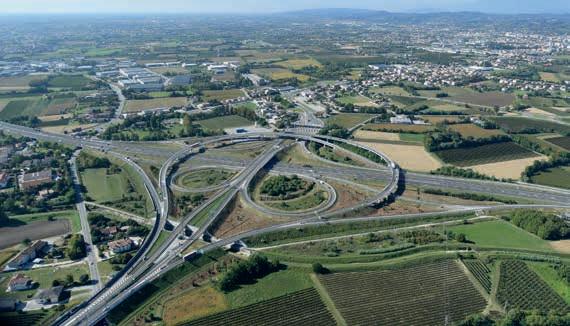
Un team di professionisti, in servizio 24 ore su 24, per garantire la vostra sicurezza.
Numero Verde 800 99 60 99
Scarica la app InfoViaggiando - Percorribilità, webcam, cartografia e servizi
Seguici anche su:
www.infoviaggiando.it
www.quiautovie.autovie.it
Twitter: @InfoViaggiando @AutoviePress
Instagram: spaautovievenete
Facebook: @autovievenete
YouTube: Autovie Venete
direttore responsabile
Giovanni Marzini
progetto editoriale
Prandi Comunicazione & Marketing
coordinamento
Paola De Cassan
segreteria di redazione
Fabiana Parenzan redazione@prandicom.it
hanno collaborato
Micol Brusaferro, Isabella Franco, Nicolò Giraldi, Lorenzo Michelli, Francesca Pitacco, Ilaria Romanzin
con il contributo di Serena Cividin, Francesca Clapcich, Ilaria Felluga, Barbara Franchin, Francesca Fresa, Ariella Reggio, Ottavio Silva, Federica Suban
traduzioni
Rita Pecorari Novak, Eugenia
Dal Fovo, Rebecca Blakey
progetto grafico
Matteo Bartoli – Basiq
impaginazione
Elisa Dudine – Basiq
foto di copertina
Giuliano Koren
fotografie
Paolo Alfieri, Carlo Borlenghi, Paolo Bullo, Ulderica Da Pozzo, Fabrizio Giraldi, Giuliano Koren, Dario Muzzarini, Bianca Navarra, Lara Parentin, Gianni Peteani, Laila Pozzo, Helmuth Rier, Fabio Rinaldi, Luigi Vitale, Daniel Waschnig, Fototeca dei Civici Musei di Storia ed Arte, Archivo Adobe Stock
illustrazione
Jan Sedmak
stampa
Riccigraf
ringraziamenti
Alfonso Di Leva (direttore
IES Magazine dal 2018 al 2019)
La Fototeca dei Civici Musei di Storia ed Arte e il fotografo Marino Ierman per le immagini contenute nel
‘Portfolio– Arte in città’ del numero 9 di IES magazine.
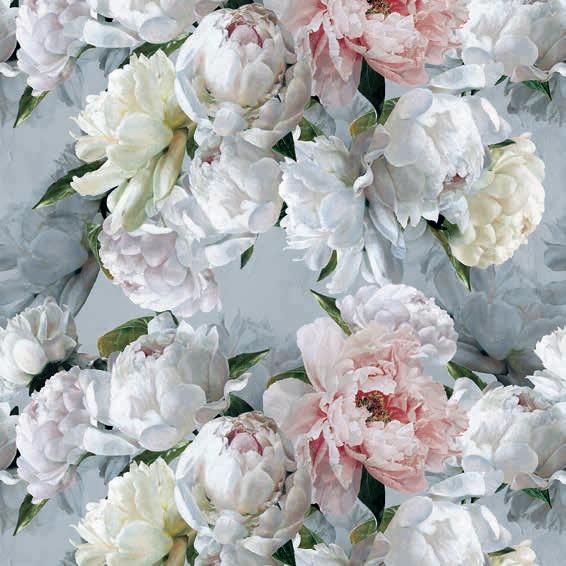
Il numero autunnale di IES, nella stagione che veste Trieste con i suoi colori più affascinanti, vuole essere un omaggio alla bellezza e quindi un tributo alle donne di questa città. Il traguardo del decimo numero del nostro magazine viene tagliato quasi esclusivamente con i volti, i racconti, i consigli e le testimonianze di una Trieste al femminile.
Perché Trieste è una città femmina: bella, a tratti misteriosa, sicuramente intrigante. Forse difficile a concedersi, ma capace di farti innamorare e, se ricambiata, pronta a donarsi con vera passione. Non è un caso, se quella “scontrosa grazia” uscita dalla penna di Umberto Saba, resta ancor oggi il più vero dei ritratti disegnati per questa città. E vale soprattutto per le “sue” donne, descritte negli anni da scrittori e poeti, assurte a simbolo di una modernità a dir poco inusuale nel lontano passato; donne protagoniste di una emancipazione in parte figlia del loro essere, compagne e mogli di marinai spesso lontani da casa. Donne ancor oggi elemento caratterizzante in quest’angolo di mondo che, proprio per combattere la sua apparente marginalità, ha cercato sempre di abbattere ogni tipo di confine: fisico, geografico, ideologico, religioso, culturale.
Saranno dunque soprattutto loro, le donne (triestine e non) attive in questa città a portarci per mano, nell’inedito itinerario che IES ha tracciato per l’autunno triestino, attraverso gli eventi, le rassegne, le mostre ed i tanti appuntamenti che ci accompagneranno sino alla vigilia del Natale. Buona lettura, lasciatevi guidare e, perché no, anche conquistare…
di /by Giovanni MarziniThis autumn issue of IES sees Trieste’s charm in full display, as the city drapes herself in the bright colours of the season. These pages are a tribute to beauty and a celebration of the women of Trieste. As we reach the goal of the 10th issue of our magazine, it is to these women that we want to dedicate our success, giving space to their stories, their faces, and their experiences.
Because Trieste is her: she is beautiful, mysterious at times, yet invariably intriguing. She may deny herself at first, yet there is no heart she cannot conquer, and, when her love is reciprocated, she gives herself passionately. This is the reason why that “surly grace” described by Umberto Saba is still the most faithful portrait ever depicted of Trieste. And, most of all, “her” women: in the words of countless authors and poets throughout the years, they rose to be a symbol of modernity ahead of their time – the driving force of a strive for empowerment that was already latently running through their veins, as women and wives of seafarers spending most of their time away from home. Today that same force characterises the women of this remote corner of the world, perched on the edge of national borders, and therefore so determined to reject the very notion of border of any kind, be it physical, geographic, ideological, religious, or cultural. It is these women, then, who call Trieste their own city, either as birthplace or as elected home, that will guide us, navigating the reader along this latest IES itinerary through Trieste and her autumn season, full of events, shows, exhibits, and much more, all the way to Christmas Eve. Enjoy your reading, let yourself be guided, and, why not, charmed…
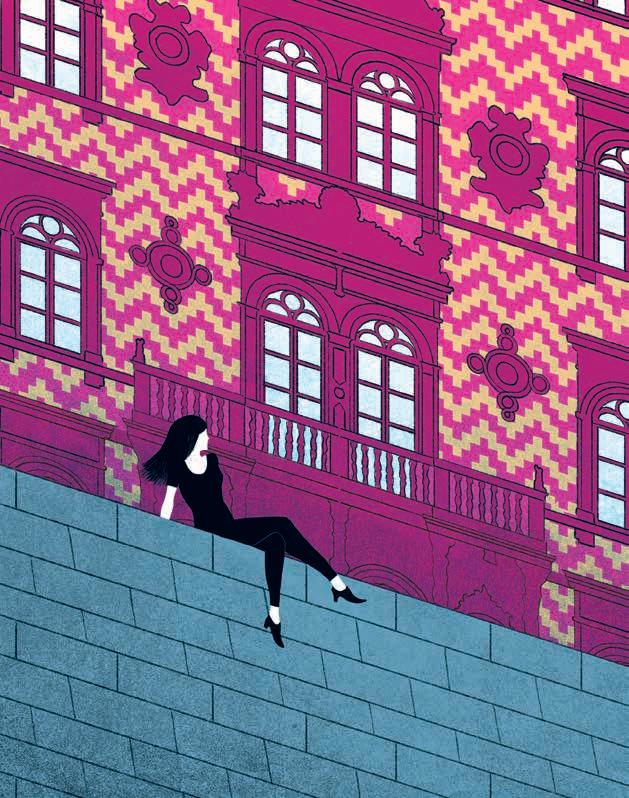 di /by Nicolò Giraldi
di /by Nicolò Giraldi
Trieste è donna. Nell’avventurarsi tra le mille sfaccettature che questa città manifesta a chi vi giunge da lontano, l’urbe al femminile rappresenta un elemento nascosto, eppure quotidianamente presente. Per poterlo vivere, basta muovere i primi passi nel mare della letteratura, di quel dialetto ancora oggi parlato e di quelle immagini simboliche che l’architettura mette in mostra in riva all’Adriatico. Inoltre, proprio nel vernacolo locale esistono espressioni che potrebbero strappare sorrisi o sprigionare un’incerta comprensione, a seconda della confidenza con la lingua.
Le ragazze triestine, infatti, vengono definite “mule” e il termine, per i visitatori, suonerebbe volgare, al limite del rispetto verso il genere. Tuttavia, la parola non avrebbe niente a che vedere con la femmina dell’asino, né con un’affaticata immagine compromessa da un presunto peso da portare sul dorso: “mula” è semplicemente la versione “rosa” del ragazzo triestino che, secondo varie interpretazioni, avrebbe contratto la parola “mamulo”, attestata in Istria e a Grado per indicare i giovani, facendola diventare “mulo”.
Ma Trieste è donna anche per i risvolti sociali che il genere possiede da sempre. L’intraprendente indipendenza ostentata con orgoglio nasce da lontano e non ha quasi niente a che fare con la recente ondata di nobile femminismo: si pensi solamente che, ad esempio, nell’anno 1900 il tasso medio di analfabetismo registrato nella penisola italiana era pari al 43 per cento, mentre a Trieste, all’epoca dominio asburgico, coinvolgeva solamente 14 persone su 100. “Leggere, scrivere e far di conto”, come si soleva dire un tempo, era prerogativa anche e soprattutto femminile.
Le donne triestine, oggi più che mai presenti nei CDA di grandi aziende, in politica, nell’imprenditoria locale e in molti altri settori, sono eredi di una tradizione scolpita da moltissimo tempo.
Se è vero che una certa emancipazione si sviluppa durante la Grande guerra
–periodo durante il quale milioni di uomini partono per il fronte, con le donne costrette a mandare avanti la “baracca”– è altrettanto veritiero che a questo fenomeno va aggiunto il carattere tipicamente marinaro (ed adriatico) della città. “Le mule de San Giacomo le ga el marì che naviga e l’amante sotto ‘l letto” è motivetto dialettale che mette in cattiva luce le mogli dei marittimi triestini. Tuttavia, la canzone dimentica colpevolmente che durante i viaggi per mare, ad amministrare la vita di casa o ad indirizzare l’educazione dei figli, erano proprio le donne. Basterebbe questo, infatti, per testimoniare l’enorme apporto culturale al femminile nei confronti dello sviluppo della città.
Se poi ci addentriamo nei percorsi personali (e storici) ecco che emerge la figura di Maria Teresa, imperatrice d’Austria a cui Trieste deve tanto –nonostante non abbia mai messo piede qui– della sua indimenticata grandeur. Nonostante la città sembri rivolgersi più al suo trapassato remoto che alla contemporaneità, tra il mare ed il Carso vivono e lavorano alcune figure diventate nel tempo ambasciatrici di San Giusto nel mondo. Qualcuno pensa che a Trieste sia più facile diventare intellettuali che imprenditrici (Susanna Tamaro e Giovanna Botteri sono gli esempi forse più celebri di un successo nel mondo della letteratura e del giornalismo), ma sono molte le donne triestine e del Carso che hanno scelto la strada dell’impresa locale. È soprattutto grazie a loro se Trieste e l’altipiano carsico dialogano, se il bianco calcareo si fonde con l’azzurro dell’Adriatico. Ancora una volta, sono le donne a smantellare le frontiere, ad unire le molteplici anime culturali che il confine orientale d’Italia porta in dote.
mula grintosa e audace Trieste, gritty and daring girl
“Leggere, scrivere e far di conto” era prerogativa anche, e soprattutto, femminile.
“Read, write and do sums” was mostly a female prerogative.
Trieste is a woman. It may not be immediately clear to visitors caught in the whirlwind of the city’s multiple facets, yet it is an underlying, omnipresent trait. Starting with words: the written word of the numerous masterpieces of the literature devoted to Trieste, or the spoken word, and, more specifically, the local dialect. The very architecture that constitutes the city offers a plethora of symbolic female images mirrored in the waters of the Adriatic sea. Sometimes, especially when it comes to local vernacular expressions, understanding words and symbols may not be the easiest task.
Trieste’s girls and young women, for instance, are called mule, plural for “mula” [lit. female mule], which could shock first-time visitors for the apparent lack of respect of this expression. Contrary to the most immediate interpretation, however, the term mula has nothing to do with animal associations, nor is it a way of describing women as designated beasts of burden. It is simply the female version of “mulo”, very possibly an abbreviation of the term “mamulo” an expression used to indicate a young man in the neighbouring Istrian peninsula and on the island of Grado.
More than anything, Trieste’s womanly side emerges from her social history. The resourceful independence of local women has its roots in the distant past, and was born long before the recent waves of feminist movements reached these shores: suffice it to mention that the illiteracy rate in 20th century Italy amounted to 43%, while in contemporary Hapsburg Trieste only 14 people out of 100 could not read or write. “Read, write, and do sums”, as it
was called back then, was mostly a female prerogative.
If women of Trieste today make their voice heard in the BoDs of powerful companies, as well as in politics, local businesses, and many other sectors, they owe it to their forebears and the way they have paved long ago. Admittedly, the Great War was an important catalyst of women’s empowerment throughout Europe with the majority of men at the front, and women in charge of the household economy back home, yet Trieste had something more, namely the city’s seafaring tradition. “ Le mule de San Giacomo le ga el marì che naviga e l’amante sotto ‘l letto” [lit. The mule of San Giacomo have a husband at sea and a lover under the bed] is an old dialect roundelay, clearly made up by malicious (male) minds. However catchy, this little tune does not take into account that women had very little time for lovers under their bed, since, with their husbands away, they were in charge of raising their children and managing the family’s finances. In other words, if Trieste survived through so many trying times, it is largely thanks to women and their invaluable contribution to the city’s cultural development.
Focusing now on single individuals, the first prestigious name that comes to mind is Empress Maria Theresa, who never set foot in Trieste, yet is responsible for everything this city holds dear, including Trieste’s unforgotten grandeur. True, this city tends to look backwards rather than forward, mourning her past rather than shaping her future. Yet, in this cradle hanging between Karst and sea, there are women who work hard, both home and abroad, proud ambassadors of San Giusto in the world. There are some who believe that Trieste only gives birth to future female intellectuals, rather than entrepreneurs (Susanna Tamaro and Giovanna Botteri are probably the best known examples thereof, having made a career in the world of literature and journalism, respectively), but the number of women who have successfully created their local businesses between the Karst and the city may surprise you. They are the reason why Trieste and her inland are still connected; it is thanks to them, if the white rocks and blue sea can still rejoice in each others’ embrace. Yet another example of how women demolish all barriers, bringing together multiple cultural traditions that, together, constitute the very soul of Trieste.
“L’intraprendente indipendenza ostentata con orgoglio nasce da lontano.”
“The resourceful independence of local women has its roots in the distant past.”


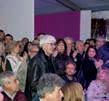

Nell’immaginario collettivo italiano Trieste è legata principalmente alla bora e alle mule . Note per la loro bellezza, l’emancipazione, la cultura, il fascino, le triestine sono da sempre un’icona della città. Spesso ricordate per la loro fisicità –descritte come alte, bionde, sontuose– le donne della Venezia Giulia hanno spesso impressionato per l’eleganza e la libertà dei modi. Triestine donne volitive è il titolo di una raccolta di studi storici, tra le prime ad indagare il mito delle mule.
Non ci sono tuttavia solo coloro che sono nate qui, ma pure donne provenienti da fuori Trieste, che hanno trovato dimora sulle sponde dell’Adriatico, contribuendo alla creazione della
città cosmopolita. E ancora andrebbero ricordati i personaggi letterari e della fiction, che hanno eternato alcune delle caratteristiche della femminilità locale. Ma, ancora, non possono mancare le donne in carne ed ossa, che in una città di porto erano spesso obbligate a reggere l’economia e la quotidianità familiare a causa dei mariti marinai, dovendo diventare per forza o volontà padrone del proprio destino. Venderigole e sessolotte (rispettivamente verduraie ambulanti e mondatrici di caffè), modiste e pancogole (portatrici di pane), le professioni tipicamente muliebri hanno lasciato traccia in città. Non mancano le intellettuali, che il più delle volte da una posizione di subalternità rispetto ai colleghi maschi
traccia in città.
Ancient and traditionally female professions have left their mark in the city’s history.
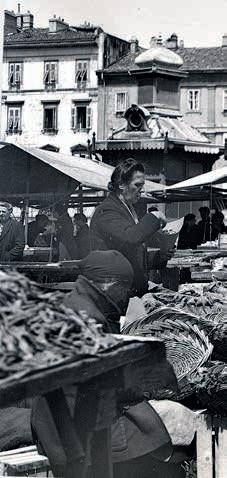
sono riuscite a emergere come poetesse, romanziere, scienziate, cantanti, psicanaliste, fotografe, attrici o pittrici. Un capitolo a parte meriterebbero le sportive, antesignane dell’emancipazione; così come le bellezze “certificate” dal titolo di Miss Italia: Alda Balestra e Susanna Huckstep. Questo articolo non può fornire un catalogo esaustivo. Ogni triestina che si rispetti, ancora oggi, ha un proprio pantheon di riferimenti e modelli. Qui scelgo solo un paio di storie, utili anche a portarvi in zone meno battute.
Le orme di Edda Marty, splendida protagonista di “Un anno di scuola” di Giani Stuparich (la cui trasposizione in miniserie tv è stata curata da Franco Giraldi), possono essere seguite
partendo dalla scuola che frequentò, il liceo Dante all’epoca in Largo Panfili, al quale lei, prima ragazza venne ammessa a inizio Novecento, per poi proseguire tra i ripidissimi viottoli di Scorcola (Salita della Trenovia, Via di Scorcola, Via Virgilio), che si aprono su paesaggi mozzafiato, fino ad arrivare al ciglione carsico (solo per i più allenati!), dove Edda amava passeggiare con Antero.
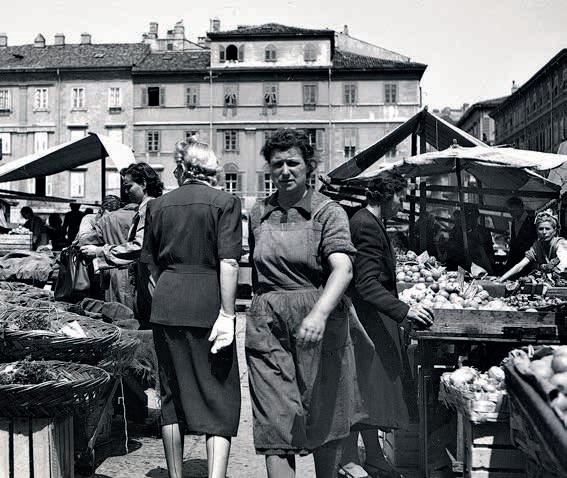
Per chi volesse rimanere in centro, come non lasciarsi stregare dalla Donna con cappello rosso di Leonor Fini al Museo Revoltella?
Nata a Buenos Aires, giunta nel 1909 a Trieste –città natale della madre–, qui si formerà sviluppando una vocazione internazionale. Da qui attraverso Cavana, storico quartiere
della prostituzione oggi completamente riqualificato, in salita verso Piazza Barbacan e Via del Trionfo per ricordare la tedesca Ricarda Huch, sposa del dentista Ermanno Cecconi, che ambientò in questa zona il romanzo Aus der Triumphgasse. E ancora verso la cima del colle di S. Vito fino a Villa Economo in Largo Promontorio, dove Isabel Arundell visse con il marito sir Richard Francis Burton.
Per concludere bisogna guardare Trieste dall’altra parte del Golfo, andando al cimitero di Muggia vecchia, dove riposano le dodici lavandaie che il 26 luglio 1878 persero la vita nell’affondamento della barca che le riportava a casa dal lavoro svolto nelle case della ricca borghesia cittadina.
When the rest of Italy thinks of Trieste, two images come to mind: the Bora wind and the mule. The word “mule”, plural for “mula” [lit. female mule], is the local vernacular expression indicating girls and young women. The city’s mule are known for their beauty, independence, cultural knowledge, and charm the proud icons of Trieste. Their physique is often praised voluptuous and tall, with a cascade of golden hair yet it is their grace and unshackled behaviour that have earned the women of Venezia Giulia their repute and admiration. Triestine donne volitive [lit. Triestine feisty women] is the title of one of the first collections of historical studies investigating the myth of the mule.
Trieste’s daughters are not only women that were born here, but also women that came to Trieste, chose these shores as their elective home, and actively contributed to the city’s cosmopolitan life. Not to mention the countless literature and fiction characters, whose performance has eternalised some of the defining aspects of the local female figures. Last but not least, the mule in the flesh were wives of sailors and seafarers, used to carry the weight of the household on their shoulders. Often being the sole force pushing the city’s economy forward, history led these women to develop an unparalleled strength and the kind of determination that characterises those who are masters of their own destiny. Venderigole and sessolotte [i.e. vegetable pedlars and coffee bean huskers, respectively], milliners and pancogole (bread pedlars) these ancient and traditionally female professions have left their mark in the city’s history. Then there are Trieste’s female intellectuals, often forced to live and work in the shadow of their male counterparts, yet able to emerge as poets, novelists, scientists, singers, psychoanalysts, photographers, actresses, and painters. An entire chapter should be exclusively devoted to Trieste’s female athletes, whose deeds and accomplishments made them the real forerunners of the women empowerment movements. And, finally, local beauty queens Alda Balestra and Susanna Huckstep, whose undeniable charm has been officially “certified” with the Miss Italia title.
These few paragraphs are not enough
to provide an exhaustive list. After all, every Triestina had and continues to have her very own personal pantheon of reference models. So I decided to select just a couple of stories, those I find most representative and, perhaps, most interesting, as they are less known to the general public. To follow the steps of Edda Marty, unforgettable main character of Giani Stuparich’s Un anno di scuola [lit. One year of school] (adapted into a TV miniseries by Franco Giraldi), one needs to start from the school she attended: Liceo Dante, located in Largo Panfili at the time the book was written, was the first school in the early 20th century to admit a girl to the 8th year of school. The traces of her story move on to the steep and narrow alleys of Scorcola (Salita della Trenovia, Via di Scorcola, Via Virgilio) and the breathtaking view underneath, all the way to the Karst shoulder (fit hikers only!), where Edda loved to stroll with Antero. Those who prefer to explore the city centre simply cannot miss the collection currently on display at Museo Revoltella, a solo exhibit celebrating Leonor Fini and her bewitching Donna con cappello rosso [Self-Portrait with Red Hat, 1968]. Leonor Fini was born in Buenos Aires 1907, yet, when she was just 18 months old, her mother brought her back to Trieste, her hometown, where she raised her daughter by herself. Young Leonor’s childhood and early youth were strongly influenced by Trieste’s atmosphere, which eventually helped her develop her distinctly international vocation. Walking further into Cavana, former red-light district and now completely requalified area, and then upwards, all the way to Piazza Barbacan and Via del Trionfo, one can almost perceive the echo of the words of German-born author Ricarda Huch, wife of dentist Ermanno Cecconi, whose novel Aus der Triumphgasse was set in this very neighbourhood. Climbing further, all the way to the top of Colle di S.Vito, one reaches Villa Economo, located in Largo Promontorio, where English writer and adventurer Isabel Arundell used to live with her husband Sir Richard Francis Burton.Our itinerary eventually leads to the other side of the Gulf and the cemetery of Muggia Vecchia, final resting place of the twelve laundresses that drowned on 26th July 1878, when the boat that was bringing them home after a day’s work in the houses of Trieste’s noble families sank in the dark waters of the Gulf.

Per la loro bellezza, l’emancipazione, la cultura, il fascino, le triestine sono da sempre un’icona della città.
—
The city’s mule are known for their beauty, independence, cultural knowledge, and charm the proud icons of Trieste.























Tutto nasce da un distributore di carburante con officina progettato negli anni ’50, oggi centro di cultura e annesso ‘Spritz point’.
Idee e progetti, parole e disegni. Se c’è una donna architetto nella Trieste del secondo novecento che ha operato a tutto tondo tra idee, progetti, parole, disegni lasciando molti segni di sé in ricordi personali indimenticabili ma anche in oggetti concreti questa è Gigetta Tamaro. Qui, in queste righe, si accenna ad un progetto che l’ha molto appassionata legato ad un edificio particolare: la Stazione Rogers di Trieste.
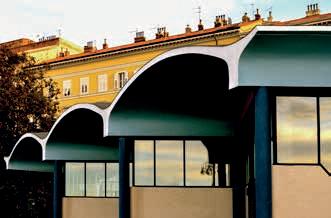
Tutto nasce da un distributore di carburante con officina progettato negli anni ’50 dal celebre Ernesto Nathan Rogers dei BBPR –quelli della Torre Velasca di Milano– e poi rigenerato, trasformato e rinnovato in distributore di cultura. Con questo slogan nel 2006 ha preso forma –diversi i protagonisti della vicenda– una nuova realtà triestina di cui l’innegabile protagonista,
It all starts with a filling station and a workshop designed in the 50s which is now culture dispenser with its ‘Spritz point’.
dall’apertura fino a quando ha potuto operare (è scomparsa nel 2016), è stata appunto Gigetta Tamaro. Protagoniste sono state le sue idee, sempre rivolte al nuovo, le sue esperienze e fitte reti di rapporti, costruiti in amicizia in tutta una vita creativa e professionale di altissimo livello.
Gigetta ha trasferito la sua ampia progettualità in questo curioso spazio connotato da un bel disegno aereo, con il tetto a forma di ampie vele, dalle tante vetrate, da colori fondamentali e rivestito in mosaico. Tante le mostre e le rassegne organizzate. In particolare ricordo i titoli di due cicli degli incontri della domenica che attestano alcune sue attitudini: il gioco e il dono. Così anche grazie alla sua passione, alla sua caparbia volontà di fare e grazie al coinvolgimento di molti appassionati di architettura, arti visive e cultura in generale, il turista passeggiando lungo le rive triestine incrocia, dalla parte opposta rispetto la stazione ferroviaria, questa nuova stazione con annesso “Spritz point”, per una sosta magari al tramonto, osservando il cielo triestino attraverso le trasparenze delle sue vetrate.
Ideas, plans, words, drawings. If you are looking for a 20th century woman architect, with abilities so comprehensive that she can work with all of the above –ideas, plans, words, and drawings– and with a touch so personal that it becomes memorable, both in her life experiences and in her creations, then you need look no further: the woman you are looking for is Gigetta Tamaro. The following paragraphs focus on a project very close to her heart, revolving around a very special building: Trieste’s Stazione Rogers.
It all starts with a filling station –just a small complex of fuel dispensers and a workshop annex, that was designed in the 1950s by renowned architect and BBPR founding partner Ernesto Nathan Rogers– whose best-known work is perhaps the Torre Velasca (Velasca Tower), located in the historic city centre of Milan. That filling station went through a whole process of regeneration, transformation, and renovation, effectively turning its fuel dispensers into culture dispensers. This unprecedented feature of Trieste was eventually inaugurated in 2006, thanks to the efforts of numerous contributors to the project, among whom, however, Gigetta Tamaro was and remained the undisputed leading mind until her passing in 2016.
She led with her ideas, always so forward looking, with her experience, and with her tightly-knit network of human relations, built on the principle of friendship throughout her entire creative life and thanks to her constant strive for professional excellence.
Gigetta was able to inject her unparalleled planning ability into the distinctly lofty design of this peculiar building, with its roof shaped like a set of sails, its
window-pane walls, its primary colours, and its tessellated facing.
Over the years Stazione Rogers has hosted countless exhibits and events. I would like to mention at least the titles of two series of Sunday conferences that are particularly telling of Gigetta’s attitude: Play and Gift. And so, thanks to her passion, her determination, and the help of many who shared her love for architecture, visual arts, and culture in general, as you walk along Trieste’s seafront with the railway station at your back, you eventually come across this “other” station, complete with its Spritz Point, where you can sip a cocktail while enjoying the sunset, as the glass window panes turn amber before the sun dives into the sea.
Gigetta Tamaro, architetto e figura culturale di fama internazionale, ha dato vita, assieme al marito Luciano Semerani, a un sodalizio umano e professionale durato più di sessant’anni. Laureatasi a Venezia, dove ha realizzato in seguito la ristrutturazione e ampliamento dell’Ospedale Civile, ha contribuito alla progettazione e riqualificazione di molti spazi triestini, tra cui piazza Sant’Antonio Nuovo, il piano per l’arredo urbano nel centro storico nonché il restauro della stazione del distributore di benzina in Campo Marzio, ora Stazione Rogers

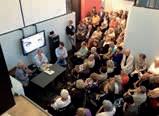
For sixty years architect and world-famous intellectual Gigetta Tamaro (1931-2016), together with her husband Luciano Semerani, have joined their forces in a union that is both human and professional in nature. Gigetta Tamaro graduated from the University of Venice, and was later entrusted with the renovation and expansion of Venice Ospedale Civile [city hospital]. In the city of Trieste she has contributed to numerous urban regeneration projects, including the redevelopment of Piazza Sant’Antonio Nuovo, the redesign of the city’s downtown area, and the redevelopment of the old gas station in Campo Marzio, now Stazione Rogers.

“Gigetta ha trasferito la sua ampia progettualità in questo curioso spazio connotato da un bel disegno aereo.”
“Gigetta was able to inject her unparalleled planning ability into the distinctly lofty design of this peculiar building.”
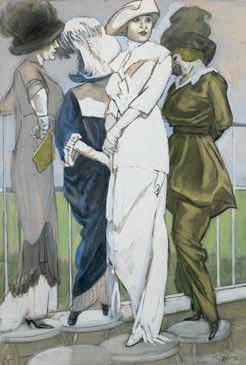
L’ippodromo di Elberfeld, (Die Pferde von Elberfeld)
c. 1911-1914
Bozzetto con gessetto nero, acquarello e tempera su carta Staatliche Graphische Sammlung, Monaco
Ardente nostalgia (Brennendes Heimweh), 1912 Bozzetto a matita e tempera su carta Staatliche Graphische Sammlung, Monaco
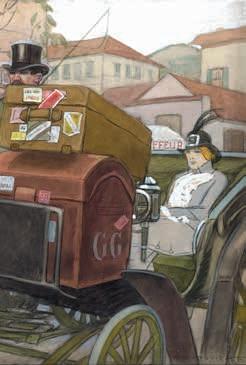
simbolo e merce.
Woman as a symbol of their time, always halfway between icon and merchandise.
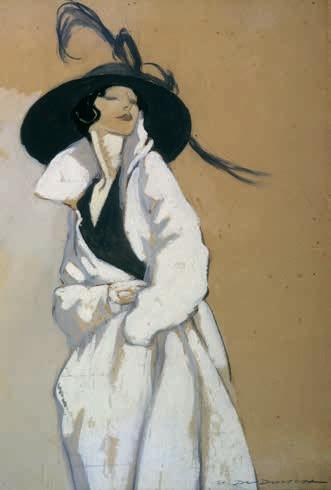
Ciò che rende uniche le donne di Marcello Dudovich è la loro riconoscibilità. Sorridenti o imbronciate, spavalde o civettuole, fasciate da abiti aderenti sempre all’ultima moda, spesso sole e, sempre, così audacemente moderne, sottratte per sempre all’assalto del tempo. Marcello Dudovich, triestino, uno dei primi pubblicitari e più famosi cartellonisti del Novecento, aveva un suo ideale di femminilità. Senz’altro traeva ispirazione dalla realtà, come mette bene in evidenza l’esposizione allestita alle Scuderie del Castello di Miramare (“Marcello Dudovich 1878 – 1962. Fotografia tra arte e passione”, fino al 10 gennaio), mostra che ha il pregio di indagare un aspetto inedito della sua arte, quello cioè di usare il mezzo fotografico come una sorta di appunto visivo per arrivare, attraverso il bozzetto, alla realizzazione dell’opera finita. Si tratta di passaggi frutto di studio ed elaborazione, per nulla banali come, invece, sembrerebbe suggerire l’opera compiuta, apparentemente semplice con i suoi contorni evidenziati e netti e con quella bidimensionalità così caratterizzante. Dudovich fotografava,
fissava istantanee di vita reale, quella della mondanità da lui frequentata che tanto lo seduceva, e poi abbozzava le opere che avrebbe presentato ai suoi illustri committenti, le sigle delle più grandi industrie che si rivolgono alla maestria della sua mano per celebrare i prodotti dell’epoca, Campari, Strega, Assicurazioni Generali, Agfa, Pirelli, Mele, Rinascente, prodotti ma anche modelli di comportamento. Nel passaggio dalla fotografia al manifesto la figura femminile veniva decontestualizzata, sfrondata dal superfluo per ritrovare la forma, l’espressione e il movimento spontaneo e naturale, ridotto all’essenziale. L’artista ritrae giovani donne all’aria aperta o nel suo studio, mai in posizione statica, anzi,
Donne sempre al centro dell’opera, in bilico tra
in movimento. Le fa danzare, piroettare, le avvolge di veli anche sulle spiagge dell’Adriatico o nelle ville di amici benestanti per trasformarle in icone.
Sigla un’epoca, e la donna nei cartelloni, nelle illustrazioni, nelle tempere e sulle copertine, diventa il “tipo” femminile di Dudovich, sempre al centro dell’opera, in bilico tra simbolo e merce.
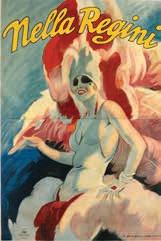
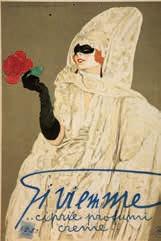
Negli anni in cui l’Italia incomincia ad essere contagiata dalla febbre delle affiches, manifesti colorati e tecnicamente ineccepibili, le modelle dell’artista triestino sono spesso attrici note e famose, da Gea della Garisenda a Maria Melato, da Nella Regini all’amica Pina Brillante, che appartengono al mondo dello spettacolo. Accanto a queste, le donne della vita di Dudovich, prima fra tutte la moglie Elisa Bucchi, faentina conosciuta a Bologna che diverrà il prototipo delle figure femminili che attraversano la sua opera. Ma anche la figlia Adriana o le nipoti, come la bella Cristina Luce, nipote a sua volta del fratello violinista di Marcello. Proprio una sua foto è stata scelta come immagine guida della mostra alle Scuderie del Castello di Miramare poiché compendia ciò che l’esaustiva esposizione vuole proporre al pubblico: la suggestione della fotografia, l’eleganza prosperosa della figura femminile che si guarda e il maestro, dietro l’obiettivo e riflesso nello specchio, che cattura un attimo estremamente contemporaneo di grazia e leggiadrìa.
Nella Regini in abito da scena con piume e svolazzi, 1920-1925
Cromolitografia su carta, Museo Nazionale Collezione Salce, Treviso
Gi Vi Emme ciprie profumi creme, ante 1923
Cromolitografia su cartoncino Museo Nazionale Collezione Salce, Treviso
Sorridenti o imbronciate, spavalde o civettuole, spesso sole e, sempre, così audacemente moderne.
Smiling or frowning, smug or flirty, often alone, and invariably modern.
Mele & C., Napoli, 1908
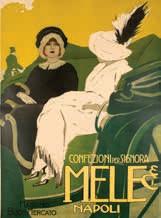
Marcello Dudovich’s women have a distinct character. Smiling or frowning, smug or flirty, wrapped in impossibly tight-fitting dresses, always à la mode, often alone, and invariably modern –bravely so, forever unencumbered by the heavy burden of time. Marcello Dudovich, Trieste-born painter, illustrator, and leading-edge poster designer of the 20th century, had his own ideal of femininity. He certainly drew his inspiration from reality, as highlighted in the display currently hosted in the former stables of Castello di Miramare (“Marcello Dudovich 1878–1962. Fotografia tra arte e passione”, open until 10th January 2021): an entire exhibit focusing for the first time on a novel aspect of Dudovich’s work, namely his use of photography as visual note-taking and preparatory step that would take him, through the rough sketch, to his finished work of art.
Every single step is the result of careful study and development. Dudovich’s creation process is rich in complexity, which, however, is hardly detectable in work, with his sharp, seamless outlines and bidimensional quality that make everything look so disarmingly simple. Dudovich’s photography captures the very essence of real life –every snapshot portraying a fragment of the surrounding mundaneness that seduced and inspired him. He then turned his pictures into rough sketches of posters and illustrations that would eventually delight his prestigious clients: Campari, Strega, Assicurazioni Generali, Agfa, Pirelli, Mele, Rinascente– the very crème de la
crème of industry, who relied on his unparalleled skill to celebrate not only their flagship products, but the lifestyle they represented. As they move from film to poster, Dudovich’s female figures become de-contextualised, every trace of redundancy discarded in order to let the essential emerge: shape, expression, and movement at their purest and most spontaneous. Portrayed in the outdoors or in his study, Dudovich’s women are never static: they dance and pirouette on the beaches of the Adriatic coast or in the halls of luxurious mansions, wrapped in the motion of fluttering veils that turn their profiles into full-fledged icons. The modern era has Dudovich’s seal: his women populate billboards, illustrations, temperas, and front covers, becoming a symbol of their time, always halfway between icon and merchandise.
As Italy gradually succumbs to the poster “fever”, vividly coloured billboards start to colonise its cities, their realisation technique increasingly perfected. Dudovich’s models are mostly well-known actresses and public’s darlings, such as Gea della Garisenda, Maria Melato, Nella Regini, and his good friend Pina Brillante, just to name a few. And then there are the women of Dudovich’s life, first and foremost his wife Elisa Bucchi: born in Faenza, Elisa meets her future husband in Bologna, and soon becomes his muse and prototype of all female figures in his art. Their daughter Adriana, and their beautiful niece Cristina Luce, daughter of Marcello’s violinist brother, are also portrayed in Dudovich’s work. Indeed, it is a picture of Cristina Luce that was selected for the posters advertising the exhibit currently hosted in the former stables of Castello di Miramare, for it perfectly conveys the message that the curators had in mind: the evocative power of photography and the voluptuous elegance of the female figure lost in self-contemplation, while the artist, hidden behind the camera lens, yet visible in the mirror reflection, captures the moment in its graceful uniqueness.
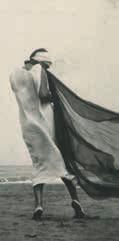
In mostra oltre 300 opere del grande maestro triestino Marcello Dudovich che mettono in luce, attraverso la sua produzione artistica, il particolare rapporto fra la fotografia e la cartellonistica.
Triestine master Marcello Dudovich are on display, highlighting, through his artistic production, the particular relationship between photography and poster art.
Info
dove/where: ex Scuderie del Castello di Miramare apertura/opening: fino al 10 gennaio 2021 / until 10 January 2021
www.miramare.beniculturali.it
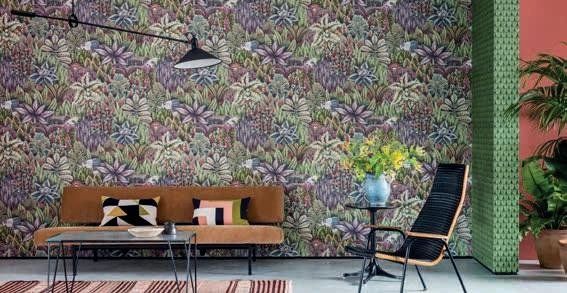
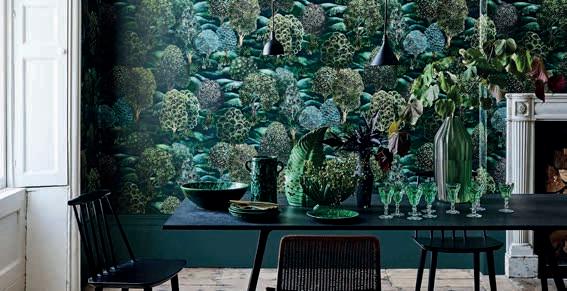 di /by Ottavio Silva
di /by Ottavio Silva
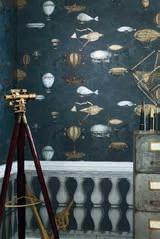
Dalla lana grezza all’uncinetto, un tempo le donne sapevano creare e riconoscere al tatto tutta una serie di tessuti e di lavorazioni, per necessità oppure per diletto a seconda della classe sociale di appartenenza. Certo, rispetto ad allora alcuni saperi sono andati perduti. Sempre alle donne tuttavia oggi si rivolge il 90% del mercato delle carte da parati: una fetta non indifferente. Il filo conduttore tra i due fenomeni? C’è ed è rappresentato dall’assoluto protagonismo femminile nel campo della decorazione, complice con ogni probabilità anche la capacità delle donne di attenzionare i dettagli e di dare un tocco di personalità a ogni cosa. Evidentemente si sono accorte che proprio le carte da parati in questo senso stanno rivoluzionando il mondo dell’architettura d’interni, sapendo apportare appunto un elemento di personalizzazione esclusiva in tempi compatibili con i ritmi della vita contemporanea, superando la tendenza all’omologazione che ha caratterizzato le produzioni seriali nella seconda metà del Novecento. Negli ultimi dieci anni le carte infatti hanno vissuto una vera e propria esplosione, anche e soprattutto sul mercato italiano: si parte ovviamente dall’amplissima scelta del colore e si passa a quella del materiale. Se ne trovano di dipinte a mano, di più o meno materiche, create su base lignea oppure con la carta di riso, arricchite con motivi floreali, geometrico-astratti, alla moda e così via. Senza contare l’archivio storico dell’Ottocento, sempre presente in particolare in un certo gusto inglese, con scene di caccia e raffigurazioni di altre fantasie del passato. Parallelamente si sono sviluppate aziende che offrono apposite consulenze per aiutare le clienti a scegliere la carta legandola ai mobili, alle luci e in generale allo spirito della casa, che rappresenta chi la abita. Benché non più come sostrato culturale collettivo, adesso l’importanza della decorazione è in questo modo riemersa dal passato, ancora una volta come valore femminile.
From raw wool to crochet, women once knew how to create and recognise to the touch a whole series of fabrics and processes, for necessity or pleasure depending on the social class they belonged to. Certainly, since then some knowledge has been lost. Today, however, women still account for 90% of the wallpaper market: a significant proportion. The common thread between the two phenomena? There is one and it is represented by the absolute female protagonism in the field of decoration, which is probably also due to women’s ability to pay attention to details and to give a touch of personality to everything. Evidently they have realised that wallpapers in this very sense are revolutionising the world of interior architecture, bringing an exclusive element of personalisation at times compatible with the rhythms of contemporary life,
overcoming the trend towards standardisation that characterised serial production in the second half of the twentieth century. Over the last ten years, in fact, papers have experienced a real explosion, also and above all on the Italian market: starting, of course, with the very wide choice of colour and moving on to that of the material. There are hand-painted papers, of varying texture, created on a wooden base or with rice paper, enriched with floral motifs, geometric-abstract, trendy and so on. Not to mention the historical archive of the nineteenth century, always present in particular in a certain English taste, with hunting scenes and other patterns of the past. At the same time, you can now find companies offering special consultancy services to help customers choose paper by matching it to the furniture, lights and in general to the spirit of the house, which represents the people who live in it. Although no longer as a collective cultural substratum, the importance of decoration has now reemerged from the past, once again as a feminine value.
C’è un assoluto protagonismo femminile nel campo della decorazione, complice la capacità delle donne di dare un tocco di personalità a ogni cosa.
There is an absolute female protagonism in the field of decoration, due to women’s ability to give a touch of personality to everything.
Con l’inizio degli anni venti tutta l’Europa fu travolta da profondi cambiamenti sociali e politici. Il femminismo e la voglia di emancipazione misero in dubbio valori e tradizioni e la donna assunse un nuovo ruolo. Lo stesso accadde nel mondo dell’arte dove la donna non fu più solo soggetto o musa ispiratrice ma protagonista attiva. Trieste, travolta anch’essa dall’onda rivoluzionaria, diede vita a importanti artiste che, attraverso la realizzazione delle loro opere, contribuirono a lasciare un’impronta e donarono all’arte splendide opere custodite nei musei di Trieste e di tutto il mondo.
With the beginning of the 1920s, the whole of Europe was overwhelmed by profound social and political changes. Feminism and the desire for emancipation cast doubt on values and traditions and women took on a new role. The same happened in the art world where the woman was no longer just an inspiring subject or muse but an active protagonist. Trieste, also overwhelmed by the revolutionary wave, gave birth to important artists who, through the realization of their works, helped to leave a mark and gave art wonderful works kept in museums in Trieste and around the world.
Grande amica delle sorelle Wanda e Marion Wulz, la cui famiglia era titolare di un importante studio fotografico, comincia a dedicarsi fin da giovane alla tessitura. Cominciò a sperimentare inventando il “punto alto leggero a intarsio” e realizzando abiti originali e innovativi. Entra in contatto con Giò Ponti, fondatore della rivista “Domus”, mensile dedicato alle arti decorative e dell’arredamento, il quale pubblica sul suo giornale un arazzo di Anita. Conosce Bragaglia, innovatore del teatro e autore del primo film d’Avanguardia del mondo che non lesina commenti positivi sul suo operato. Nel 1930 la Pittoni debutta al Teatro Filodrammatico di Milano con i suoi costumi dall’impronta futuristica e dà il via alla sua carriera. Durante la seconda guerra il lavoro cala ma non perde la voglia di regalare un suo pensiero agli amici tra cui Umberto Saba per il quale crea un paio di guanti di lana. I suoi abiti, vere e proprie opere d’arte, sono visibili al Civico Museo di storia e patria.
A great friend of sisters Wanda and Marion Wulz, whose family owned an important photographic studio, she began to dedicate herself to weaving at an early age. She began to experiment by inventing the “light inlaid high stitch” and making original and innovative clothes. She came into contact with Giò Ponti, founder of the magazine “Domus”, a monthly magazine dedicated to the decorative arts and furnishings, which published a tapestry by Anita in his newspaper. She met Bragaglia, an innovator of the theatre and author of the first avant-garde film in the world, who did not hesitate to comment positively on her work. In 1930 Pittoni made her debut at the Teatro Filodrammatico in Milan with her futuristic costumes that kicked off her career. During the Second World War her work declined but she did not lose the desire to give a present to her friends including Umberto Saba for whom she created a pair of wool gloves. Her clothes, true works of art, can be seen at the Civic Museum of History and Homeland.
—
Three great personalities from the Trieste and international art world.
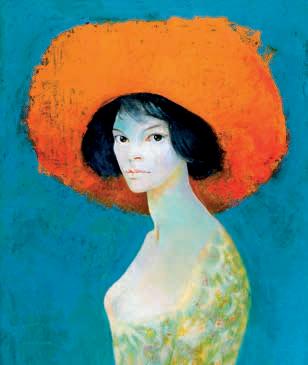
Pittrice, scenografa, costumista, scrittrice, illustratrice e disegnatrice: un vero talento del mondo artistico triestino. Nata da padre argentino e madre triestina, Lolò frequentò gli atelier più noti del ventennio triestino facendo amicizia con Arturo Nathan e Carlo Sbisà. Suo grande maestro, che influenzò la sua pittura sino al suo trasferimento a Parigi, fu Edmondo Passauro. Nella capitale francese entrò in contatto con Salvador Dalì, Max Ernst e Henri CartierBresson. Stile personalissimo e poliedrico, Leonor spazia dal mosaico alla pittura e letteratura surrealista (famosissimo il dipinto Le bout du monde acquistato da Peggy Guggenheim) anche se non amava essere categorizzata e perseguiva uno stile del tutto personale e originale. Lolò fu una donna innovativa, rivoluzionaria, anticonformista, femminista e libertina che nei suoi quadri dipinse sfingi, personaggi ambigui, sensuali; Leonor fu “capace di rappresentare il femminino con una particolarissima sensibilità” scrisse su di lei Vittorio Sgarbi. Al museo Revoltella – Galleria Arte Moderna è possibile ammirare i suoi lavori.
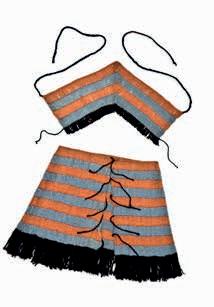
Painter, set designer, costume designer, writer, illustrator and artist: a true talent of Trieste’s art world. Born to an Argentinean father and mother from Trieste, Lolò attended the most famous ateliers of the fascist years in Trieste, making friends with Arturo Nathan and Carlo Sbisà. Her great master, who influenced her painting until she moved to Paris, was Edmondo Passauro. In the French capital he came into contact with Salvador Dali, Max Ernst and Henri Cartier-Bresson. A very personal and versatile style, Leonor ranged from mosaic to Surrealist painting and literature (the painting Le bout du monde purchased by Peggy Guggenheim was very famous), although she did not like to be categorized and pursued a completely personal and original style.
Lolò was an innovative, revolutionary, nonconformist, feminist and libertine woman who painted sphinxes and ambiguous, sensual characters in her paintings; Leonor was “capable of representing the feminine with a very particular sensitivity” Vittorio Sgarbi wrote about her. At the Revoltella Museum – Modern Art Gallery you can admire her works.
Anita Pittoni Modello “Selvaggio”, da spiaggia e da giardino, 1938 Juta lavorata a uncinetto, Civici Musei di Storia ed Arte, Trieste Leonor Fini Autoritratto, 1968 Civico Museo Revoltella, TriesteLa capacità narrativa e l’organizzazione degli spazi contraddistinguono l’arte pittorica di quest’artista che Gillo Dorfles definì la sola artista dell’area giuliana ad aver creato, nella breve stagione che va dagli anni Sessanta ai Settanta, un’opera non solo degna di essere ricordata e studiata, ma degna di essere considerata come una solitaria e inimitabile avventura della fantasia. Miela Reina fu un’artista controcorrente, il cui stile è difficilmente catalogabile come pittura surrealista in quanto troppo giocosa e troppo poco morbosa come da definizione sempre di Dorfles. Non solo pittura, ma spazio pure a teatro, decorazione, illustrazione e disegno per uno stile fuori dagli schemi.
A Trieste aprì la prima galleria “La Cavana” assieme a Enzo Cogno dove promosse le nuove tendenze artistiche, l’Astrattismo e l’Informale.
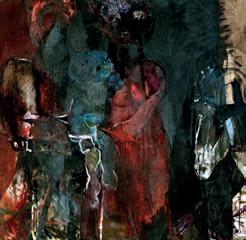

La sua attività proseguì nell’associazione Arte Viva, luogo di sperimentazione per le arti visive. Morì, improvvisamente a 36 anni, lasciando un vuoto incolmabile.
The narrative talent and the organization of the spaces distinguish the paintings of this artist who Gillo Dorfles defined as the only artist of the Julian area to have created, in the short season from the Sixties to the Seventies, a work not only worthy of being remembered and studied, but worthy of being considered as a solitary and inimitable adventure of fantasy.
Miela Reina was an artist against the tide, whose style is difficult to classify as surrealist because it is too playful and too little morbid as Dorfles always defined it. Not only painting, but also theatre, decoration, illustration and drawing for a style outside the box. In Trieste she opened the first gallery “La Cavana” together with Enzo Cogno where she promoted new artistic trends, Abstractionism and the Informal. Her activity continued in the association Arte Viva, a place of experimentation for visual arts. She died suddenly at the age of 36, leaving an unbridgeable void.
Trieste, 1935 – Udine, 1972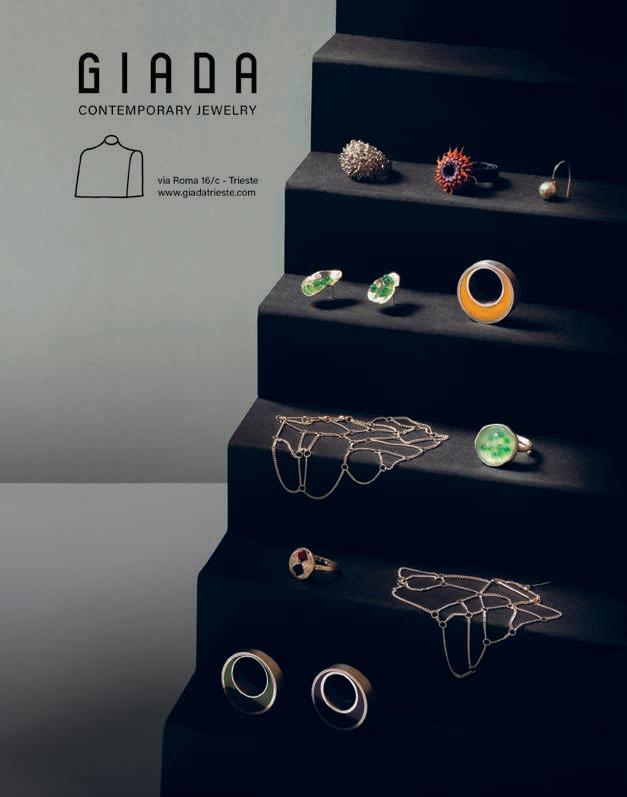

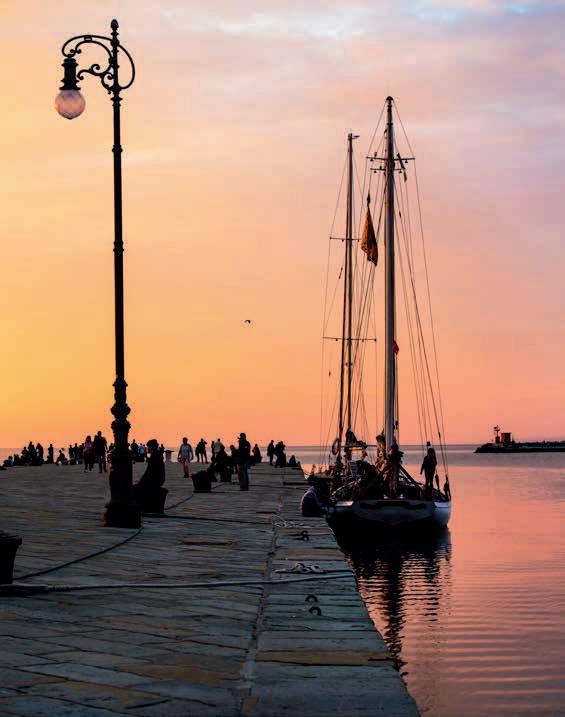
In alto a destra. Così cercavo di fissare nella memoria la posizione geografica di Trieste quando, alle scuole elementari, si studiava il Friuli Venezia Giulia. E per una romana de Roma già Friuli poteva bastare. Solo più tardi ho capito che Trieste è un luogo a sé e col Friuli c’entra poco. L’ho imparato quando scoprii questa città, quasi un ventennio fa. Allora non c’erano ristoranti dove potevi mangiare dopo le 21.30 e l’aperitivo lo sorseggiavi fuori dalle rare, minuscole, enoteche del centro dove i pochi ragazzi che incrociavi non sapevano neanche cosa fosse la movida. E non c’erano ancora gli abeti addobbati e la musica mitteleuropea a suggellare la magia del Natale nella piazza più bella del mondo ma, già allora, ne rimasi stregata. Non so quando è successo esattamente ma ricordo una vertigine di felicità mentre passeggiavo, scompigliata da una discreta bora, sul molo audace rivolta verso la terraferma, con tutte quelle lucine blu a far da stelle a quel quadro meraviglioso che è Piazza Unità d’Italia.
Non mi sono mai pentita di aver abbandonato Roma e la mia società di comunicazione ed eventi, per trasferirmi qui e reinventarmi una nuova vita e una manifestazione che, per prestigio e autorevolezza, ha ormai valicato i confini nazionali. Una sfida impegnativa e niente affatto facile, vinta anche grazie alla bellezza e unicità di Trieste dove i grandi protagonisti dell’informazione e della cultura sono sempre felici di raggiungerci. E come una ragazzina mi ritrovo continuamente a condividere con loro lo stupore per la città elegante, pulita, ordinata, civile e bellissima,
raccontando quanto sia incantevole passeggiare tra gli stretti vicoli del ghetto e di Cavana, salire sul bastione fiorito del castello, guardare il golfo e sentire un tuffo al cuore, bere un caffè seduta al tavolino dove Joyce scriveva il suo Ulisse e tante meraviglie ancora. Come quella, incredibile, di raggiungere le rive all’alba nel giorno della Barcolana, fare colazione nei bar pieni di equipaggi, con i velisti bellissimi nelle loro divise colorate e ascoltare in soggezione le loro battute bonarie, caricarsi della loro emozione mista a concentrazione e vederli poi salire in barca e salpare tutti assieme in un’atmosfera unica di foga, di ebbrezza, di impazienza. Magia pura.
Proprio così, sono innamorata di Trieste. Che per me rimarrà sempre dove si trova il cuore quando guardi chi ami: in alto a destra.
Top right. This is how I tried to memorise the geographical position of Trieste when we studied Friuli Venezia Giulia at primary school. And for a true Roman the name Friuli was more than enough. It was only later that I realised that Trieste was a place of its own and had little to do with Friuli. I learned this when I discovered this city almost twenty years ago. At that time there were no restaurants where you could eat after 9.30 p.m. and you could only sip your aperitif outside the rare, tiny wine bars in the centre where the few guys you met didn’t even know what nightlife was. And there were still no decorated fir trees and Central European music to seal the magic of Christmas in the most beautiful square in the world but, even then, I was bewitched. I don’t know when exactly it happened but I remember a thrill of happiness while I was walking, my hair ruffled by a discreet bora, on Pier Audace looking towards the mainland, with all those little blue lights like stars, creating the wonderful painting that is Piazza Unità d’Italia.
I have never regretted having abandoned Rome and my media & events company, to move here and reinvent myself with a new life and an event that, for its prestige and importance, has now crossed national borders. A tough and not at all easy challenge, won
ENGLISH TEXT“Ricordo una vertigine di felicità mentre passeggiavo, scompigliata da una discreta bora, sul molo Audace. Non mi sono mai pentita di aver abbandonato Roma per trasferirmi qui.”
“I remember a thrill of happiness while I was walking, my hair ruffled by a discreet bora, on Pier Audace. I have never regretted having abandoned Rome to move here.”
also thanks to the beauty and uniqueness of Trieste where the great protagonists of information and culture are always happy to join us. And like a little girl, I find myself constantly sharing with them my amazement at the elegant, clean, tidy, civil and beautiful city, and telling them how enchanting it is to walk through the narrow alleys of the ghetto and Cavana, climb the flowery bastion of the castle, look at the gulf and feel a plunge into my heart, drink a coffee sitting at the table where Joyce wrote his Ulysses and many more wonders. For instance the incredible feeling when you reach the shores at dawn on the day of the Barcolana, have breakfast in the bars full of crews, with the beautiful sailors in their colourful uniforms and listen in awe to their good-natured jokes, charge yourself with their passion mixed with concentration and then watch them get on the boats and set sail all together in a unique atmosphere of enthusiasm, excitement and impatience. Pure magic.
That’s right, I am in love with Trieste. For me it will always remain where the heart is when you look at who you love: top right.
Francesca Fresa, romana, ha iniziato giovanissima a muoversi nel campo dell’organizzazione eventi e comunicazione, seguendo con la sua società uffici stampa di diversi programmi televisivi, soprattutto in RAI, e curando la realizzazione di numerosi eventi a Roma. Nata e cresciuta professionalmente nella capitale (quartiere Trieste, una predestinata…) dall’inizio degli anni duemila vive e lavora nella nostra città. Dal 2004 cura l’organizzazione del Premio giornalistico internazionale Marco Luchetta che si conclude con la trasmissione di Rai 1 “I nostri angeli” e da sette anni Link, il festival del giornalismo di Trieste. Il festival Link è in programma nel villaggio allestito in piazza Unità d’Italia dall’1 al 4 di ottobre, con una trentina di appuntamenti che vedranno come protagonisti le più autorevoli firme del giornalismo.
Il festival aderisce al progetto europeo “No woman no panel”, che prevede una presenza femminile per ogni incontro in programma.

Francesca Fresa, born in Rome, began to work in the field of event organization and communication at a very young age, collaborating with press offices for various television programmes, especially RAI, and supervising the realization of numerous events in Rome. Born and raised professionally in the capital (Trieste neighbourhood, a predestination...) she has been living and working in our city since the early 2000s. Since 2004 she has been organizing the Marco Luchetta International Press Award, which culminates with the programme of RAI 1 I Nostri Angeli (lit. Our Angels) and for seven years Link, the festival of journalism in Trieste. The Link festival is scheduled to take place in the village in Piazza Unità d’Italia from 1 to 4 October, with around thirty events featuring the most outstanding names in journalism. The festival supports the European “No woman no panel” campaign ensuring that at least one woman takes part in each scheduled panel.
www.luchettaincontra.it
 La farfalla simbolo di Link, festival del giornalismo del Premio Luchetta.
/ The butterfly, symbol of Link, festival of Journalism by Premio Lucchetta
La farfalla simbolo di Link, festival del giornalismo del Premio Luchetta.
/ The butterfly, symbol of Link, festival of Journalism by Premio Lucchetta

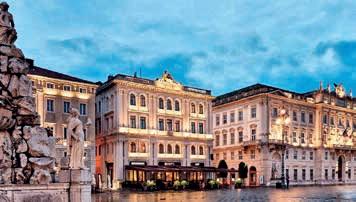
Il passato ed il futuro di Trieste visto con gli occhi delle donne che la vivono e l’hanno vissuta.
Dai musei storici agli studi di design, architettura e moda.
Una Trieste sempre in bilico fra passato e futuro fatta di scrittori, artiste, donne forti, frequentatrici di caffè storici, botteghe antiquarie e chiese multietniche.
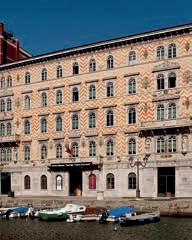
Una città famosa per le sue donne emancipate e sportive che amano la zona del Carso per passeggiare un pò fuori città, fra grotte e osmize.
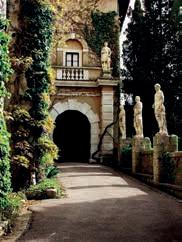

Un viaggio tutto al femminile con un programma un po’ a sorpresa... perchè di solito a noi donne piace cosi!
 CIVIDIN VIAGGI S.r.l. Via Imbriani, 11 • Trieste www.cividin.it
IL VIaggIo dI
CIVIDIN VIAGGI S.r.l. Via Imbriani, 11 • Trieste www.cividin.it
IL VIaggIo dI

Achi mi chiede “com’è stato passare una vita in teatro?” rispondo “e come faccio a saperlo?”. Dovete sapere che adoro i Beatles e i Rolling Stones, questi ultimi, non solo perché ho lavorato a Londra negli anni ’60, ma anche perché sono un po’ vecchiotti, poco meno di me, e ancora lavorano, eh! A Trieste ho avuto la fortuna di conoscere tante persone meravigliose con cui ho iniziato a recitare, tra cui (nel 1976) Francesco Macedonio, Orazio Bobbio, Lidia Braico e insieme abbiamo fondato La Contrada. Oggi il mondo del teatro è cambiato ma ogni generazione ha avuto le sue difficoltà in questo settore e ai giovani di oggi vorrei dire di puntare sulle proprie passioni e di lavorare su queste con determinazione e coraggio. La precarietà e le delusioni sono purtroppo frequenti nel mondo d’oggi, quindi tanto vale inseguire i propri sogni! Perchè recitare per me è, ed è stato sempre, un lavoro serio, non sempre facile, ma è soprattutto vivere. E i due spettacoli che porto in scena quest’anno parlano proprio di questo, della gioia di vivere e di avere ancora tanta voglia di dare, soprattutto ad una certa età… Il primo è Ottantena. Stand Up Comedy Show per Signora e mascherina, scritto da Davide Calabrese che ne cura anche la regia, in scena per un mese dal primo di ottobre. Una sfida per me, un tipo di spettacolo cui non sono abituata. Durante il periodo della quarantena un’attrice con qualche anno sulla carta d’identità, ma pochissimi nell’animo, rinuncia alla solitudine e decide di passare questo periodo assieme al compagno di sempre:
il Teatro e quindi con gli spettatori. Sul palco, con me ci sarà Anselmo Luisi nei panni di un bizzarro e stravagante musicista che suona… di tutto, dagli oggetti e, beh vedrete… Harold e Maude invece, per la regia di Diana Höbel, in scena dal 9 aprile 2021, è la versione teatrale del famoso film. Il ruolo della protagonista sembra tagliato su di me: la vivacità, la comicità che la rende senza età, perenne bambina irriverente, in un testo divertente ma toccante e poetico. Ero triste di non poter lavorare per il primo spettacolo della stagione insieme alla Compagnia della Contrada, così sono davvero felice ci sia uno spettacolo insieme a Marzia Postogna, Enza De Rose, Davide Rossi, e non solo… Vi aspetto tutti, eh!
ENGLISH
To those who ask me “what was it like to spend a lifetime on stage?” I answer “and how do I know?”. You should know that I love the Beatles and the Rolling Stones, the latter not only because I worked in London in the ‘60s, but also because they are a bit old, a little less than me, and still work, huh! In Trieste I was lucky enough to meet many wonderful people with whom I started acting, including (in 1976) Francesco Macedonio, Orazio Bobbio, Lidia Braico and together we founded La Contrada. Today the world of theatre has changed but every generation has had its difficulties in this sector and I would like to say to the young people of today to focus on their passions and work on them with determination and courage. Precariousness and disappointments are unfortunately frequent in today’s world, so we might as well chase our dreams! Because acting for me is, and has always been, a serious job, not always easy, but above all it is living. And the two shows that I bring on stage this year talk about this, about the joy of life and the desire to give,
“I due spettacoli che porto in scena quest’anno parlano della gioia di vivere e di avere ancora tanta voglia di dare, soprattutto ad una certa età…”
“The two shows that I bring on stage this year talk about the joy of life and the desire to give, especially at a certain age...”
especially at a certain age... The first is Ottantena. Stand Up Comedy Show per Signora e mascherina, written by Davide Calabrese, who also directs it, on stage for a month from the first of October. A challenge for me, a kind of show I’m not used to. During the quarantine period, an actress with a few years on her identity card, but very few in her soul, gives up her loneliness and decides to spend this period together with her lifelong companion: the Theatre and therefore with spectators. On stage, with me there will be Anselmo Luisi as a bizarre and extravagant musician who plays... everything, objects and, well, you’ll see... Harold and Maude, directed by Diana Höbel, on stage from 9th April 2021, is the theatrical version of the famous film. The role of the protagonist seems cut out for me: the liveliness, the comedy that makes her ageless, perennial irreverent child, in a funny but touching and poetic text. I was sad not to be able to work for the first show of the season together with the Compagnia della Contrada, so I’m really happy to have a show together with Marzia Postogna, Enza De Rose, Davide Rossi, and not only... I’m waiting for you all!
Poche settimane fa ha tagliato il traguardo che porta il numero 84, lo stesso di un brandy che nel dopoguerra è stato uno dei simboli della sua città, Trieste. Un simbolo, un’icona, per molti ormai un mito, Ariella Reggio lo è a Trieste in campo teatrale, protagonista di una luminosa carriera che l’ha vista crescere dapprima nella compagnia di prosa della RAI e dopo una parentesi londinese alla BBC, dove ha condotto trasmissioni radiofoniche e televisive, sulle scene teatrali. Ha iniziato al Piccolo di Milano con Giorgio Strehler, quindi a Genova, prima di tornare nella sua Trieste per una lunga collaborazione con lo Stabile e numerose operette al Verdi. Nel 1976 è tra le fondatrici del Teatro Popolare La Contrada dove collabora nella produzione, ritagliandosi un ruolo fondamentale nella conservazione della prosa dialettale. Ma è anche attrice per il piccolo e grande schermo, protagonista di molte miniserie e fiction di grande successo. Nel 2014, suggello di una lunghissima carriera, le viene conferito il San Giusto d’Oro dai cronisti triestini. Dal mese di ottobre è in scena al Teatro Bobbio con Ottantena, primo spettacolo in cartellone nella stagione della Contrada.
A few weeks ago she crossed the finish line carrying number 84, the same number of a brandy that in the post-war period was one of the symbols of her city, Trieste. A symbol, an icon, for many now a myth, Ariella Reggio is a myth in Trieste in the theatrical field, the protagonist of a brilliant career that saw her grow up first in the prose company of RAI and after a London interlude at the BBC, where she conducted radio and television broadcasts, on stage. She started at the Piccolo in Milan with Giorgio Strehler, then in Genoa, before returning to her native Trieste for a long collaboration with the Stabile and numerous operettas at the Verdi Theatre. In 1976 she was one of the founders of the Teatro Popolare La Contrada where she collaborated in the production, playing a fundamental role in the preservation of dialectal prose. But she is also an actress for the small and big screen, starring in many successful miniseries and dramas.
In 2014, the seal of a very long career, she was awarded the San Giusto d’Oro by the journalists of Trieste. Since October she has been on stage at the Bobbio Theatre with Ottantena, the first show in the Contrada’s season
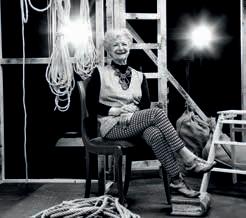

“Recitare per me è soprattutto vivere.”
“Acting for me is above all living”
Castello di Gorizia, 1 agosto 2020 -10 gennaio 2021 (orari di apertura: da martedì a domenica dalle 10 alle 13 e dalle 15 alle 19)
Gorizia dedica una grande mostra a Massimiliano I, grande imperatore degli Asburgo, protagonista della politica europea tra 1400 e 1500 e grande comunicatore.
Materiali originali provenienti da importanti collezioni private testimoniano il ruolo attivo di Massimiliano come committente e il suo intervento diretto in importanti progetti artistici: fu per esempio un indubbio maestro nel mettersi in scena servendosi dei mezzi dell’arte, in particolare della xilografia, di cui aveva intuito le potenzialità per i costi limitati e tirature importanti che garantivano una diffusione capillare e controllata alla fonte. Una moderna arma mediatica che Massimiliano piegò ai propri desideri agiografici per portare la propria effige e il racconto di sé stesso in ogni angolo dell’impero. Bellissime xilografie firmate da Albrecht Dürer, Hans Burgkmair, Albrecht Altdorfer e incisioni acquarellate tematizzano tutti gli eventi memorabili della vita dell’imperatore, il primo matrimonio con Maria di Borgogna e poi quello con Bianca Maria Sforza, i suoi antenati, le guerre, gli importanti eventi politici e sociali, il suo esercito, i suoi svaghi privati, fatti di musica, spericolati tornei e partite di caccia, una sorta di “catalogo” di tutto il suo operato, che consentirà al visitatore di cogliere importanti spaccati sugli usi e fogge dell’epoca.
Per informazioni: 0481 535146 / Per eventuali visite guidate di gruppi nel rispetto delle norme di accesso chiamare il numero 3312388939
Gorizia Castle, August 1, 2020 - January 10, 2021
(Opening times: from Tuesday to Sunday from 10.00 am to 01.00 pm at and from 03.00 to 07.00 pm)
Gorizia dedicates a great exhibition to Maximilian I, the great Emperor and forerunner of a new dimension of culture and politics in Europe, but also heir to the Countship of Gorizia.
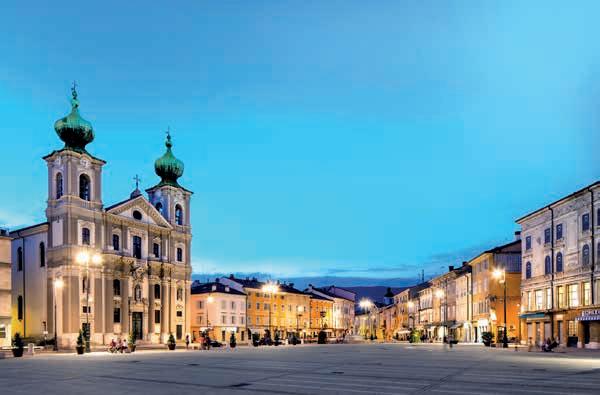
Original relics from important private collections testify to Maximilian’s active role in commissioning works and his direct intervention in important artistic projects: he was, for example, an undoubted master in promoting himself using different means of art, in particular woodcutting, of which he had sensed the potential because of its limited costs and extensive circulation that ensured a widespread diffusion which could be controlled at the source. A modern media weapon that Maximilian with the help of the masters of the time bent to his own biographic desires to bring his effigy and his story to every corner of the empire. Beautiful woodcuts signed by Albrecht Dürer, Hans Burgkmair, Albrecht Altdorfer and watercolour engravings depict all the memorable events of the emperor’s life, his first marriage to Maria di Borgogna and then to Bianca Maria Sforza, his ancestors, the wars, important political and social events, his army, his private recreations, mainly concerning music, fearless tournaments and hunting parties, a kind of “catalogue” of all his work, which will allow the visitor to grasp important glimpses of the customs and sounds of the time.
For further information: +39 0481 535146 / For eventual guided tours of groups following the access rules call +393312388939
Un viaggio tra luoghi simbolo attraverso i volti di alcune delle tante protagoniste femminili della vita sociale ed economica della città. Donne imprenditrici, sportive e icone di uno spirito di intraprendenza che rappresenta l’anima di Trieste e interpreti di molti luoghi splendidi del territorio, dal molo Audace, al sentiero Rilke: ritratti incantevoli che catturano la bellezza dei posti e, ovviamente, delle protagoniste.
–A journey through symbolic places with the portraits of some of the many female protagonists of the city’s social and economic life. Women entrepreneurs, sportswomen and icons of an enterprising spirit that represents the soul of Trieste and interpreters of many beautiful places in the area, from the Molo Audace to the Rilke path: enchanting portraits that capture the beauty of the places and, of course, of the protagonists.
Un’atletica Federica Macrì, ex ginnasta italiana, oro agli Europei del 2006 sugli scogli dello stabilimento balneare Sticco, sulla riviera di Barcola, a pochi metri dalla Riserva Marina di Miramare e al Castello.
–An athlete Federica Macrì, former Italian gymnast, gold medalist at the 2006 European Championships on the rocks of the Sticco bathing establishment on the Barcola Riviera, just a few metres from the Miramare Marine Reserve and the Castle.

Sarà il Magazzino 26 del Porto Vecchio la nuova sede dell’Immaginario Scientifico, il museo interattivo che ti fa conoscere la scienze giocando. La direttrice Serena Mizzan, ritratta negli interni del Magazzino 26, non può che esserne felice! –
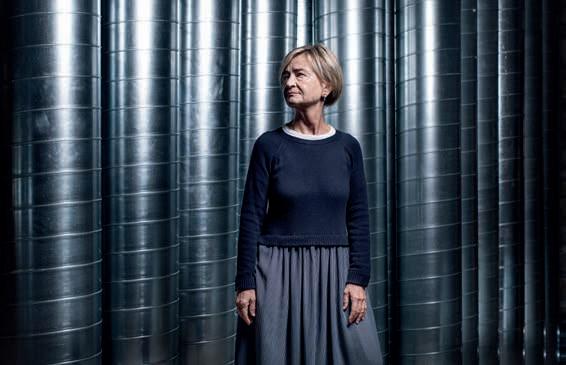
Warehouse 26 will be the new seat of the Immaginario Scientifico, the interactive museum that makes you learn about science while playing. Serena Mizzan, director, can only be delighted!
L’attrice triestina Lara Komar in posa nel foyer del teatro Rossetti. Sul palco del Teatro Sloveno di Trieste e del Rossetti ha mosso i primi passi per diventare la regina di una soap opera alla tv slovena.
Triestine actress Lara Komar posing at foyer the Rossetti Theatre. On the stage of the Slovenian Theatre of Trieste and Rossetti she took her first steps to become the queen of a soap opera on Slovenian TV.
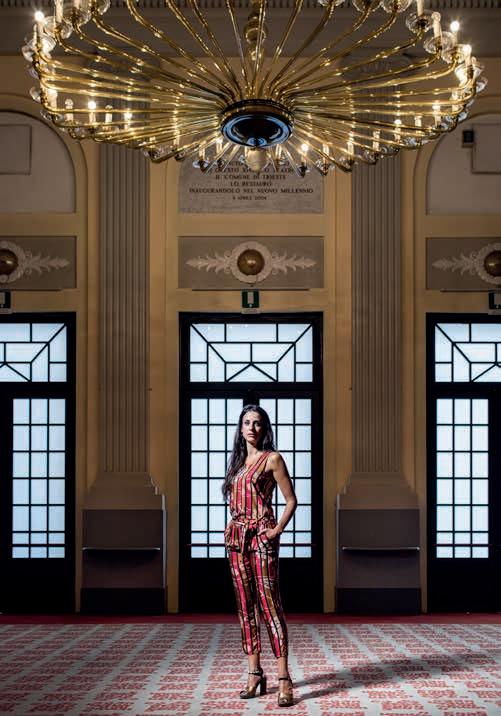
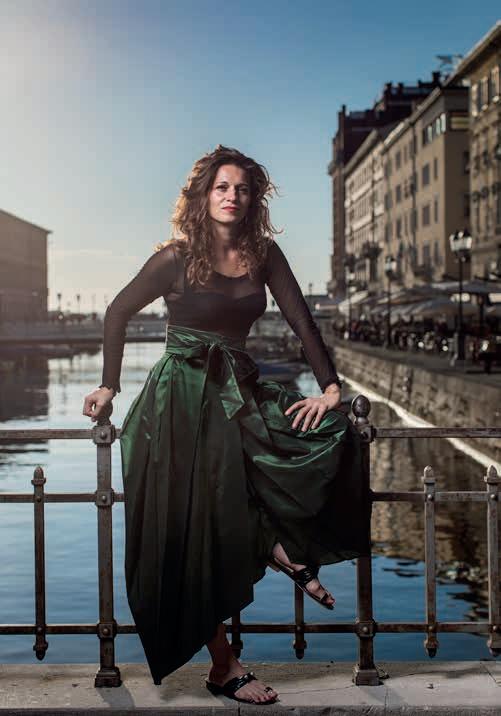
Giorgia Da Ros sul Canal Grande, a due passi dalla statua di James Joyce e da piazza Sant’Antonio, dove si trova la sua profumeria ‘Essenze’ regno di fragrances introvabili e di nicchia.
Giorgia Da Ros on the Canal Grande, a stone’s throw from the statue of James Joyce and Piazza Sant’Antonio, where her perfumery ‘Essenze’ is located, a realm of unique and niche fragrances.
Sul sentiero Rilke Giorgia Bacchia, Cooperativa Gemina, è pronta ad accompagnarci lungo le Falesie della Riserva di Duino fino ad arrivare al sito paleontologico del Villaggio del Pescatore: un affascinante viaggio alla scoperta del Carso nascosto tra storia, natura e dinosauri.
–On the Rilke path Giorgia Bacchia, Cooperativa Gemina, is ready to accompany us along the cliffs of the Duino Reserve until we reach the paleontological site of the Villaggio del Pescatore: an amazing journey to discover the Karst through nature, history and dinosaurs.
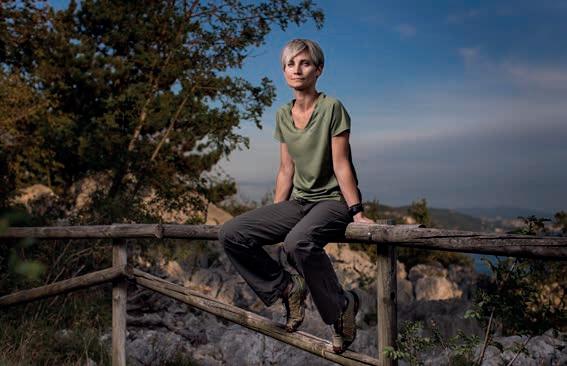
Le ragazze fondatrici di Barbacan Produce, mercatino di artisti e designer in Cittavechia: Alessia AlessioVernì (Boogaloo Vintage & more), la fotografa Nika Furlani che assieme a Lodovica Fusco gestiscono Combiné, un bellissimo spazio dove trovare fotografie d’arte e gioielli fatti a mano, e Francesca Crevatin della gioielleria in piazza Cavana in posa vicino all’Arco di Riccardo, in piazzetta Barbacan.
–
The girls who founded Barbacan Produce, a market of artists and designers in Cittavechia: Alessia AlessioVernì (Boogaloo Vintage & more), photographer Nika Furlani who together with Lodovica Fusco run Combiné, a beautiful space where you can find handmade art photographs and jewellery, and Francesca Crevatin of the jewellery shop in Piazza Cavana posing near the Arco di Riccardo.
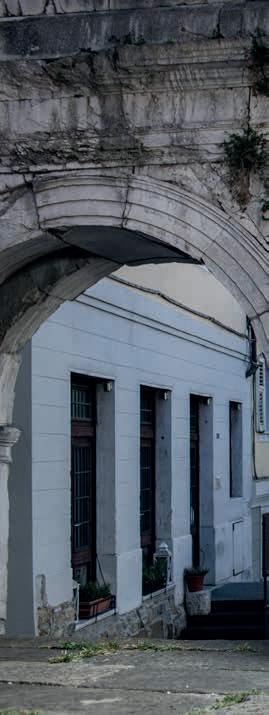
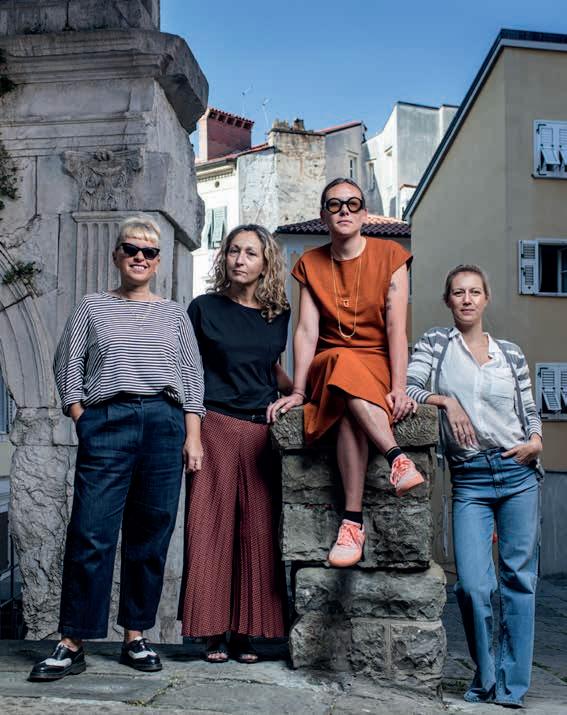
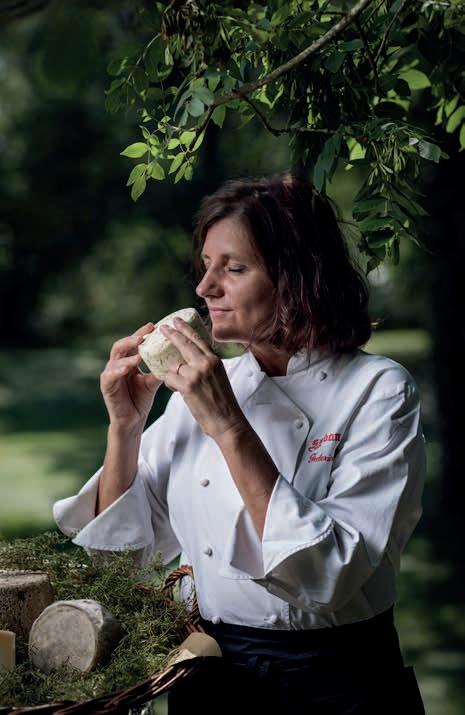
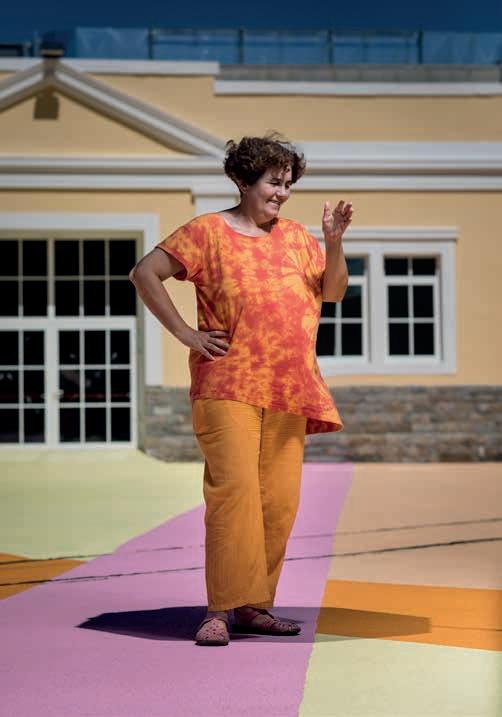
In posa sulla sua ultima opera di street, l’artista Elisa Vladilo sui colori di Echo Surrounding, un grande dipinto pubblico di fronte alla Centrale Idrodinamica del Porto Vecchio, un’area in via di riqualificazione che da poco ospita il nuovo Trieste Convention Center.
–
Posing on his latest street work, the artist Elisa Vladilo on the colours of Echo Surrounding, a large public painting in front of the Hydrodynamic Power Station in the Old Port, an area undergoing redevelopment that recently hosts the new Trieste Convention Center.
Al Castello di Miramare ci accoglie Andreina Contessa, direttrice di questa splendida dimora e parco risalente all’epoca asburgica e luogo custode di sogni e leggende.
–
At the Castle of Miramare we are welcomed by Andreina Contessa, director of this splendid residence and park dating back to the Hapsburg era and guardian of dreams and legends.
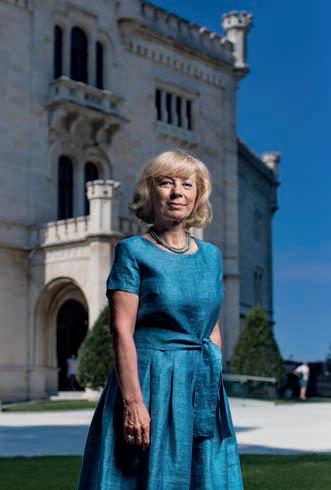
Claudia D’Atri, consorte del Sindaco di Trieste, Roberto Dipiazza. First lady simbolo dell’accoglienza triestina, Claudia è psicologa del lavoro e delle organizzazioni nella città che l’ha adottata; amante del tennis, qui è in posa sul molo Audace, un luogo imperdibile per il suo fascino.
–Claudia D’Atri, wife of the Mayor of Trieste, Roberto Dipiazza. First lady symbol of Trieste’s hospitality, Claudia is a job and organisation psychologist in the city that adopted her; a tennis lover, here she is posing on the pier Audace, a place not to be missed for its charm.
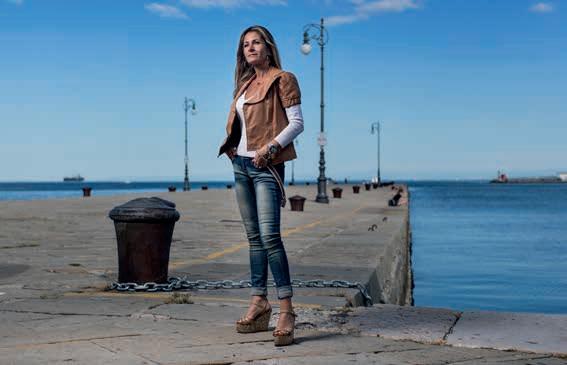
Federica Suban, gestore della storica ‘ Trattoria Suban’, continua la tradizione di famiglia realizzando ricette antiche ed esaltando i prodotti del territorio come i saporiti formaggi di Zidarič, a Prepotto. –
Federica Suban is the manager of the historic ‘Trattoria Suban’, which continues the family tradition by creating ancient recipes and exalting local products such as the tasty cheeses of Zidarič, in Prepotto.
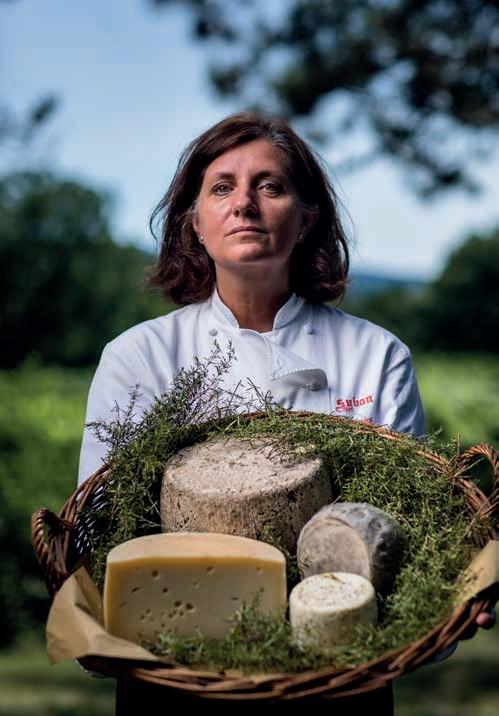
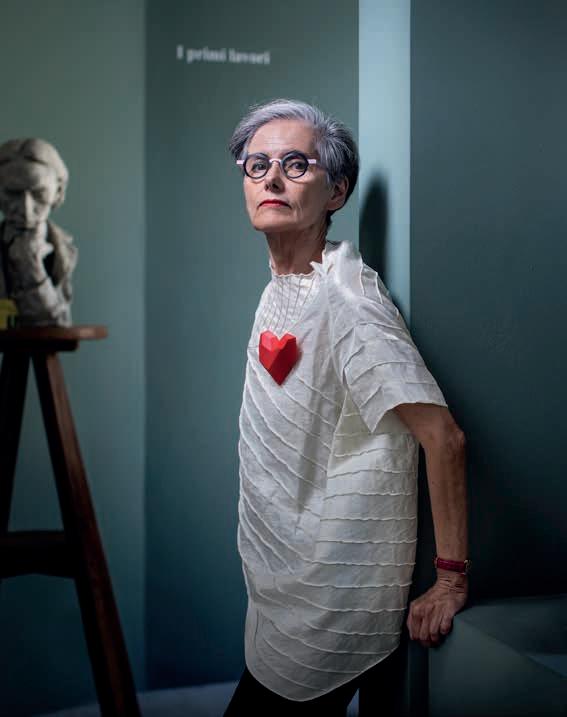
Laura Carlini Fanfogna, Direttrice dei musei e delle biblioteche di Trieste, in “mostra” tra le splendide opere della galleria dell’artista Ruggero Rovan al museo Revoltella, uno scrigno d’arte moderna e residenza del barone omonimo.
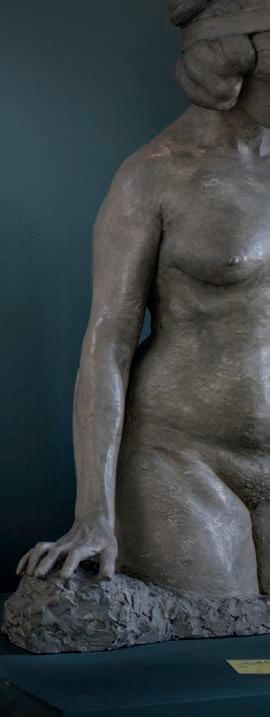
–Laura Carlini Fanfogna, Director of the museums and libraries of Trieste, in “exhibition” among the splendid works by artist Ruggero Rovan at the Revoltella museum, a treasure chest of modern art and residence of the Baron, bearing the same name
Fotografo freelance con base a Trieste, dove è nato nel 1974, Giuliano Koren ha studiato progettazione grafica e comunicazione visiva all'Istituto Superiore per le Industrie artistiche di Urbino, frequentando, grazie all'Erasmus, il corso di fotografia presso la University of Plymouth in Inghilterra. Qui ha potuto approfondire gli studi sull'approccio documentaristico, la stampa a colori e in bianco e nero.
Dal 2008 si occupa di fotogiornalismo, fotografia di ritratto, editoriale, pubblicitaria e commerciale. Ha pubblicato su testate come: L’Espresso, Vanity Fair, TIME, Stern, D La repubblica delle donne, Wired, D casa, Focus, Internazionale, Panorama, Sportweek.
–
Giuliano Koren is a freelance photographer based in Trieste, where he was born in 1974. He studied graphic design and visual communication at the Istituto Superiore per le Industrie Artistiche in Urbino, attending, thanks to Erasmus, the photography course at the University of Plymouth in England. Here he was able to deepen his studies on documentary approach, colour and black and white printing. Since 2008 he has been involved in photojournalism, portrait, editorial, advertising and commercial photography. He has published in newspapers such as: L’Espresso, Vanity Fair, TIME, Stern, D La repubblica delle donne, Wired, D casa, Focus, Internazionale, Panorama, Sportweek.


Una volta mi hanno chiesto come mai tanti giovani triestini se ne vanno all’estero. Ho risposto che il triestino è tremendamente curioso. È nel suo codice genetico. Il mare davanti, velista nell’anima, non può che essere attratto dal viaggio, dalle avventure. Molto spesso semplicemente torna perché Trieste è un gioiello bellissimo. Puoi allontanarti ma continua a urlarti nel cuore, sempre.
Amo la mia città profondamente, visceralmente. Non mi interessa il guadagno economico, mi interessa creare ricchezza in termini di cultura, da lasciare al mondo e alla mia città e a tutti i creativi e non creativi amanti della bellezza del mondo. Quando ho
iniziato a pensare e costruire ITS oltre vent’anni fa Trieste, bella e sfrontata, si impossessò di tutta la mia determinazione. Volevo darle un evento, cucirle addosso un vestito per mostrarsi al mondo e fargli girare la testa, com’era giusto che fosse. Gli ospiti e la stampa internazionale ne rimangono estasiati, l’hanno definita bella, raffinata, affascinante. ITS la veste di creatività, internazionalità, autenticità ed energia grazie ai giovani talenti che selezioniamo in tutto il mondo.
Ben lontana dai fenomeni tradizionali della moda, è un osservatorio privilegiato che permette una chiarezza di pensiero difficile altrove. Al centro dell’Europa, ha una storia di intrecci
culturali che ITS semplicemente ricalca. Anni fa Colin McDowell –giornalista, The Sunday Times– disse “mi domando come mai la vostra città non abbia già una sua vera e propria fashion week”. Forse è proprio questo il nostro pregio, non aver dato a Trieste una fashion week bensì qualcosa di unico e difficilmente replicabile. Blond Salad, il blog di Chiara Ferragni ha scritto: “Utopia: quell’ordine ideale, politico, morale e religioso impossibile da realizzare nel mondo reale. Chiunque abbia scritto questo probabilmente non ha mai visto Trieste e non ha mai incontrato Barbara Franchin.”
Colpisce la descrizione data da CNN: “Benvenuti a Trieste, la

piccola città italiana che vi rifà il guardaroba. Sul confine con la Slovenia nell’estremo nord-est italiano, la misteriosamente nascosta Trieste per alcuni giorni all’anno è anche uno dei luoghi più importanti del pianeta per scoprire le prossime grandi novità nel mondo del design della moda.”
Quest’anno ITS necessariamente si trasforma, non potendo accogliere fisicamente il mondo a Trieste. Al tempo stesso, la pandemia rafforza quel senso di appartenenza del nostro network globale, che non conosce ostacoli e ha scelto comunque di incontrarsi virtualmente il 23 Ottobre. ITS 2020 sarà un fashion film che presenteremo in streaming. Sorprenderà nei contenuti, raccontando i progetti dei 32 giovani talenti
selezionati quest’anno. Guardando al prossimo anno, a ITS Arcademy.
ITS Arcademy sarà una palestra per la creatività. Inclusiva, trans-generazionale, aperta al mondo. Riunirà in un unico luogo tutto ciò che ITS ha raccolto rendendolo accessibile, tutto l’anno. Diversificherà l’offerta culturale di Trieste attirando turisti e visitatori. Creerà posti di lavoro. Guarderà al futuro delle innovazioni sostenibili senza abbandonare l’artigianato tradizionale e trasmettendo conoscenze e competenze alle generazioni future.


ITS Arcademy non sarà nostro. Sarà di Trieste, del nostro paese e del mondo. Per questo abbiamo già iniziato a raccontarvi il “Making of” attraverso un sito-diario: itsarcademy.org.
Once I was asked why so many young people leave Trieste to go abroad.
I replied that the Triestini are incurably curious. It is in their blood. Growing up with the sea before them, a constant tailwind in the sails of their hearts, they are inevitably drawn to journey and adventure. Yet they often come back, because Trieste’s power of attraction is stronger. You can travel far, reach the opposite end of the world, but the voice of Trieste will always be calling, loud and clear, from within your heart.
My love for Trieste is deep, almost visceral. Making money has never been as important to me as creating cultural wealth, my own legacy to the world and my city, the bequest I leave to fellow creative and non-creative minds, to all those who love the beauty of the world.
Over twenty years ago, as I was starting to conceive ITS (International Talent Support), seductive and brazen Trieste seized control of my determination. I wanted to give her a show, I wanted to sew a dress for her to wear and make the world fall head over heels for her, and rightly so. Our guests, the international press everyone is captivated by Trieste’s sophisticated beauty and charm. ITS is
“ITS veste la città di Trieste di creatività, internazionalità ed energia grazie ai giovani talenti che selezioniamo in tutto il mondo.”
“ITS dresses up the city, draping her in creativity, international flair and pure energy, thanks to the young talents we select from all over the world.”
her dress, draping her in creativity, international flair, genuine beauty, and pure energy, thanks to the young talents we select from all over the world.
Trieste has no real connection to the mainstream of traditional fashion hubs, which makes her a privileged observation point, where minds can think clearly, free of any influence. The city lies in the very heart of Europe, a crossroad of cultures that are mirrored in ITS. A few years ago, Sunday Times’ chief fashion writer Colin McDowell commented “I wonder why your city [Trieste] does not have her own fashion week yet”. Perhaps this is the true asset of Trieste: no traditional fashion week, but rather something unique, almost impossible to replicate. In her blog Bond Salad Chiara Ferragni wrote: “Utopia: an ideal political, moral, and religious system that cannot exist in the real world. I suspect that whoever came up with this idea must have never seen Trieste or met Barbara Franchin.”.
One of my favourite quotes is the following CNN description: “Welcome to Trieste, the tiny Italian city that shapes the world’s wardrobe. Nudging the border with Slovenia in Italy’s far northeast, the mysteriously underrated city of Trieste […] for a few days every year in July, it’s also one of the most important places on the planet to discover the next best thing in the world of fashion design.” [By George Webster, CNN updated 4:54 PM EDT, Thu July 24, 2014]
Now ITS must undergo some changes, as Trieste cannot physically welcome the world this year. And yet, despite the ongoing pandemics, or rather precisely
because of it, we have an even stronger sense of belonging to our global network, which knows no boundaries and chose to come together virtually on 23rd October. ITS 2020 is going to be a fashion film that will stream online. An extraordinary concept, whose content is entirely devoted to the projects of this year’s 32 finalists, as we look forward to next year’s ITS Arcademy.
ITS Arcademy will be a creativity training ground, a place of inclusion and cooperation across generations and national boundaries. The creative archive that ITS has been collecting over the years will be made accessible in its entirety and all year round. It will enhance Trieste’s increasingly diversified cultural offer, a new tourist attraction for our visitors. It will provide jobs. It will bring together sustainable innovation and traditional handicraft, disseminating knowledge and providing future generations with an invaluable skill repository.ITS Arcademy is not going to be ITS’ exclusive property. It will belong to Trieste, our country, and the whole world. This is the reason why we want to share with you every step of its Makingof via our web diary: itsarcademy.org.
Barbara Franchin
Barbara Franchin è fondatrice e anima di ITS (International Talent Support), concorso per giovani stilisti che si svolge a Trieste dal 2002.
Nata e cresciuta a Trieste, città lontana dalle capitali consolidate del design, dal 2016 è inclusa nel prestigioso elenco BoF500 di Business of Fashion.
ITS è cresciuto a tal punto da diventare uno dei contest tra i più autorevoli a livello mondiale per talenti emergenti del fashion, del design di accessori e di gioielli.

–Barbara Franchin is the founder and very soul of ITS (International Talent Support), the famous contest for young fashion designers taking place in Trieste since 2002.
Born and raised in Trieste, Barbara Franchin grew up far from the fashion capitals of the world, and yet her achievements have earned her a spot in Business of Fashion’s BoF500 index since 2016. ITS is now one of the world’s most renowned emerging talent competitions in the field of fashion, accessory, and jewellery design.

“ITS Arcademy sarà una palestra per la creatività. Inclusiva, trans-generazionale, aperta al mondo.”
“ITS Arcademy will be a creativity training ground, a place of inclusion and cooperation across generations and national boundaries.”


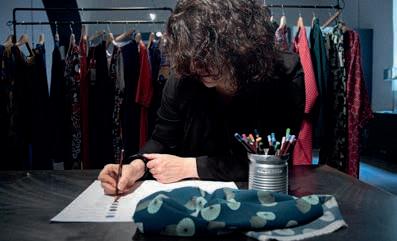
Una linea di abiti e accessori per vestire ogni donna indipendentemente dalle sue forme, dal suo carattere e dalle sue occasioni d’uso. Uno stile unico, senza tempo, svincolato da tendenze e mode del momento.
La linea Stranomavero nasce dal sogno di Antonella Caprioli: offrire alle sue clienti degli abiti versatili che possono essere indossati dal mattino presto per andare in ufficio fino a sera inoltrata, per un aperitivo con gli amici o una cena più formale, cambiando gli accessori. Come le estrose collane da cui è nata la linea nel 2007, capaci di rivoluzionare lo stile dello stesso abito o di rendere ricco di personalità anche il completo più minimale. Un modo di vestire al femminile frutto di una ricerca continua, per fornire a tutte un’esperienza diversa e speciale.
Una linea che è nata nel 2007, con gli splendidi bijoux, che Antonella realizza a mano e che fin da subito registrano un grande successo e a cui affianca, un po’ alla volta, anche capi selezionati di brand scelti. Ma stagione dopo stagione scopre che i grandi marchi della moda propongono soprattutto tendenze
e stili legati a un determinato periodo. Anche le taglie dei vari campionari, sono poche, quelle “standard”. E non è ciò che Antonella vuole. L’idea è di vestire tutte le donne, in ogni momento dell’anno, dalla quotidianità alle grandi occasioni. Antonella vede davanti a sé abiti in grado di donare sensazioni positive. Vuole essere a fianco delle sue clienti, infondendo loro forza e coraggio, con abiti capaci di esaltare lo stile personale di ognuna, al di fuori delle mode del momento.
Nel 2016 un nuovo passo avanti. Antonella conosce Michela Panzeri, specializzata nella realizzazione di camicie. Inizia una collaborazione proficua, che tuttora continua, e che dà vita al primo modello realizzato insieme, che entrambe decidono di chiamare Trieste, in omaggio alla città che le ha fatte incontrare a cui seguirà presto anche il modello Antonella. Nel 2018 con la collezione Norma, in pura seta comasca al 100%, voluta in ricordo della madre che allo stesso tempo è una storia fatta di amore e affetto, alla linea di camicie si affiancano anche dei pantaloni e un abito.
Anno dopo anno cresce l’attenzione nella scelta dei tessuti, sempre italiani,
che devono essere confortevoli sul corpo, capaci di abbracciarlo, come una morbida carezza che non ti fa mai sentire scomoda o a disagio. Con questo obiettivo, Antonella si fa guidare dalle emozioni che i tessuti le regalano, dal tatto, dalla sensazione che dona alla pelle, passando poi alla vestibilità e alla scelta di colori e fantasie, per dare struttura e personalità anche ai tagli più essenziali.
Ai bijoux e agli abiti si affiancano poi i sandali. E anche qui nulla è lasciato al caso. Le calzature vengono create in esclusiva da un artigiano pugliese, per esaltare quel “made in Italy” invidiato da tutto il mondo, e per continuare a valorizzare la professionalità di chi mette in campo amore e passione nel proprio lavoro.
Quello che caratterizza la linea Stranomavero, che oggi conta anche capispalla e diversi accessori, non è solo l’attenzione alla scelta dei tessuti e dei modelli, ma anche la cura delle rifiniture, un altro dettaglio a cui molti brand della moda non prestano più la stessa attenzione che in passato.
“Eppure sono proprio le rifiniture, un'asola ben tagliata, il collo di una
camicia che cade a pennello, la precisione delle cuciture, a fare la differenza”, dice Antonella.
“Ogni donna che indossa uno degli abiti che scelgo per la mia collezione, si deve sentire a suo agio, deve trovare linee adattabili alla sua fisicità, versatili, ma allo stesso tempo non convenzionali e ricchi di personalità”. Abiti che Antonella propone nel suo negozio di via Felice Venezian, da qualche mese aperto anche con la nuova modalità dell’appuntamento, per chiunque voglia immergersi in un’atmosfera più rilassata per trovare non solo il modello più adatto, ma anche abbinamenti personalizzati che solo l’intimità che l’armadio aperto di un’amica e i suoi racconti ti possono dare.
IA line of clothes and accessories to dress every woman regardless of her shape, character and occasions of use. A unique, timeless style, free from the trends and fashions of the moment.
The Stranomavero line was born from Antonella Caprioli’s dream: to offer her clients versatile clothes that can be worn from early morning to the office until late at night, for an aperitif with friends or a more formal dinner, by changing accessories. Like the whimsical necklaces from which the line was born in 2007, able to revolutionize the style of the same dress or to make even the most minimalist outfit rich in personality. A feminine way of dressing that is the result of continuous research, to provide everyone with a different and special experience.
A line that was born in 2007, with the splendid bijoux, that Antonella makes by hand and that from the very beginning have been a great success and to which she also adds, little by little, selected

garments from selected brands. But season after season she discovers that the great fashion brands mainly propose trends and styles linked to a specific period. Even the sizes of the various collections have only few “standard” ones. And this is not what Antonella wants. The idea is to dress all women, at any time of the year, from everyday life to big occasions. Antonella desires clothes able to give positive sensations. She wants to be at the side of her clients, instilling them with strength and courage, with clothes able to enhance the personal style of each woman, regardless of the current fashion.
In 2016 a new step forward. Antonella meets Michela Panzeri, specialized in the production of shirts. A fruitful collaboration begins, which continues still today, and gives life to the first model made together, which they both decide to call Trieste, in homage to the city that made them meet and which will soon be followed by the Antonella model. In 2018 with the Norma collection, in 100% pure Como silk, designed in memory of her mother, that is a story made of love and affection, the shirt line is completed by trousers and a dress.
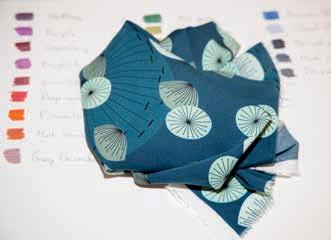
Antonella si fa guidare dalle emozioni che i tessuti le regalano.
Antonella is guided by the emotions that fabrics give her.
Year after year the attention grows in the choice of fabrics, always Italian, which must be comfortable on the body, able to embrace it, like a soft caress that never makes you feel uncomfortable or uneasy. With this aim, Antonella is guided by the emotions that fabrics give her, by the touch, by the sensation they give to the skin, then by the fit and the choice of colours and patterns, to provide strength and personality even to the most essential cuts.
Bijoux and dresses are matched by sandals. And here too nothing is left to chance. The shoes are created exclusively by an Apulian artisan, to enhance the “made in Italy” envied by the whole world, and to continue to enhance the professionalism of those who put love and passion into their work.
What characterises the Stranomavero line, which today also includes outerwear and various accessories, is not only the attention paid to the choice of fabrics and models, but also the attention paid to details, another aspect to which many fashion brands no longer pay the same attention as in the past.
“Yet it is precisely the finishing touches, a well-cut buttonhole, the collar of a
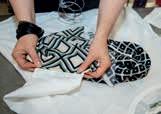
shirt that falls like a brush, the precision of the seams, that make the difference,” says Antonella.
“Every woman who wears one of the dresses I choose for my collection must feel at ease, must find lines that are adaptable to her body, versatile, but at the same time unconventional and full of personality”. Dresses that Antonella proposes in her shop in via Felice Venezian, which has been open for a few months now also with the new appointment method, for anyone who wants to immerse themselves in a more relaxed atmosphere to find not only the most suitable model, but also personalised combinations that only the intimacy that a friend’s open wardrobe and her stories can give you.
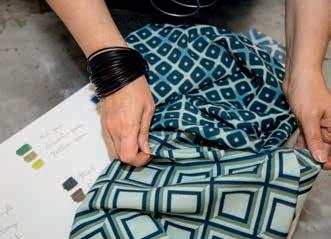
“L’idea è di vestire tutte le donne, in ogni momento dell’anno, dalla quotidianità alle grandi occasioni.”
“The idea is to dress all women, at any time of the year, from everyday life to big occasions.”
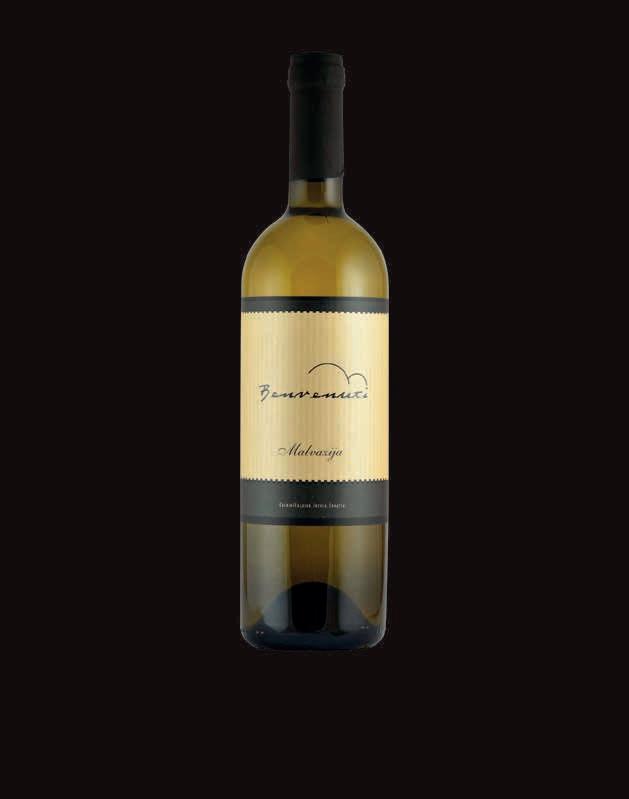


ra il lontano 1898 quando all’Esposizione internazionale dell’arte culinaria a Trieste, Caterina Prato venne insignita con Diploma d’onore e medaglia d’oro per il suo prezioso “Manuale di cucina”. Contributo molto importante di una donna che, con metodo e diligenza, ha raccolto dalle famiglie e dai ristoranti che frequentava, le migliori ricette che meglio rappresentano la nostra cucina. E come non volgere l’attenzione all’amica Mady Fast che, con la passione e la raffinatezza che la contraddistinguono, nel suo libro “Trieste a tavola”, spiega anche ai meno avvezzi l’origine e le caratteristiche dei piatti della cucina tergestina. Oggi, girovagando per il Carso, Vesna Gustin ci fa rivivere le tradizioni delle feste attraverso alcuni piatti ormai introvabili, con “Xè più giorni che luganighe”.
Nella mia famiglia, alcune ricette o, meglio, alcuni segreti, non si trovano nei libri sopracitati ma sono tramandate da generazione in generazione alle figlie primogenite come dote per il loro matrimonio.
Una di queste è la ricetta della “Putiza”, dolce dai profumi di lievito, noci, miele e cioccolato che anch’io ho ricevuto in dono da mia zia Dani. Ma i libri, gli appunti di cucina e i tanti format televisivi non sono in grado di evocare sensazioni e emozioni quanto il profumo. Ed è proprio attraverso questo
speciale strumento che vorrei condurvi alla scoperta delle pietanze della cucina triestina. Il profumo salmastro che si mescola a l’aromaticità del caffè appena tostato, in prossimità del porto, un caleidoscopio di aromi e spezie che arrivati dal mare da terre lontane, creano strane miscele conferendo unicità alle nostre pietanze.
A Trieste convivono armoniosamente due cucine, quella marinara con il pesce azzurro e il re “sardone” che marinato con un po’ di finocchietto ti fa sentire il mare a primavera o nel freddo inverno e quella dell’entroterra che, con i crauti o, meglio, i “capuzi garbi”, le patate, i fagioli e l’affumicatura del maiale crea la regina delle zuppe la “Jota”, in grado di riscaldare gli animi e non solo, nelle giornate sferzate dalla gelida bora.
Camminando tra i muretti a secco e le rosse foglie di sommacco sentirete i profumi della santoreggia e del ginepro che sono la base per il “pais”, la marinatura per la cacciagione e per il “Golas” di cinghiale accompagnato ai morbidi “Gnochi de pan”.
Per rinfrancarsi dopo una bella passeggiata seguite il profumo del lievito del pane caldo e dell’affumicatura del prosciutto in crosta con kren, abbinato con pane nero e del “Liptauer”, formaggio mantecato con paprica, capperi, cipollina e un buon bicchiere di Terrano.
Tra le stradine di “Città vecia”, in
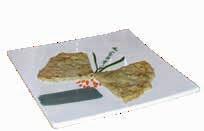
“Alcune ricette sono tramandate da generazione in generazione alle figlie primogenite come dote per il loro matrimonio.”
“Some recipes are passed on from one generation to the next, whose secret is revealed only to firstborn daughters as part of their dowry.”Palacinke alla mandriera
particolar modo la sera della vigilia di Natale, si potrà sentire i profumi del baccalà mantecato con l’olio d’oliva, la frittura delle “Passere coi ovi” e del “Risoto coi caperozzoli”.
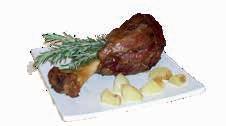
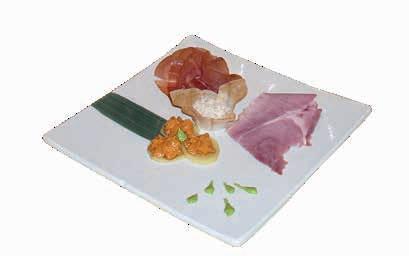
La vera essenza della mitteleuropa e della multietnicità della nostra città è ben rappresentata nella pasticceria. Proprio nei dolci delle storiche pasticcerie respiriamo il profumo che ci contraddistingue: anice, mandorle, noci, cacao, miele, lievito, burro, un mix che attesta le influenze di tante cucine che in tanti secoli si sono fuse alla perfezione generando dei piatti unici.
Assaggiando la “Rigojanci”, dolce morbido al cioccolato, sarete trasportati in una travolgente storia d’amore tra un violinista e una donna bellissima! E che dire del “Presnitz”, croccante pasta sfoglia ripiena di noci, miele, pinoli, uva passa, dolce creato per la Principessa Sissi che a suon di valzer degustava questa prelibatezza dai sentori mediorientali. Come Trieste anche la sua cucina
“ha una scontrosa grazia”, un mix perfetto tra acidità e dolcezza che si trova negli “Gnochi de susine”, una delle sue massime espressioni dove il dolce delle patate, dello zucchero, del profumo della cannella attenua l’acidità delle piccole prugne che maturano ad agosto negli orti triestini. Un piccolo percorso guidati dal naso alla scoperta dei piatti della nostra cucina.
It was the year 1898 and the city of Trieste was hosting the International Exhibition of Culinary Art, when Caterina Prato was awarded with both a Diploma of Honour and a golden medal for her invaluable “Manuale di cucina” [cooking manual]. And, indeed, the value of her manuscript is still acknowledged today, as thanks to her methodical and diligent effort she was able to collect the most representative recipes of the local culinary tradition as interpreted by the families and restaurants she used to frequent. Another important woman’s contribution to the preservation of Trieste’s culinary history is the volume “Trieste a tavola” [Trieste at the table] by refined author and IES friend Mady Fast, who explains the origins and characteristics of Trieste’s traditional recipes with passion and clarity. Today, Vesna Gustin’s “Xè più giorni che luganighe ” [lit. There are more days than sausages old local saying suggesting that material goods need to be consumed slowly and carefully, as they are rarely abundant and may therefore run out before one’s life ends N/T] takes the reader on a journey through the Karst Plateau and history, offering an itinerary through traditions, local festivities,
and long-forgotten recipes.
Not all my family’s recipes or, rather, secrets are found in the above-mentioned books: they are the ones that are passed on from one generation to the next, whose secret is revealed only to firstborn daughters as part of their dowry.
One of such family treasures is our own “Putiza” recipe, a dough pastry carrying the scent of yeast, walnuts, honey, and chocolate a family secret passed on to me by my aunt Dani. There are no books, culinary notes, or TV formats able to evoke memories and emotions as intensely as the scent. This is the reason why I chose scent as our guide in this brief journey through Trieste’s culinary tradition. The briny aroma of the sea enveloping the harbour and dancing with the scent of freshly roasted coffee, in a kaleidoscopic whirlwind of aromas and essences that travelled from distant lands all the way across the sea… this is just an example of the peculiar blends that make our recipes so unique.
Trieste is home to two culinary traditions, coexisting here in perfect harmony: on the one hand, there is seafood cuisine, focusing mainly on bluefish [i.e. fatty, oily fish], and most notably Sardone, the king of local bluefish, traditionally marinated with a ground of wild fennel able to evoke the scent of the sea both in spring and on a cold winter day;
on the other hand, there is inland cuisine, with its sauerkraut better known as “ capuzi garbi” by the locals, potatoes, and beans, as well as the rich and varied tradition of pork meat smoking, which gave birth to the Jota, the queen of all soups, able to warm up both belly and soul in the icy cold of a Bora-swept winter day.
As you walk alongside the low drystone walls, immersed in the red-tinted atmosphere of elm-leaved sumach groves, you can smell the scent of savoury and juniper, basic ingredients of many preparations, such as Pais, namely the local marinade for game, or boar Golas, the traditional soup of seasoned boar meat and vegetables, usually served with soft Gnochi de pan [lit. bread dumplings].
If you are looking for an invigorating treat after your stroll, you only need to follow the scent of freshly made bread and Prosciutto in crosta, namely smoked ham baked in dough wrap and horseradish, usually served on rye bread, with Liptauer (cheese spread spiced with paprika), caper buds, pickled onions, and a brimming glass of Terrano.
On Christmas Eve the alley maze of “Città vecia”, the oldtown, fills with the aroma of Baccalà mantecato [i.e. salted codfish whipped in olive oil], Passere coi ovi fish fry [i.e. egg batter pan-fried flounder fish], and Risoto coi caperozzoli [i.e. risotto with clams].
Trieste’s mitteleuropean spirit, as
well as the city’s multi-ethnic landscape, is well represented in the local pastry-making tradition. Once again, it is the scent emanating from the local pastry shops that reveals the various phases of Trieste’s history: anise, almond, walnut, cocoa, honey, yeast, butter… each witnessing the influence of a specific culinary tradition, and all merging into a perfect blend, able to give life to unique delicacies.
A single mouthful of Rigojanci , a soft combination of chocolate sponge cake and chocolate cream pastry, will tell you of the passionate love story between a violinist and a beautiful damsel. The sweet magic of Trieste’s patisserie continues with another local delicacy, namely the Presnitz: crispy rolls of puff pastry with a mouth-watering filling of walnuts, honey, pine nuts, and raisin, the Presnitz was created to honour Princess Sissi, who loved to listen to her waltz music while enjoying this delicacy and its exotic taste. Like Trieste, local cuisine has its own kind of “surly grace”, a rude charm resulting from the perfect mix of sweet and sour, for example, of Trieste’s famous Gnochi de susine [lit. plum dumplings], which combine the sweetness of potatoes, sugar, and cinnamon scent with the sourness of the tiny plums that ripen in August in the city’s vegetable gardens.
A short, nose-guided tour to discover the wonders of Trieste’s culinary tradition.
Federica Suban, presidente della FIPE Trieste, è responsabile del settore culinario della storica “Antica Trattoria Suban” presente a Trieste fin dal lontano 1865. Assieme a sua sorella Giovanna, responsabile del servizio, prosegue il lavoro di suo padre Mario e della sua famiglia, protagonista indiscussa della storia della cucina triestina da oltre 150 anni. Fu Giovanni Suban ad aprire il locale nel rione di San Giovanni e a tramandare di generazione in generazione la tradizione gastronomica triestina.

–
Federica Suban is president of the Trieste’s chapter of FIPE [lit. Italian Federation of Public Establishments] and local businesswoman, currently in charge of the foodrelated aspects of her family’s business “Antica Trattoria Suban”, one of Trieste’s most iconic restaurants, founded in 1865. Together with her sister Giovanna, who is in charge of the service sector of the restaurant, they follow in the footsteps of their father Mario and the rest of the family, whose name has been at the forefront of Trieste’s culinary tradition for over 150 years. It all started with Giovanni Suban, who opened the Trattoria in Rione San Giovanni and started to pass on Trieste’s culinary tradition from one generation to the next.
 Rigojanci
Rigojanci
“La vera essenza della mitteleuropa e della multietnicità della nostra città è ben rappresentata nella pasticceria.”
“Trieste’s mitteleuropean spirit, as well as the city’s multi-ethnic landscape, is well represented in the local pastry-making tradition.”
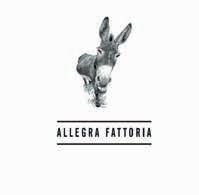
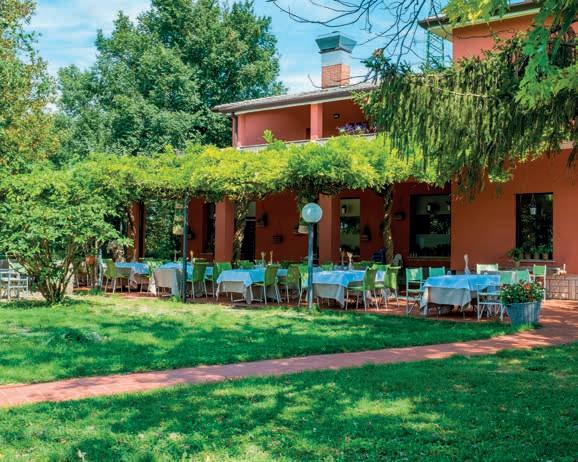
Bella forse bellissima. Fortunata, per una posizione geografica straordinaria. Intensa, per la sua storia di confine. Solare, per la natura di chi la vive, per la voglia di mare e di vita. E contemporaneamente gelosa, della sua bellezza e qualità di vita. Modesta, nei suoi slanci di innovazione e futuro. Poco ambiziosa perché alla fine si basta. Così vedo la mia Trieste, con amore e con severità per le sue occasioni perdute.
Un amore da triestina autoctona che continua ad incantarsi con i tramonti sul mare più belli del mondo, che passeggia con il naso all’insù scoprendo qualcosa di nuovo, che si emoziona rientrando a Trieste con il panorama dall’Obelisco. Ma accanto questo anche una severità da imprenditrice turistica, che vede le straordinarie opportunità di una città che potrebbe ridisegnare il suo futuro con progettualità a lungo termine, creare grandi opportunità turistiche e culturali.
Ma la qualità della vita qui, in questo angolo speciale del Nord Est, è tale che preferiamo custodirla e tenerla per noi. E forse c’è una ragione anche in questo. I miei posti del cuore? Ogni
giorno mi trovo a camminare per il viale XX Settembre, uno dei posti della città che secondo me la riassumono e la definiscono meglio. Un viale con il respiro dei grandi viali alberati europei, un luogo animato e pieno di vita nella storia con i suoi palazzi dei primi dell’800, oggi luogo bello ed immobile nel suo sviluppo, che sembra reclamare una maggiore attenzione. Un po’ via della cultura, tratto importante della triestinità, perché qui nacque Italo Svevo, qui fra gli alberi svetta il nostro teatro di prosa, il Politeama Rossetti e i nostri cinema frequentatissimi.
Nella Città Vecchia c’è, invece, una piccola via che serpeggia fra le sue case colorate, con tanti scuri bianchi alle finestre ed il sole che sembra voler giocare negli spiragli fra i muri. Si chiama via dei Cavazzeni; avrò centinaia di foto di questo angolo che sembra trasportare nella Trieste di cent’anni fa, attiva, brulicante, piccante curiosamente. La vedo allora ricca di vitalità di belle donne di allegria, oggi invece più tranquilla, in una zona della città che ha avuto una delle riqualificazioni urbanistiche più riuscite. Una zona vitale e giovane, che si muove e si ridisegna con il tempo.
“È al Porto Vecchio che batte il mio cuore. Il mio posto speciale in cui storia, vecchio porto, mare, archeologia industriale si intrecciano.”
Ma è a Porto Vecchio che batte il mio cuore. Il mio posto speciale in cui storia, vecchio porto, mare, archeologia industriale si intrecciano. Ma qui l’oggi non ci sta più, qui è il nostro domani. Da affrontare stavolta senza compromessi, senza gelosie e senza alcuna mediocrità. Non accontentiamoci e ripartiamo grandi da qui.
“My heart beats in Porto Vecchio.This is my true place of the heart, where history, industrial archaeology, the old port, and the sea intertwine.”
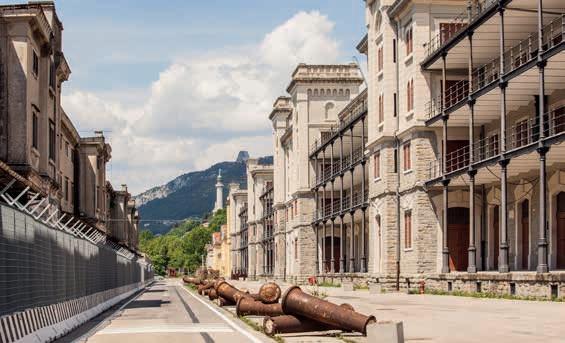
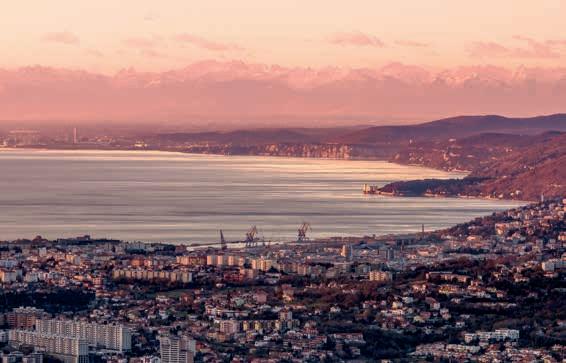
Beautiful, almost incredibly so. Blessed with an extraordinary geographic position. Intense, as is her history as border city. Sunny, as those who live for her, as their love for life and the sea. But also jealous, of her beauty and her quality of life. Unpretentious in her forward leaps towards innovation. Content, because, after all, she is self-fulfilled. This is how I see my Trieste, with loving eyes yet unforgiving for her missed opportunities.
Mine is the love of a Triestina born and bred, who keeps falling in love with the most beautiful sea sunsets in the world, who discovers something new every time she lifts her gaze during a stroll, and who feels her heart melting every time she looks down from the Obelisco and knows she is back home. Yet, next to all this, there is my entrepreneurial side, the woman working in the tourism business, who can see all the extraordinary opportunities of a city that could shape its own future and generate unparalleled cultural and touristic offers, if only it focused on long-term planning.
The truth is that the quality of life here, in this unique corner of north-eastern Italy, is such that we prefer to preserve it as it is and keep it for ourselves. And maybe this decision, too, has its own wisdom.
My places of the heart? I walk through Viale XX Settembre every day, and every day I become more convinced that this is one of the places that best define
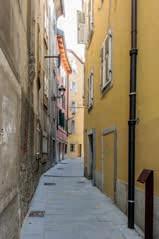
Trieste. Our Viale equals the scale of the great European tree-lined boulevards, it is lively and soulful, and rich of historical memory, with its early 19th century facades locked in a beautiful standstill, proudly demanding the consideration it is owed. It has a cultural side too, as far as the city’s spirit is concerned: Italo Svevo was born here; the tree tops brush the city theatre Politeama Rossetti; and Trieste’s numerous big screen enthusiasts find their destination right here.
Deep into the Città Vecchia [i.e. old town] there is a tiny alley, winding through colourful little houses with whitewashed shutters that twinkle whenever a ray of sun sneaks into a crack between the walls. It is Via dei Cavazzeni. I must have taken hundreds of pictures here, where Trieste seems to be a century younger, bustling, and curiously piquant. I can almost picture the alley then, so full of life, beautiful women, and merriment… it is pleasantly quiet today, as are its surroundings, thanks to one of Trieste’s most successful operations of urban requalification. Now this area is young and dynamic, changing its shape in accordance with the passage of time.
But my heart beats in Porto Vecchio. This is my true place of the heart, where history, industrial archaeology, the old port, and the sea intertwine. Here, in this place, today is already in the past; here lies our future. Without compromise, jealousy, or mediocrity. This one time let us not be content, let us start again from here.
Serena Cividin è titolare dell’agenzia Cividin Viaggi, storica agenzia turistica triestina nata nella stessa sede dell’azienda UTAT –le cui origini risalgono al 1934–e dove lavorava sin dal 1978 assieme ad altri 90 dipendenti. Nel 1971 la sua famiglia acquisì la maggioranza dell’azienda. Nel 2003 il marchio UTAT, dopo l’acquisizione da parte della società “Il Ventaglio” rimane a Milano e Serena, assieme al fratello Roberto ricrea nella stessa sede di via Imbriani l’attuale Cividin Viaggi.
Serena Cividin is the owner of Cividin Viaggi, Trieste’s iconic travel agency with its seat in the office of former travel agency UTAT, which was founded in 1934 and where Serena Cividin herself became a staff member in 1978, alongside 90 other colleagues. In 1971 Cividin’s family acquired the majority of the agency’s shares.
In 2003, after the acquisition of UTAT brand name by “Il Ventaglio” company, the business was moved to Milan, and Serena, together with her brother Roberto, purchased the office in Via Imbriani and founded Cividin Viaggi.

“Nella Città Vecchia c’è una piccola via che serpeggia fra le sue case colorate ed il sole che sembra voler giocare negli spiragli fra i muri...”
“Deep into the Città Vecchia there is a tiny alley, winding through colourful little houses that twinkle whenever a ray of sun sneaks into a crack between the walls...”
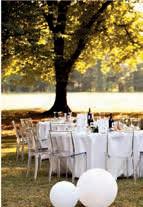
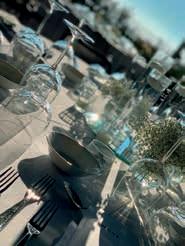
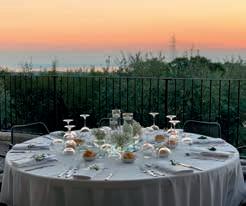

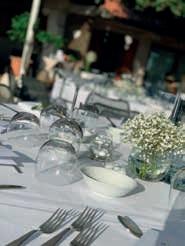
Trieste, buen retiro or sea port?
Chissà quante volte si sogna di cambiare casa per poter ricominciare; non solo nella stessa città, ma il più delle volte accade che ti innamori di un luogo che hai scoperto e cominci a coltivare il sogno di trasferirti.
Urban Real Estate, realtà nata nel 2008, può aiutarti a realizzare i tuoi desideri. I due soci, Roberto Pesavento e Lara Berdon, nel loro ufficio in via Mazzini, da 12 anni, con impegno e professionalità, vendono immobili su Trieste e territorio.“Cerchiamo di portare persone dal mondo a Trieste perché qui si vive bene” ci racconta Roberto. “Trattiamo tutti i clienti e tutti i generi di immobili, ma restando il più possibile in zona. Conosciamo il territorio e sappiamo offrire al cliente ciò che cerca. Che sia una casa da abitarci saltuariamente con la speranza di trascorrervi più tempo possibile o che sia un luogo dove trasferire la famiglia e da lì partire per viaggi di lavoro in tutto il mondo, noi cerchiamo di soddisfare le sue attese”. Non stentiamo a credere che i luoghi più ricercati siano il centro storico, il Corso, le rive, il Borgo Teresiano privilegiando le zone pedonali che facilmente ti permettono di raggiungere i luoghi

—
dello shopping, i musei, le piazze e assaporare la vita della città. Chi invece ama più la tranquillità e vuole vivere il mare fin dalla prima ora del risveglio ricerca la riviera di Barcola e la Costiera. Anche il Carso ha il suo pubblico: la particolare identità della zona che a tratti sembra un altro mondo per quanto sia interconnessa con la natura incontaminata la rende di un fascino difficilmente reperibile altrove.“Quando vendiamo casa
il nostro obiettivo è di chiudere l’operazione in maniera più serena possibile. Cerchiamo di levare le criticità in primis; abbiamo imparato che rispetto un tempo non basta semplicemente vendere un immobile. Bisogna essere attenti all’urbanistica, alla fiscalità o alla proprietà. Anche l’aspetto etico, che per noi è un modello di comportamento e non un elemento di marketing, ha sicuramente aiutato la crescita della nostra struttura che ci consente di realizzare gli attuali risultati avendo pure la fortuna che anche i nostri collaboratori, tutti agenti immobiliari professionali, hanno aderito volentieri alla filosofia Urban.”
“Cerchiamo di portare persone dal mondo a Trieste, perché qui si vive bene.”
“We try to bring people from all over the world to Trieste because we live well here.”
Who knows how many times you dream of changing home in order to start again; not only in the same city, but most of the time you fall in love with a place you have discovered and you begin to nurture the dream of moving. Urban Real Estate, a reality born in 2008, can help you make your dreams come true. The two partners, Roberto Pesavento and Lara Berdon, in their office in Via Mazzini, have been selling properties in Trieste and the surrounding area for 12 years, with commitment and professionalism. “We try to bring people from all over the world to Trieste because it is a good place to live,” Roberto tells us. “We deal with all clients and all kinds
The most sought-after locations? The historical centre, the waterfront, the Borgo Teresiano.
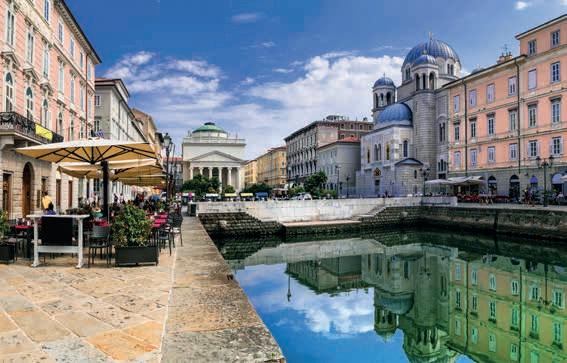
of properties, but we remain as close as possible to the area. We know the territory and we know how to offer our clients what they are looking for. Whether it is a house to live in from time to time with the hope of spending as much time as possible there, or a place where the family can move and from there go on business trips all over the world; we try to meet their expectations”.
We have no difficulty in believing that the most sought-after locations are the historical centre, the Corso, the
waterfront, the Borgo Teresiano, favouring pedestrian zones that allow you to easily reach shopping areas, museums, squares and enjoy the life in the city. Those who love tranquillity more and want to experience the sea from the first hour of the morning are looking for a place along the Riviera di Barcola and the Costiera. The Karst also has its public: the particular identity of the area, which at times seems like another world, so much integrated with unspoilt nature, provides such a charming atmosphere that it is hard to find elsewhere.
“When we sell a property our goal is to close the deal as smoothly as possible. We try to remove the critical points first and foremost; we have learned that compared to the past, it is not enough to simply sell a property. You have to be careful about town planning, taxation or ownership. Even the ethical aspect, which for us is a model of behaviour and not a marketing element, has certainly helped the growth of our business, enabling us to achieve our current results, and we are fortunate that our staff, all professional real estate agents, have also willingly embraced the Urban philosophy.”
I luoghi più ricercati? Il centro storico, le rive, il Borgo Teresiano.

Tutto inizia circa 28 anni fa, probabilmente la mia prima Barcolana. Sicuramente non ero il miglior membro d’equipaggio per la barca di famiglia ma l’esperienza e il ricordo di quell’avventura rimane indelebile. Mio papà, mia mamma, due amici di famiglia e io sulla nostra “Mezzamela”, un Dufour 1300 blu. La barca era sempre pronta per evitare incidenti durante la regata più numerosa al mondo, i parabordi circondavano lo scafo e mia mamma era a capo del parabordo di emergenza ai giri di boa. Non ricordo i dettagli ma penso mia mamma fossea capo anche della cambusa e degli ottimi panini di cotto caldo!
Il mio ruolo era quello di non cadere in acqua, avere sempre il salvagente e tenere le gambe sempre all’interno della barca... e certamente mangiare più panini possibili.
Mio papà era il comandante del piccolo 30 piedi, l’uniforme ufficiale per la seconda domenica di Ottobre era la polo Barcolana del colore dell’anno in corso rigorosamente ritirata da un negozio di abbigliamento qualche giorno prima e il suo cappellino da comandante.
Il rapporto con Trieste, il mare e la Barcolana rimane una delle cose più belle e forti della mia vita sportiva, i ricordi di quando ero bambina, il ricordo di mio papà in mare e la passione che mi ha trasmesso. Ho continuato ad andar per mare e inseguire i miei sogni per onorare il suo ricordo e la sua passione per il grande blu, la vela e la pace di ritrovarsi in mare con il solo suono delle onde.
Francesca Clapcich, 32 anni triestina, veste per IES i panni della portabandiera della vela al femminile di Trieste. Un’atleta cresciuta nel mare del nostro golfo sino a raggiungere la vetta più alta per uno sportivo: la partecipazione ai giochi olimpici. Un’impresa riuscitale per due edizioni consecutive: a Londra nel 2016 e quattro anni dopo ai giochi di Rio de Janeiro, dove ha sfiorato il podio con la compagna di gara Giulia Conti, piazzandosi al quinto posto. Proprio alla vigilia dei giochi brasiliani le è stato assegnato il “collare d’oro” del CONI per il titolo mondiale vinto a Rio de la Plata, sempre in coppia con la Conti nella classe olimpica 49er FX, ovvero lo skiff olimpico femminile.
Francesca Clapcich, 32, joins this issue of IES as standard bearer of Trieste’s women’s sailing world. Born and raised in Trieste, she started as a young sailing athlete in the city’s own gulf, setting her course to reach the most prestigious destination of this sport: the Olympics. She participated for the first time in 2012 London Olympics and, again, four years later, in Rio de Janeiro, where she and her team mate Giulia Conti almost made it to the podium, coming in fifth place. Right before Rio Olympics she was awarded CONI “golden collar” [highest distinction awarded by the Italian National Olympic Committee – CONI], to honour her victory, once again with Giulia Conti, at the 2015 49er FX World Championship, also known as the Women’s Olympic Skiff.
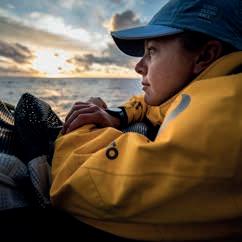
Essere donna e velista non è un connubio semplice, in particolare nel mondo della vela professionistico ma la passione e le lezioni di vita che ho imparato da piccola mi hanno permesso di fare di questa passione un mestiere.
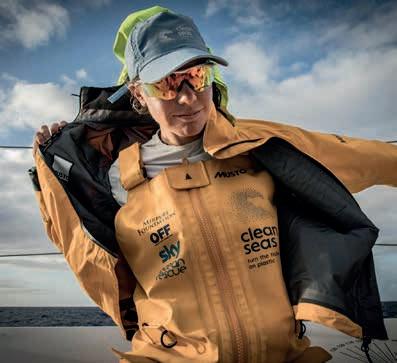
Ho partecipato a circa 20 edizioni, regatando su piccoli monotipi, maxi e cabinati di famiglia. Una delle mie ultime esperienze è quella a bordo del Maxi 90’ Golfo di Trieste come skipper. È stato un onore e un onere essere responsabile di un team di oltre 20 persone, tutte veliste con CV che variano da Olimpiadi, Giri del Mondo, regate offshore, inshore, derive e essere nella posizione di poter lottare per un grande risultato e dimostrare che il mare non riconosce sesso ma solo esperienza e professionalità.
Ho ricevuto messaggi, email e telefonate di supporto e di congratulazioni per aver portato un gruppo di atlete di quel calibro a Trieste e per essere riuscite a lavorare insieme a un gruppo di 10 giovani atlete fornendo un’esperienza incredibile.
Trieste, la Barcolana e il nostro mare sono tutto questo. Inclusione, diversity e equality, un grande mare che non conosce limiti dove ognuno di noi trova il suo spazio. Il mare, le onde, il vento sono forze molto più grandi di noi che meritano rispetto e non vedono le differenze di razza, sesso, età... siamo tutti uguali davanti al mare e così dovrebbe essere lo sport.
Il mio sogno è quello di veder crescere Barcolana ogni anno, vedere la regata come una forma di piattaforma dove tutti i velisti possano trovare il loro posto, dove ci siano sempre più veliste e equipaggi misti, armatori che supportino più veliste professioniste e ambienti positivi.
Trieste e Barcolana... Ottobre e bora... donne e uomini in mare... questa è la magia della nostra città ed è quello che ci portiamo dentro quando andiamo in giro per il mondo.
It all started 28 years ago, I believe it was my first Barcolana. Far from being the best sailor in my family crew, the whole experience meant all the more to me and I continue to cherish its memory. My father, my mother, two friends of the family, and myself, all aboard our Mezzamela, a blue Dufour 1300 racing sailboat, well equipped to prevent all sorts of accidents that may occur during the world’s biggest regatta: fenders all around the hull and my mother ready to run the emergency fender at every buoy turn. I may not remember correctly, but I do believe my mother was also responsible for the pantry and its delicious baked ham sandwiches! My tasks included trying not to fall
“Sicuramente non ero il miglior membro d’equipaggio per la barca di famiglia ma il ricordo di quell’avventura rimane indelebile.”
“Far from being the best sailor in my family crew, the whole experience meant all the more to me and I continue to cherish its memory.”
overboard, always wearing my life jacket, not letting my legs dangle… and, of course, stuffing myself with sandwiches.
As the captain of our 30 ft monohull, my father always wore his official Barcolana uniform: his commander hat and a newly purchased polo shirt, each year displaying the colours selected by the regatta sponsors.
The special bond that was forged in those days and still ties me to Trieste, the sea, and the Barcolana remains one of the best and most significant milestones in my sport life. My childhood memories of my father sailing the sea, the passion he was able to pass down to me these are the reasons why I kept on sailing and chasing my dreams: to honour his memory, his love for sailing and the deep blue sea, and that peaceful feeling of being in open waters, where the silence is broken only by the gentle lapping of the waves.
Being a woman and a skipper is not easy, especially in the world of professional sailing, but thanks to my dedication and the lessons I learned as a child I was able to turn my passion into my job.
Over the years I have taken part in some twenty editions of the Barcolana, sailing small monotypes, maxis, and family cabin cruisers. Lately, I participated as skipper of the 90 ft Maxi Golfo di Trieste. It was a great honour and an even greater responsibility, as I was in charge of a team of twenty women, all professional sailors, whose racing experience ranged from the Olympics, to round-the-world sailing voyages, inand offshore regattas,and dinghy races. It was also an unprecedent opportunity, as we were able to compete and try our hardest to bring home a great result, while also bearing evidence to the fact that sex differences are irrelevant at sea, where only skill and experience count.
I received countless text messages, e-mails, and phone calls, all expressing support and congratulations for
bringing this group of talented athletes to Trieste, for including and working side by side with ten young women sailors, and ultimately for delivering such an extraordinary performance.
Trieste, the Barcolana, and our sea are all this and more. Inclusion, diversity and equality, a sea without borders where every one of us finds their own space. Open waters, waves, and winds are forces much more powerful than us. They demand respect. They do not concern themselves with race, age, or sex, to them we are all the same. We are all equal to the sea, and the same should apply to sports.
My wish is to see the Barcolana grow bigger with every passing year, increasingly becoming a platform where every skipper finds their own place, where boats are sailed by a growing number of women and mixed crews, where more and more ship owners support young women athletes in other words, a truly inclusive regatta.
Trieste and Barcolana… October and Bora… women and men sailing the sea… this is the true spirit of our city, the magic we cherish and bring everywhere we sail.
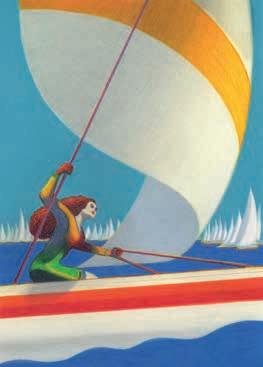
“Il mare, le onde, il vento sono forze molto più grandi di noi che meritano rispetto e non vedono le differenze di razza, sesso, età... siamo tutti uguali davanti al mare.”
“Open waters, waves, and winds are forces much more powerful than us and demand respect. They do not concern themselves with race, age, or sex... We are all equal to the sea.”Micol Brusaferro

Gily,
Marchi
Nata a Trieste si è spostata a Venezia per studiare. Innamorata della città lagunare ci è rimasta per 7 anni. Ha una laurea specialistica in Progettazione e Produzione delle Arti visive allo IUAV e ha cominciato a lavorare nell’arte contemporanea in ambito curatoriale. Sempre li è nata la passione per il gioiello di design. Da Venezia è volata a Londra e per due anni ha continuato a lavorare nell’arte, alimentando però sempre più la passione e la ricerca di artisti e spazi dedicati al gioiello. Da qui la decisione di rientrare a Trieste e prendere in mano l’attività di famiglia, una gioielleria classica fondata dalla nonna nel 1964 dal nome ‘Giada’, che ha reinterpretato dal 2014 con una selezione di gioielli contemporanei. Miti Caffè [1] (via di Torre Bianca 39/b). Dove mi sento sempre bene, dove amo concludere le giornate lavorative con un ottimo spritz, in un luogo che ormai percepisco come mio. Ma mi fermo anche per un caffè, magari nelle pause tra casa e lavoro. Enoteca Nanut [2] (via Genova 10/e). Mi piace il buon vino, e poi è il luogo ideale per portare chi arriva da fuori Trieste a vuole assaggiare una buona etichetta locale. Non ho nessuna preferenza in particolare, perché cambio a seconda della stagione, e mi faccio sempre consigliare dal titolare. Buffet Da Gildo [3] (via Valdirivo 20). Il mio buffet preferito, per la cucina locale, per la caldaia, anche per un pasto veloce, al volo, è la soluzione perfetta. Adoro in particolare il panino con la melanzana e il cotto in crosta. Anche qui mi piace portare gli amici che vengono a Trieste e in generale chi vuole provare i sapori triestini. Soba [4] (via Mazzini 14/a). Ha aperto dallo scorso anno, è un piccolo negozio che fa solo pezzi unici, su misura,
è una chicca, trovi cose che non si vedono facilmente. E la titolare è molto legata al territorio, alle tradizioni, in particolare a quelle del Carso. Utilizza tessuti naturali e io adoro soprattutto gli abiti e le camicie in seta.
Tempio serbo ortodosso [5] (via San Spiridione 9). Lo considero un luogo speciale, da scoprire, consiglio di entrarci, a chi ancora non l’ha mai fatto. Al di là della religione mi colpisce la sua bellezza, l’arte, l’ambiente in generale. Credo sia una tappa immancabile per chi visita la città.
–
Born in Trieste, Silvia Vatta moved to Venice to complete her studies. She fell in love with the lagoon city and decided to stay there for seven years. She earned her Master’s degree in Product and Visual Communication Design from IUAV - University of Venice and has worked as curator in the field of contemporary art. Her love for jewellery design was born there. She therefore flew to London, where she continued working in the arts field for the following two years, while delving into the world of design jewellery. Back in Trieste since 2014, Silvia has taken the reins of the family business, classic jeweller ‘Giada’, founded by her grandmother in 1964, renovating its display with her contemporary designs.
Miti Caffè [1] (via di Torre Bianca 39/b). This is where I always feel good, where I love to unravel sipping a delicious spritz at the end of a hardworking day a place I can call my own. It is also a perfect stop for a quick coffee, if I have just a short break.
Enoteca Nanut [2] wineshop (via Genova 10/e). I love good wine, and this is the perfect place to offer a taste of trustworthy local labels to visiting guests. I have no specific preference, mainly because my taste changes according to the current
I luoghi del cuore di Antonella Caprioli, Eugenia
Fenzi, Chiara
Gily, Chiara
Marchi e Silvia Vatta
The places dear to Antonella
Caprioli, Eugenia
Fenzi, Chiara
Chiara
and Silvia Vatta
season, but also because I trust the owner’s recommendations.
Buffet Da Gildo [3] (via Valdirivo 20). My favourite buffet of local cuisine and caldaia dishes, and the perfect place for a traditional meal as well as a quick bite. I cannot resist their panino melanzana e cotto in crosta (sandwich with eggplant and ham baked in bread crust). This is where I bring my friends visiting from outside Trieste, as well as guests wishing to taste local culinary traditions. Soba [4] (via Mazzini 14/a). This tiny shop was inaugurated last year and offers a limited selection of one-of-a-kind items –a real gem, a tiny treasure chest of rarities. The owner is very proud of her tight bond with the local territory, mainly the Karst and its traditions. She uses only natural fibres– my personal favourites are her silk dresses and shirts.
Serbian Orthodox Temple [5] (via San Spiridione 9). It is a special place for me, one that deserves to be discovered in silence my suggestion is to enter, especially if you have never been inside before. Aside from its religious significance, this temple possesses an unparalleled beauty, both in its structure and in its decorations. If you are visiting Trieste, I believe it is a must.

Nata e cresciuta a Trieste, dopo una parentesi di studio e lavoro in Spagna, con gioia e convinzione è tornata nella sua città natale. Dopo aver lavorato per la promozione e valorizzazione della sua amata Trieste, condivide con il suo compagno Alexandros, partner nella vita e negli affari, la gestione dell’Antico Caffè San Marco, anche se solitamente preferisce stare dietro le quinte. Da poco più di un anno è Capo delegazione del FAI, un impegno importante assunto, anche qui, per tutelare e far conoscere le bellezze paesaggistiche e architettoniche della città. Viale XX settembre [6]. La nostra rambla triestina, è vivace, piena di attività, ci sono tanti negozi, locali, trovi un po’ di tutto, e mi piace anche per una semplice passeggiata. Galleria Battisti 14 [7] (via Battisti 14). Un negozio di arredamento che reputo bellissimo, e la titolare cura con molta attenzione tutti i dettagli. C’è la linea Calligaris e poi mobili adattabili a qualsiasi casa, anche con piccole chicche davvero speciali. Giardino de Tommasini [8] (via Giulia 2). Questo Giardino Pubblico rappresenta un polmone verde in città, porto mia figlia a giocare, e anche per me è uno
sfogo, un’area tranquilla, dove potersi rilassare a pochi passi da casa e dal lavoro. Queen Salon Nails [9] (via Timeus 3). Questo salone per manicure e pedicure è diventato un punto di riferimento per tante persone in questa zona, non solo per i servizi forniti, ma anche per i gestori, simpatici e cordiali. Politeama Rossetti [10] (Largo G. Gaber 1). Sono particolarmente legata a questo splendido teatro, luogo di tante rappresentazioni, con il ricco calendario di spettacoli che ogni anno lo caratterizza. –
Born and raised in Trieste, after completing her studies in Spain, Eugenia Fenzi was excited and ready to come back to her hometown. She spent her early working years promoting local tourism and enhancing the profile of her beloved Trieste as tourist destination. She then moved on to the business field, taking over management of Caffè San Marco with Alexandros, her life and business partner. Although her tasks at the Caffé keep her mainly behind the scenes –which is precisely where she wants to be, last year she was nominated Head of Delegation of FAI [Fondo Ambiente Italiano, i.e. The National Trust for Italy), renewing her commitment to safeguard and promote Trieste’s beauty, landscape, and architecture.
Our own rambla, lively and busy with shops, cafés, and incessant bustle. Here you can find a little bit of everything. I come here often, even just for a stroll. Galleria Battisti 14 [7] (via Battisti 14). I believe this is one of Trieste’s most beautiful interior design and furniture shops, especially thanks to the owner and her attention to detail. The offer is wide, ranging from great names, such as the entire line of Calligaris, to versatile and tailored solutions, with the odd little gem and rarity here and there. Giardino de Tommasini [8] (via Giulia 2). This Municipal Garden is one of Trieste’s green lungs, the perfect place for my daughter to play and for me to relax, an urban sanctuary to rest and unwind just a few steps from home or the workplace. Queen Salon Nails [9] (via Timeus 3). A beautiful nail salon and a landmark for the neighbourhood, not only for their mani-pedi services, but also for their affable and friendly staff. Politeama Rossetti [10] (Largo G. Gaber 1). There is a special bond that ties me to this splendid theatre, where I have spent many a pleasant evening, attending one of the numerous stage events scheduled in the season calendar every year.
Si definisce napoletana di origine e triestina di cuore. Studi economici e una sconfinata passione per la scrittura, è giornalista pubblicista, scrittrice e blogger de Il Piccolo, con “Una napoletana a Trieste”. Vive con marito e figlio nel centro storico della città, ma sogna un buen retiro in Costiera, dove bere Sauvignon e scrivere romanzi vista mare.

Yacht Club Adriaco [11] (Molo Sartorio 1). È il posto dove mi sento a casa, e mi ricorda quando da piccola andavo in barca a vela con la mia famiglia. Mi piace fermarmi anche a cena, per mangiare un buon piatto di pesce, o semplicemente per godermi uno spritz vista mare, a fine giornata. Libreria Ubik [12] (Piazza della Borsa, 15). Adoro andarci, per i sorrisi e per i consigli dei librai, sempre molto disponibili. E anche per gli eventi che organizzano durante l’anno. In più è stato il luogo dove ho frequentato la mia prima scuola di scrittura. Pizzeria Assaje [13] (via Torino 33). Da napoletana non posso non mangiare almeno una pizza alla settimana e trovo che qui sia molto simile a quella partenopea. La preferita è la “Genuina”, una margherita con il cornicione ripieno di ricotta. Una bontà!
Emeroteca [14] (Piazza Attilio Hortis 4). Quando entro in questa sala non uscirei più. Ci sono quotidiani e riviste, da tutto il mondo, in un ambiente colorato, dove anche mio figlio può trovare ciò che gli piace. Sfoglia i fumetti e si sente un po’ al luna park. Rosiserli [15] (Corso Italia 10). Mi fermo a guardare le loro vetrine e immagino storie legate agli abiti meravigliosi che vedo. E poi hanno brand che amo particolarmente, come Stella McCartney e Issey Miyake.
In her own words: Naples is her birthplace, Trieste is the place of her heart. Chiara Gily studied economics and has a passion for writing. She works as advertising journalist and writer, and has her own blog in the local newspaper, Il Piccolo, with the title “Una napoletana a Trieste” [A Neapolitan in Trieste]. She lives with her husband and son in downtown Trieste, but dreams of an ideal retreat on the Costiera [seafront], to write her novels while sipping Sauvignon and letting her gaze follow the waves.
Yacht Club Adriaco [11] (Molo Sartorio 1). It is where I feel at home. It reminds me of my childhood on my family’s sailboat. I usually linger till dinner time, to enjoy a dish of excellent seafood, or simply sit down and watch the sun
Molo F.lli Bandiera La Sacchetta La Lanterna“Adoro la libreria Ubik, per i sorrisi e per i consigli dei librai, sempre molto disponibili.” –
“I love the Ubik book store. I love the booksellers’ smiles and helpful recommendations.”
sink into the sea while sipping a spritz
Libreria Ubik [12] bookshop (Piazza della Borsa, 15). I love this place – I love the booksellers’ smiles and helpful recommendations. And I love the events that this bookshop hosts all-yearround. Incidentally, this is also the place where I attended my first writing course.
Pizzeria Assaje [13](via Torino 33). My origins demand that I eat pizza at least once a week, and I believe that Assaje’s pizza is very similar to what I was used to eat in Naples. My favourite is called “Genuina”: Pizza Margherita with ricotta filling in the crust. Delicious! Emeroteca [14] (Piazza Attilio Hortis 4). Whenever I enter this place I could stay in it forever. There are dailies and magazines from all over the world, surrounded by a cheerfully coloured environment, where even my son can find something he likes. Leafing through their selection of comic books feels a little like being at the funfair. Rosiserli [15] (Corso Italia 10). I stop to look at their shop windows and I find myself daydreaming about the stories preserved in the wonderful dresses I see. Moreover, they have some of my favourite brands, such as Stella McCartney and Issey Miyake.
Stazione Marittima
Salone degli Incanti

Creativa fin dalla nascita, ama ricreare le atmosfere che incontra durante i suoi viaggi, in cui si lascia si conquistare dai colori, i materiali, i sapori e i profumi. Ha cominciato con la sua linea di bijoux artistici, un pezzo diverso dall’altro, fatti tutti a mano, passando per la nascita di officina Stranomavero, nel 2007, lo spazio dove le sue creazioni hanno trovato la vetrina ideale per essere provati e toccati con mano. Ma i sogni non sono finiti e da qualche anno Stranomavero è diventato il brand che firma anche la sua linea di abbigliamento. Shopping in Cavana. I tavoli e i taglieri di Vud [16] (via Diaz 15/a) sono i più belli in assoluto, dei veri capolavori. E poi amo molto Androna degli Orti, che tratta carte geografiche e stampe antiche, come i vecchi mappamondo. È un luogo unico, speciale. Life [17] (piazza di Cavana 6/b). A mio parere l’ Americano qui è il migliore. E in generale è un bar con una proposta di cocktail fatti molto bene, si vede che chi li prepara ha un’ottima conoscenza dei drink. È la mia meta preferita per un aperitivo, quando finisco di lavorare. La cena in Cavana. Non posso scegliere un solo locale e anche in questo caso devo nominarne due.
Al Nerodiseppia [18] (via Cadorna 23) adoro il tris di tartare di pesce, dove quella di gamberi e lime è eccezionale. Ci vado soprattutto a cena. E poi la Tavernetta di Sara & Diego [19] (via Madonna del Mare 2), dove amo i pasticci, è una trattoria piccola, che scelgo per il pranzo. Caffè in Cavana. La pausa caffè, soprattutto al mattino, è da Mug [20] (piazza Hortis 6), se voglio abbinare il dolce che più amo, la cupcake red velvet, deliziosa. Se ho voglia di una tazzina speciale, in particolare nel pomeriggio, vado da Chocolat [21] (via di Cavana 15), dove il mio preferito è il caffè pralinato.
Piazza Hortis [22]. Un angolo di verde in centro città. Un giardino vicino al lavoro. Rilassante. Mi piace sedermi sulle panchine, in pausa pranzo, o per un momento di totale relax.
Creative since birth, Antonella Caprioli specialises in recreating the atmospheres of the places she visits, letting her inspiration be guided by colours, materials, tastes, and scents. She started off by creating her own costume jewellery line, every hand-made piece a unique work of art, which have been showcased in the display window of Stranomavero workshop since its inauguration in 2007. A few
years ago she made another dream of hers come true by launching her own clothing brand of the same name. The tables and deli trays of Vud [16] (via Diaz 15/a) are truly the best, full-fledged works of art. I also love Androna degli Orti, the nearby antique shop specialising in geographic maps and old prints, such as antique world maps. It possess a unique magic. Life [17](piazza di Cavana 6/b). Their specialty is the Americano Life’s best cocktail, in my opinion. More generally, however, I must say that the bar’s entire cocktail list is top-notch, no doubt the work of a real connoisseur. Definitely my go-to spot for a drink after work. It is hard for me to choose one single restaurant for this entry, but I was able to at least narrow down my list to two. I love to have dinner at Al Nerodiseppia [18] (via Cadorna 23), where I usually order the trio of fish tartare my favourite being the superb shrimp and lime tartare. At lunch I treat myself to a slice of casserole from the selection offered at Tavernetta di Sara & Diego [19](via Madonna del Mare 2), a charming and cosy trattoria.
Coffee in Cavana. I usually spend my morning coffee breaks at Mug [20] (piazza Hortis 6), sometimes indulging in one of their delicious red velvet cupcakes, my favourite. In the afternoons, if I find myself in need of a pick-meup, I go to Chocolat [21] (via di Cavana 15), where I treat myself to a cup of caffè pralinato. Piazza Hortis [22]
A green oasis within the city centre. A relaxing garden atmosphere right next to my workplace. I come here and sit on a bench to eat lunch or simply enjoy a moment of peace.
Si definisce cittadina della Mitteleuropa e racconta questo territorio attraverso le sue passioni: il food, il viaggio e l’artigianato, attraverso MissClaire (www. missclaire.it), progetto nato per gioco da una pagina Facebook nel 2012 e nel 2015 diventato il suo lavoro a tempo pieno. Seleziona e racconta esperienze nel blog, attraverso le Stories Instagram (MissClaire2012) e su Facebook (MissClaire), con ironia, leggerezza e spunti utili a chi legge. Agriturismo Radovič [23] (Aurisina 138/a).
Si tratta di un piccolo produttore di vino e olio, con un solo ettaro di vino, che può contare su una macerazione particolare, a pietra. Un punto forte dell’azienda. E poi da citare sicuramente il giovane Peter, che ha preso in mano con entusiasmo l’azienda di famiglia. Qui la mia preferita è la Vitovksa. Puress.oil [24] (loc. Banne 104). Il regno di Martina Malalan e le sue fantastiche erbe, molte autoctone. Con tanti prodotti e sapori diversi. Difficile scegliere uno in particolare. Il cavallo di battaglia è una selezione di erbe che prepara, un mix perfetto.
Agriturismo Milič [25] (Loc. Sagrado 2). Da poco tempo hanno riportato sul Carso il mangalica, un maiale che assomiglia ad una pecora. La particolarità è che il grasso non inficia sul colesterolo.
E i salami, così come altre specialità, sono buonissimi.
Da provare! Azienda Agricolo Zidarič Dario [26] (Prepotto 36). I suoi formaggi, e gli abbinamenti, sono un’eccellenza del Carso, come i processi di invecchiamento. Il più famoso, lo Jamar, viene conservato in una grotta.

Self-declared citizen of Mitteleuropa, Chiara Marchi narrates these territories through her passions: food, travel, and handcraft. Her chosen platform is MissClaire (www.missclaire.it), a project she started just for fun in 2012 on a Facebook page and has become her fulltime job since 2015. Her blog is a mixture of Instagram Stories (MissClaire2012) and Facebook posts (MissClaire). Her style is witty and light, but also full of useful tips.
Agriturismo Radovič [23]
Agriturismo Radovič holiday farm (Aurisina 138/a). It is a small wine and oil producer, working a single hectare of vineyard and using the stone-maceration technique Radovič’s forte. Young Peter has recently taken the reins of the family business and is doing beautifully. My favourite product here is Vitovska. Puress.oil [24] (loc. Banne 104). Martina Malalan’s kingdom of strictly indigenous herbs. A diversified multitude of products and tastes almost impossible to choose between. The business’ flagship proprietary selection of herbs is a perfect mix.
Agriturismo Milič [25] holiday farm (Loc. Sagrado 2). They have recently brought to the Karst a particular breed of domestic pig, the Mangalica which looks like a sheep. The peculiarity of Mangalica meat is that it is reach in fatty acids, which help control bad cholesterol. Mangalica ham and cured meat are delicious. They deserve a try! Azienda Agricolo Zidarič Dario [26] holiday farm (Prepotto 36). This farm’s cheeses and wine pairing celebrate the Karst’s culinary excellence, both in terms of products and methods, especially ageing. Their most famous cheese, Jamar, ages in a cave.
“
“Le Osmize, una vera particolarità del nostro territorio. È sempre un piacere fermarsi. Credo sia difficile selezionarne una. Posso dire, però, che fra tutte, prediligo quelle che si trovano nel comune di Duino-Aurisina.”
Osmize: truest symbols of our territory. Every stop is a delight. I would not know how to pick a single favourite one. What I can say, however, is that I lean toward those located in the municipality of Duino-Aurisina.”Chiara Marchi Trieste
De Bona Motors: a Gorizia e Trieste Jeep, Alfa Romeo, Fiat, Lancia e Abarth.
In Gorizia and in Trieste: Jeep, Alfa Romeo, Fiat, Lancia e Abarth.
Segnali incoraggianti per il mercato automobilistico dopo i mesi di lockdown. “Da maggio ad agosto il mercato è ripartito al di là delle più rosee aspettative” dice Giulio Berton, responsabile delle filiali di Trieste e Gorizia del gruppo De Bona Motors. “Sicuramente l’eco-incentivo statale ha dato il suo contributo, soprattutto nella prima settimana d’agosto, offrendo un input sulle vendite di auto elettriche, ibride e pure benzina, grazie a modelli che rientrano nei range”.
Il Gruppo De Bona, uno dei principali player del settore Automotive in Italia, recentemente inserito nella classifica dei 10 Top Dealer nazionali da Infomotori, opera in Veneto e Friuli Venezia Giulia attraverso una
rete di 16 concessionarie in rappresentanza di 16 marchi ufficiali tra autovetture e veicoli commerciali. A Gorizia e Trieste il parco macchine è rappresentato dai marchi del gruppo FCA: Jeep, Alfa Romeo, Fiat, Lancia e Abarth, quest’ultimo sono nella filiale triestina, marchi storici che possono puntare pure sui nuovi modelli ibridi che in Friuli Venezia Giulia, grazie anche all’eco-incentivo regionale, sono stati tra quelli più richiesti. Jeep Renegade e Compass, Lancia Ypsilon, Fiat Panda e 500 i modelli trainanti, prodotti innovativi che soddisfano il cliente e motivano il passaparola. Anche tra le donne: le più giovani attratte dallo stile intramontabile della Fiat 500 e dall’eleganza della Lancia Ypsilon; le più senior

conquistate dall’affidabilità della Fiat Panda. New entry, la Jeep Renegade, che intriga sia le ragazze che le giovani mamme. “La scelta green è sempre più una scelta condivisa dalle coppie” prosegue Berton. “Certamente l’innovazione tecnologica è un atout che interessa molto l’uomo nella scelta di un auto ibrida. Ma non basta. La figura femminile è sempre più partecipe alle compravendite e influisce nelle decisioni, tanto da considerare quasi “inutile” una trattativa di vendita in presenza solamente dell’uomo” aggiunge con un sorriso. “Pure dal lato commerciale: se fino a 10 anni fa era utopico pensare ad una venditrice donna, ora è una necessità. Una parte del pubblico richiede maggior empatia e noi siamo felici di poter contare su due nostre venditrici, Alessandra Porfiri e Alessandra Cerebuch, che chi da più di vent’anni chi da solo un anno e mezzo, sono a disposizione presso le nostre filiali.”

Encouraging signals for the automotive market after months of lockdown. “From May to August, the market started up again beyond the most optimistic expectations,” says Giulio Berton, head of the De Bona Motors group’s Trieste and Gorizia branches. “Surely the state eco-incentive has made its contribution, especially in the first week of August, offering an input on sales of electric cars, hybrids and even petrol, thanks to models included in the range”. The De Bona Group, one of the main players in the Automotive sector in Italy, has recently been ranked among the 10 National Top Dealers by Infomotori and operates in Veneto and Friuli Venezia Giulia through a network of 16 dealers representing 16 official brands between passenger cars and commercial vehicles. In Gorizia and Trieste, the fleet is represented by the FCA group brands: Jeep, Alfa Romeo, Fiat, Lancia and Abarth, the latter are in the Trieste branch, historic brands that can also focus on new hybrid models that in Friuli Venezia Giulia, thanks also to the regional eco-incentive, have been
among the most popular. Jeep Renegade and Compass, Lancia Ypsilon, Fiat Panda and 500 the driving models, innovative products that satisfy the customer and motivate word of mouth. Also among women: the younger ones attracted by the timeless style of the Fiat 500 and the elegance of the Lancia Ypsilon; the older ones won over by the reliability of the Fiat Panda. New entry, the Jeep Renegade, which intrigues both girls and young mothers. “The green choice is increasingly a choice shared by couples,” continues Berton. “Certainly, technological innovation is an asset that is of great interest to man in the choice of a hybrid car. But it’s not enough. The female figure is increasingly involved in buying and selling and influences decisions, so much so that it is almost “useless” to negotiate sales in the presence of men alone,” he adds with a smile. “Even on the commercial side: if until 10 years ago it was unrealistic to think of a female saleswoman, now it is a necessity. A part of the public requires more empathy and we are happy to be able to count on two of our saleswomen, Alessandra Porfiri and Alessandra Cerebuch, who have been available at our branches for more than twenty years or only for a year and a half”.
“La scelta green è sempre più una scelta condivisa dalle coppie.”
Info www.debona.it IES N°10 — September 2020
Contributors
La ratatouille è un piatto tipico provenzale che potremmo paragonare alla nostra peperonata, ma dal 2007 è soprattutto un film d’animazione della Pixar: un successo planetario che racconta la storia di un topolino diventato chef in un ristorante stellato francese, capace con questo piatto, la ratatouille appunto, di conquistare il più ostico dei critici gastronomici d'oltralpe. Il segreto e la magia della sua ricetta riassume il significato della pietanza e della favola raccontata nel film: la capacità di suscitare emozioni con la semplice genuinità di un piatto che ci ricorda i sapori della nostra infanzia.
Ed è questa la missione della nuova Osteria di Casa Pepe. Nell’era delle rivoluzionarie suggestioni proposte da chef più o meno stellati, c’è il desiderio di presentare al pubblico le ricette di mamme, nonne e zie, sparite forse troppo in fretta nei frettolosi menù di tutti i giorni. Un progetto che in queste prime settimane di apertura, nella rinnovata location al numero 12 di via Nordio (a due passi da quel viale XX settembre che si sta rianimando come alternativa ai luoghi della movida cittadina), sembra proprio aver fatto centro, stando ai consensi ricevuti da vecchia e nuova clientela.
Cucina mediterranea con contaminazioni triestine per piatti dove affiora il gusto della tradizione ed i sapori… di una volta. Prendete ad esempio le conserve, base sulla quale costruire condimenti inimitabili. Alle conserve alimentari Susanna, Pietro e Adi dedicano un capitolo speciale nella loro Bibbia del gusto.
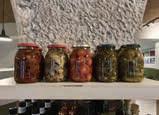
“Il nostro desiderio è quello di far vivere al vostro palato esperienze uniche, con i migliori prodotti da noi scoperti nelle loro realtà locali, lasciando ad ognuno di essi la propria storia ed origine che portano con sé”. Un vero e proprio credo.
Quante “ratatouille” albergano ancora nei vostri ricordi ? Provate a scoprirlo all’Osteria di Casa Pepe.

Ratatouille is a typical Provençal dish that we could compare to our peperonata, but since 2007 it is above all an animated film by Pixar: a worldwide success that tells the story of a little mouse who became chef in a starred French restaurant, capable with this dish, ratatouille, of conquering the most difficult of gastronomic critics from beyond the Alps. The secret and magic of his recipe sums up the meaning of the dish and the fable told in the film: the ability to arouse emotions with the simple genuineness of a dish that reminds us of the flavours of our childhood.And this is the mission of the new Osteria di Casa Pepe. In the era of revolutionary suggestions proposed by more or less starred chefs, there is the desire to present to the public the recipes of mothers, grandmothers and aunts, who perhaps disappeared too quickly in the hasty menus of everyday life. A project that in these first weeks of opening, in the renovated location at number 12 Via Nordio (just a stone’s throw from that Viale XX Settembre that is being revived as an alternative to the
city’s nightlife venues), seems to have hit the nail on the head, according to the feedback received from old and new customers.
Mediterranean cuisine with Trieste’s contamination for dishes where the taste of tradition and flavours... of the past emerge. Take, for example, the preserves, the basis on which to build inimitable sauces. Susanna, Pietro and Adi dedicate a special chapter in their Bible of taste to preserves. “Our desire is to make your palate live unique experiences, with the best products discovered by us in their local realities, leaving to each of them their own history and origin that they bring with them”. A true creed. How many “ratatouille” still live in your memories? Try to find out at the Osteria di Casa Pepe.
Il sabato a Trieste si colora di emozioni e di vantaggi! sabaTo 31 oTTobre TuTTI vesTITI dI nero/arancio
Vestitevi nel colore giusto per cogliere le speciali opportunità nei negozi e nei pubblici esercizi cittadini.
Accomodati in un minibus climatizzato e fatti accompagnare alla scoperta dei gioielli artistici di Trieste, tra piazze, chiese, musei e monumenti. Restando comodamente a bordo dei mezzi messi a disposizione dall’agenzia YesTour in collaborazione con Trieste Trasporti, potrai visitare la città ascoltando le informazioni fornite dall’audioguida disponibile in italiano, inglese, tedesco e spagnolo, compresa nel costo del biglietto. Il tour parte dal molo Audace e percorre Riva Tre Novembre, attraversa il centro storico, raggiunge il Colle di San Giusto e arriva fino al Castello e Parco di Miramare e, grazie al servizio Hop-On Hop-Off, potrai scendere alle fermate che preferisci e risalire quando vuoi utilizzando il biglietto valido 24 ore, acquistabile online.
Take a seat in an air-conditioned minibus and let us show you the artistic jewels of Trieste, among squares, churches, museums and monuments. Staying comfortably on board the vehicles provided by YesTour agency in collaboration with Trieste Trasporti, you can visit the city listening to the information provided by the audio guide available in Italian, English, German and Spanish, included in the price of the ticket. The tour departs from the pier Audace and travels along Riva Tre Novembre, through the historic centre, reaches the Colle di San Giusto and arrives at the Castle and Park of Miramare and, thanks to the Hop-On Hop-Off service, you can get off at the stops you prefer and get back on whenever you want using the 24-hour ticket, which can be purchased online.

Sono donne, rappresentano il territorio alle spalle di Trieste e hanno deciso di impegnarsi per far sì che alcune tradizioni non finiscano nel dimenticatoio. Katrin Štoka, Noris Vesnaver Colja e Martina Malalan hanno il pregio di unire i territori dove sono nate e cresciute e, grazie alle loro rispettive attività imprenditoriali, sintetizzano al meglio la volontà di piantare i semi di un futuro al femminile.
Fondata nel 2018, l’azienda agricola “Klin” ha al suo vertice una giovane donna di che due anni fa ha deciso di dirigere il suo sguardo in una direzione precisa. “Ho fatto un po’ di tutto –spiega– anche se di formazione sono architetto”. La vita in alcuni momenti modifica il sentiero che seguiamo e conduce ad esperienze –e relative soddisfazioni– del tutto diverse da come si erano immaginate in principio.
Basata sul giusto rapporto tra tradizione, storia e presente, l’azienda agricola produce molte qualità di vini, tra le quali il Prosekar, vino antico coltivato sulle terrazze a picco sul golfo di Trieste in località Contovello (Kontovel in sloveno). Il nome dell’attività deriva proprio dal toponimo Klinjevec, luogo dove si sviluppano il vigneto principale e la cantina. Trascinata in questa direzione dalle memorie famigliari –suo nonno Viktor, come scrive Katrin, “viveva per questo luogo”– la trentaquattrenne di origini carsoline è erede di uno spirito che il tempo ha cementato qui, tra il profumo delle viti e l’aria che dall’orizzonte adriatico arriva fino al Carso. “Su queste terrazze organizziamo cene, degustazioni e le wine experience che sono molto spesso sold out”. Il posto, in effetti, è clamorosamente incantevole e solo l’inutile scetticismo potrebbe registrare l’assenza di ammirazione nei confronti di questo balcone sul mondo.
Chi conosce bene Noris Vesnaver Colja la definisce “un’enorme lavoratrice”. Donna al comando dell’omonimo agriturismo di Samatorza ed erede dell’azienda fondata dal marito prematuramente scomparso nel 2016, Noris
Katrin Štoka, Noris Vesnaver Colja e Martina Malalan. Le donne del Carso sintetizzano la volontà di piantare i semi di un futuro al femminile.
Katrin Štoka, Noris Vesnaver Colja and Martina Malalan. The women of the Karst show the very
an all-female future.
fa parte dell’associazione Donne del vino del Friuli Venezia Giulia e possiede un background di tutto rispetto. “A metà degli anni Novanta –racconta– ho deciso di spostarmi da Santa Croce a Montalcino, in Toscana. Qui, grazie ad alcuni amici, sono entrata in contatto con l’azienda Marchesi Frescobaldi, iniziando quindi a lavorare per loro”.
Convinta del fatto che il vino vada interpretato come “arte e non sul concetto del vino come vino”, in Toscana la Vesnaver ha iniziato a formarsi nel settore seguendo le squadre tecniche dell’azienda californiana Mondavi che, all’epoca, lavorava in joint venture con la Frescobaldi. Rientrata a Trieste qualche anno dopo, Noris ha poi fatto esperienza lavorando come private sommelier, stringendo una collaborazione con un’agenzia statunitense. “Il mio sogno era quello di andare negli Stati Uniti –continua– anche perché cerco sempre di guardare ad orizzonti lontani”. Dalla morte del marito Jozko, la titolare dell’agriturismo porta con orgoglio la “bandiera al femminile” in un mondo, quello del vino, tradizionalmente maschile. Oggi come ieri, le donne del Carso dimostrano un carattere difficilmente replicabile e una forza d’animo inviadibile.
I campi dove coltiva le sue officinali sono situati a Banne e Trebiciano, in una zona tra l’altipiano e il ciglione carsico. In un’area dove la pratica agricola è stata del tutto abbandonata, Martina Malalan ha deciso di impiantare le proprie
coltivazioni in un ambiente pressoché incontaminato. “Ho iniziato nel 2010 –spiega– e ad oggi l’attività si sviluppa su circa 5.000 metri quadrati di campi”.
Martina è titolare dell’azienda Puress. oil e divide il suo tempo tra l’erboristeria di corso Italia a Trieste (dove vende i suoi prodotti) e il lavoro sul Carso. “La missione che mi sono data è quella di valorizzare e ripristinare i campi e gli orti che risultavano abbandonati da decenni. Faccio tutto da sola, dalla semina, al raccolto, fino al confezionamento”. Tra lavanda, melissa, calendula, rosmarino, camomilla, issopo, menta, finocchietto selvatico e l’immancabile santoreggia, la Malalan ha dato vita ad un vero e proprio spazio sospeso nel tempo, dove a darle una mano per quanto riguarda il lavoro della terra si alternano il padre ed il marito.
Prima di tuffarsi in questa impresa “tutta passione”, Martina ha studiato Tecniche erboristiche presso la Facoltà di Farmacia dell’ateneo giuliano e, grazie alla vincita del bando CreaImpresa, promosso dall’allora Provincia di Trieste, ha sfruttato l’occasione per iniziare da zero l’avventura che ancora oggi la vede protagonista. Secondo la giovane carsolina, le erbe aromatiche suscitano “grande interesse nelle persone. “Un po’ per la naturale predisposizione verso la tradizione culinaria locale e un po’ perché il pubblico più sensibile è in grado di captare la tua passione, mi sono resa conto che la gente ha iniziato ad apprezzare questo tipo di impegno molto di più di quanto lo faceva in passato”.
Con le sue erbe da campo, Martina ha infatti coronato il suo sogno. “L’idea mi frullava in testa da sempre –conclude– e riuscire a realizzare questo tipo di attività sopra delle terre un tempo desolate, mi fa pensare che in fondo si possa, ancora oggi, dare valore alla flora autoctona e al territorio. La terra in Carso è molto dura e l’agricoltura è ulteriormente difficile. Quando le piante poi sprigionano le loro essenze, allora capisci che il territorio dove viviamo è un posto veramente unico”. [NG]
personification of the will to plant the seeds of
They are women, they are the face of the lands stretching behind the city of Trieste, and they are committed to preserve local traditions. Katrin Štoka, Noris Vesnaver Colja, and Martina Malalan bring together three corners of the homeland where they were born and bred, and thanks to their respective businesses they are the very personification of the will to plant the seeds of an all-female future.
Founded 2018, Azienda Agricola Klin farm is managed by the firm determination of Katrin Štoka, a woman with a plan. “I studied architecture, yet I have tried many jobs in my life” she explains. Sometimes life takes unexpected turns and leads us to experiences –and success stories– that exceed our expectations.
Thanks to a balanced combination of tradition, experience, and innovation, Klin produces numerous wine varieties, such as Prosekar, an ancient grape variety cultivated on the steep terraces overlooking the Gulf of Trieste, in an area known as Contovello (Kontovel in Slovenian). The Azienda Agricola’s name, “Klin”, derives from Klinjevec, the name of the territory hosting Klin’s main vineyard and wine cellar. Tracing her family’s history all the way back to the Karst and this place, “a land [her grandfather Viktor] lived for”, 34-yearold Katrin is proud to have inherited her forebears’ spirit a spirit grown stronger on this very soil, permeated with the scent of vines and the air blowing from the Adriatic sea that climbs all the way to the Karst Plateau. “These terraces are our most popular venue: reservations for our dinner and wine-tasting experiences are often sold out shortly after they are announced”. After all, the beauty of this place is breathtaking only an incurable case of apathy would explain how anyone could remain indifferent to the charm of this natural terrace with a view of the world.
Katrin is proud to have inherited her forebears’ spirit, a spirit grown stronger on this very soil, permeated with the scent of vines and the air blowing from the Adriatic sea that climbs all the way to the Karst Plateau.
representative of women’s efforts in the traditionally male-governed wine world. Then and now the women of the Karst show unique character and enviable courage.
She cultivates her medicinal herbs in the fields of Banne and Trebiciano, between the plateau and the shoulder of the Karst. It is in this area, where agriculture is an abandoned practice, that Martina Malalan decided to plant her seeds and watch them grow in an uncontaminated environment. “I started back in 2010 and today my cultivations cover a surface of 5,000 square metres”.
Those who really know Noris Vesnaver Colja, define her as an “incredibly tireless worker”. At the helm of the agriturismo of the same name, Noris inherited the farm in Samatorza from her husband, after his untimely death in 2016. Noris is a member of the Association “Donne del vino del Friuli Venezia Giulia” [lit. Women of the wine of Friuli Venezia Giulia] and can boast a remarkable résumé: “In the mid-Nineties I moved to Santa Croce a Montalcino, in Tuscany. With the help of some friends of mine I was able to contact the Marchesi Frescobaldi company, and became part of their staff”.
Convinced that wine is “not just wine, but rather an art concept”, Noris started her training in the wine sector working with the technical teams of California-based company Mondavi, participating in a joint venture with Frescobaldi at the time. A few years later, back in Trieste, she started cooperating with a U.S. company as private sommelier. “I was dreaming of moving to the U.S. she confesses I always dream big.” After her husband Jozko’s passing, she became the sole owner of their agriturismo, as well the proud
Martina, owner of the Puress.oil company, divides her time between her fields and the herbalist shop she opened in Corso Italia, where she sells her own products. “My self-assigned mission is supporting and reviving the fields and vegetable gardens of this area after they have been sitting there, abandoned, for so many years. I work by myself and I personally take care of every aspect of my business, from the seed, to the crop, all the way to the final packaging”. Lavender, lemon balm, marigold, rosemary, chamomile, hyssop, mint, wild fennel, and, of course, savoury time has stopped in Martina’s gardens, where the only guests allowed are her father and her husband, when they come to help her work the land.
Before turning her dream into reality, Martina studied Herbal Medicine at the Department of Pharmacy of the University of Trieste. Shortly afterwards she won the Crealmimpresa grant promoted at the time by Trieste’s Provincerelated institutions which offered her the opportunity to start her enterprise from the ground up. Martina believes that medicinal herbs “spark people’s interest. It may be partly due to the local culinary tradition, and partly because the most sensitive customers can perceive my passion. Whatever the reason, I noticed how popular this line of business, and the commitment behind it, have become compared to the past.”
Her herbs and fields are a dream come true. “I have been nurturing this idea since I can remember. The best part of it all is that I was able to revive long-forgotten pieces of land it gives me hope, it shows that the value of local plants and their territory can be acknowledged once more. The Karst soil is hard and difficult to work. When the seeds sprout and invade the air with their essence, I realise how unique this place is”. [NG]
Katrin è erede di uno spirito che il tempo ha cementato qui, tra il profumo delle viti e l’aria che dall’orizzonte adriatico arriva fino al Carso.

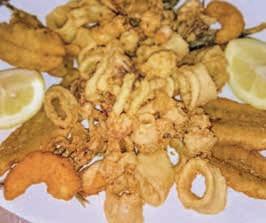
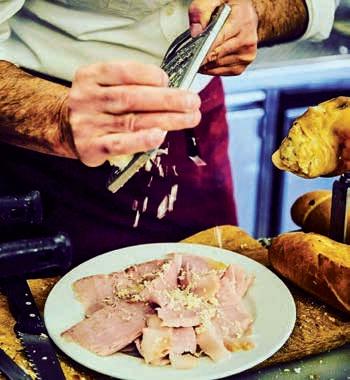

Vino: DNA o passione?
Wine: DNA or passion?
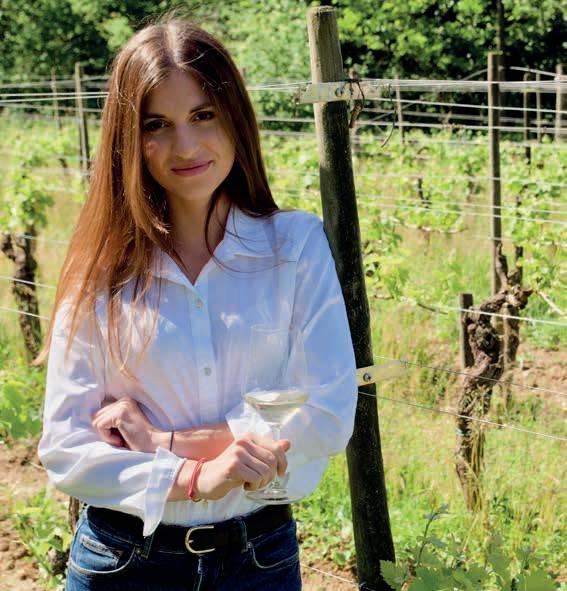
Non so se sia solamente una questione di DNA e credo sia riduttivo definirla semplicemente una “passione”. Di certo mi ha influenzato non poco crescere immersa in una natura dove il culto della terra e l’amore per le vigne hanno rappresentato negli anni una sorta di religione. Sta di fatto che mi è parso semplicemente naturale seguire la strada tracciata da mio nonno prima e da mio padre adesso. Un percorso legato al mondo del vino, alla sua cultura, che va ben oltre il semplice gesto di una vendemmia o di una vinificazione.
Ho citato mio nonno Marco e mio padre Roberto, ma in realtà mi trovo a rappresentare la sesta generazione di una famiglia di lungimiranti vitivinicoltori che nei secoli scorsi hanno iniziato a produrre vino agli estremi confini del nostro Paese: in questo lembo di terra che somiglia ad una mezza luna, stretta tra le Alpi Giulie ed il mare Adriatico. Terra di fascino, ma anche di storia (spesso dolorosa), crocevia di popoli e culture, dove boschi e prati paiono rincorrersi con i filari dei vigneti, disegnando morbide colline, capaci di regalare un ecosistema esclusivo per
equilibrio e biodiversità. Perché questo è il Collio, dove sono nata e cresciuta. Perché al fine credo sia stato proprio tutto questo a convincermi nel continuare la tradizione di famiglia. Perché del Collio è facile innamorarsi, quando ti accorgi che questa è la culla naturale per i vini bianchi, che nascono in un clima mediterraneo, da un terreno di epoca eonica. Clima e terra, semplicemente perfetti per vini che potete bere giovanissimi, così come dopo molti anni. Sì, avete letto bene: dopo molti anni, anche i bianchi!
Vi serve un esempio? Di recente ho assaggiato un Pinot Bianco del 1985 di incredibile mineralità e complessità. Caratteristiche non banali, che rendono questi vini unici.
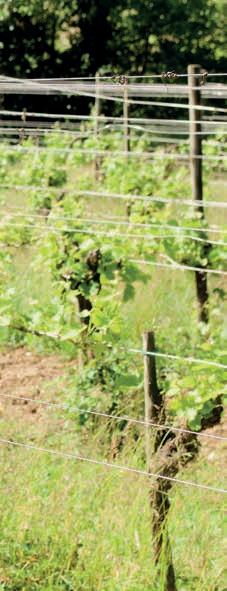
“Mi trovo a rappresentare la sesta generazione di una famiglia di lungimiranti vitivinicoltori.”
“I find myself representing the sixth generation of a family of far-sighted winemakers.”
Idon’t know if it is just a matter of DNA and I think it is reductive to call it simply a “passion”. It certainly influenced me a lot growing up immersed in a nature where the cult of the land and the love for the vineyards have represented a sort of religion over the years. It just seemed natural to me to follow the path my grandfather traced first and my father now. A path linked to the world of wine, to its culture, which goes far beyond the simple gesture of grape harvesting or winemaking.
I have mentioned my grandfather Marco and my father Roberto, but in
reality I find myself representing the sixth generation of a family of far-sighted winemakers who in past centuries have begun to produce wine at the far ends of our country: in this strip of land that resembles a half moon, squeezed between the Julian Alps and the Adriatic Sea. A land of charm, but also of history (often painful), a crossroads of peoples and cultures, where woods and meadows seem to chase each other with the rows of vineyards, drawing soft hills, able to give an exclusive ecosystem for balance and biodiversity. Because this is the Collio, where I was born and grew up. Because in the end I think it was all this that convinced me to continue the family tradition. Because it is easy to fall in love with Collio, when you realise that this is the natural cradle for white wines, which are born in a Mediterranean climate, from a soil of aeonian time. Climate and soil, simply perfect for wines that you can drink very young, as well as after many years. Yes, you have read it right: after many years, white wines too!
Do you need an example? I have recently tasted a 1985 Pinot Bianco of incredible minerality and complexity. Non-trivial characteristics that make these wines unique.
Venticinquenne, nata a Udine, Ilaria Felluga può essere considerata una “figlia d’arte” nel campo del vino: sesta generazione di una lunga dinastia che ha iniziato il suo cammino nella seconda metà del 1800 ad Isola d’Istria per poi approdare in Friuli Venezia Giulia, nel Collio. Futura enologa presso l’Università degli Studi di Udine, dove frequenta la facoltà di Viticoltura ed Enologia, nel frattempo è entrata nell’azienda di famiglia, la Marco Felluga a Gradisca d’Isonzo e Russiz Superiore a Capriva del Friuli. Segue la vendemmia, la vendita, il marketing e la comunicazione aziendale.
Twenty-five years old, born in Udine, Ilaria Felluga can be considered a “daughter of art” in the field of wine: the sixth generation of a long dynasty that began its journey in the second half of the 1800s in Isola d’Istria and then landed in Friuli Venezia Giulia, in the Collio area.
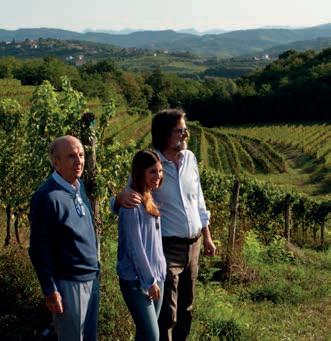
She is a future oenologist at the University of Udine, where she attends the faculty of Viticulture and Oenology. In the meantime she has joined the family business, Marco Felluga in Gradisca d’Isonzo and Russiz Superiore in Capriva del Friuli. She follows the grape harvest, sales, marketing and corporate communication.

Cerchi carni sceltissime, preparazioni prontocuoci e una gastronomia ricca di pietanze tradizionali triestine?
Macelleria Tamburini, la più scelta dai triestini, nel cuore della città.
Do you fancy a tartare or a steak?
Are you looking for carefully selected meats, dishes to cook and a gastronomy rich in traditional Trieste dishes?
Macelleria Tamburini, in the city center, is the most chosen in Trieste.
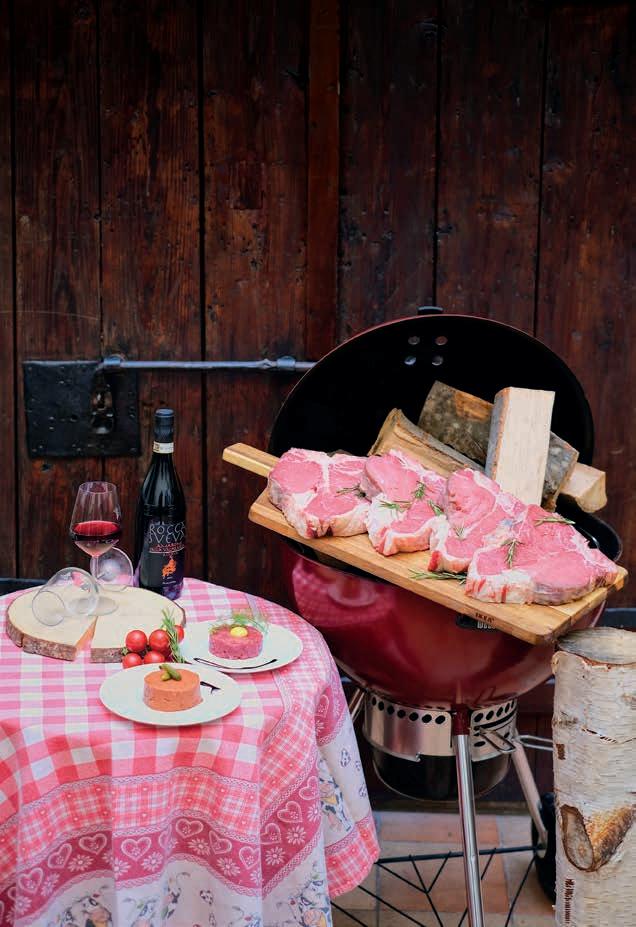
In Friuli Venezia Giulia abbiamo confezionato un fitto calendario di appuntamenti. Scoprirai città d‘arte, siti Unesco e piccoli borghi custodi di preziosi capolavori e antiche tradizioni che ti racconteremo con le guide regionali, mantenendo tutti gli accorgimenti necessari a garantire la sicurezza sanitaria. Ma per chi preferisce muoversi da solo e gestire il proprio tempo in autonomia ci sono gli itinerari raccontati dalle audio guide che si possono noleggiare in tutti gli infopoint PromoTurismoFVG.
Ti va di seguirci?
Ti aspetta Trieste, splendida e sospesa tra il Carso e il mare: ti svelerà un mosaico di incredibili storie intrecciate, i palazzi neoclassici, liberty ed eclettici affacciati sul mare, le atmosfere viennesi degli eleganti caffè e la magnifica piazza Unità d’Italia, porta spalancata sul blu e custode del passaggio tra il mondo italico, tedesco e slavo. Con la nostra guida scoprirai non solo scorci architettonici insoliti, ma anche la vera anima di questa città: la letteratura, la multi religiosità. Aquileia, Palmanova e Cividale del Friuli, tre siti Unesco che raccontano storie diverse. Ad Aquileia ti porteremo a fare due passi con gli antichi romani nel foro e lungo il porto fluviale di quella che fu la quarta città dell’Impero Romano. Poco distante un capolavoro di architettura veneziana che neppure Napoleone, dopo averla conquistata, osò toccare, limitandosi a cancellare tutti i leoni di San Marco in segno di spregio alla Serenissima Repubblica di Venezia: stiamo parlando di Palmanova, città-fortezza di cui ti racconteremo ogni passaggio segreto. Atmosfere longobarde a Cividale del Friuli, un autentico gioiello, custode di
un’eredità storica importantissima. Ti sveleremo tesori unici, come il raffinato Tempietto Longobardo e il suggestivo altare di Ratchis, e leggende antiche, come quella legata al curioso e imponente Ponte del Diavolo. Scoprirete da soli quali segreti e misteri si celano sotto i vostri piedi…
Pordenone è la città al centro di un territorio che è stata la culla del Rinascimento friulano e che ha dato i natali al suo pittore più illustre, Giovanni Antonio de’ Sacchis, detto per l’appunto “Il Pordenone”, un grande tra i grandi di cui scoprirete i magnifici affreschi lungo un percorso ricco di emozioni.
Città di librerie e osterie Udine svela la sua anima elegante e raffinata nel suo bel centro storico.
L’anima sfaccettata di Gorizia si lascia scoprire con visite guidate tematizzate: oltre alla classica visita guidata tra palazzi asburgici e vie del centro storico, è possibile ammirare le sue bellezze alla luce del tramonto, godendosi la vista dal castello, ma anche osservare da vicino le sue fontane, gli alberi e i giardini, o visitarla con gli occhi della storia.
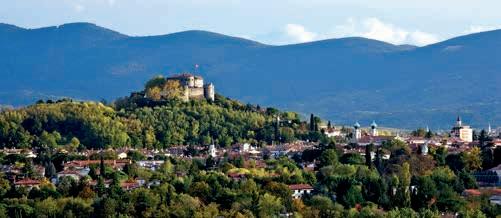
Infine borghi che sono un vero e proprio tesoro: San Daniele del Friuli e Pesariis. A San Daniele del Friuli ti porteremo all’interno della preziosa Guarneriana, tra le più antiche biblioteche pubbliche d’Italia.
A Pesariis seguiremo le tracce di un artigianato che ha scandito la storia della valle: l’antico mestiere dei gestori del tempo, abili orologiai che hanno reso famosi questi posti sin dal 1700.
Se ti abbiamo incuriosito con le nostre proposte ricordati che puoi partecipare a più di una esperienza gratuitamente con la FVGCard.
Our event calendar in Friuli Venezia Giulia is rich and diversified. Discover art cities, Unesco World Heritage Sites, small hamlets safeguarding treasured masterpieces and ancient traditions – our regional guides will lead you through this and more, with special attention devoted to the necessary health safety measures. If, on the other hand, you prefer to plan your own itinerary and manage your own time, our audio guides are available for rent at all PromoTurismoFVG Infopoints.
Would you like to come along?
Trieste is waiting for you, cradled between the Karst and the sea: she will disclose her intricate mosaic of incredible stories; her eclectic symphony of neoclassical architecture and liberty facades overlooking the sea; the Vienna-like atmospheres of her elegant cafés, and, of course, majestic Piazza Unità d’Italia – an open gate to the blue and gatekeeper of the crossroad between Italic, German, and Slavic worlds. Follow our lead, either to merely catch a glimpse of unusual architectural perspectives, or to discover the very soul of this city: her
literary and multi-religious landscape.
Then there are the three UNESCO sites of Aquileia, Palmanova, and Cividale del Friuli, each telling its own story. Delve into the atmosphere of Ancient Rome as you walk through Aquileia’s forum romanum and along the inland port of the fourth most important city of the Roman Empire. Nearby Palmanova is such a masterpiece of Venetian architecture, that Napoleon himself would not dare touch it – after conquering it, he merely erased all symbols of the Lion of Saint Mark in contempt of the Most Serene Republic of Venice; the fortress city still preserves all its secret passages, of which our guides hold the key.
Cividale del Friuli is an authentic gem of Langobard atmospheres and invaluable historic heritage. Follow our lead to discover its unique treasures, such as the elegant Tempietto Longobardo and the grand Altar of Ratchis; listen closely as we tell you its ancient legends, such as the curious tale of the imposing Bridge of the Devil. Countless secrets and mysteries are hiding under your feet ...
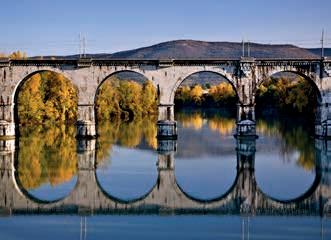
Pordenone used to be the centre of this region’s Renaissance – suffice it to mention one of his most celebrated sons, painter Giovanni Antonio de’ Sacchis, generally known as “The Pordenone”: a great master, whose splendid frescos can be admired along a dedicated itinerary.
City of bookshops and inns, Udine only discloses her most elegant and refined style to those who reach its beautiful city centre.
Gorizia’s multifaceted soul gradually reveals in a series of thematic guided tours: there is the classic itinerary through Hapsburg mansions and the old town; there is the sunset itinerary, offering a splendid view of the city from the castle; and then there are itineraries dedicated to the city’s fountains, trees, gardens, and, of course, history.
The region’s hamlets San Daniele del Friuli and Pesariis are full-fledged treasure chests: in San Daniele we will take you to visit the invaluable Biblioteca Guarneriana, one of the oldest public libraries in Italy.
In Pesariis our itinerary follows the traces of the valley’s most distinctive craft: the ancient art of clock-making, practiced in this territory since the 18th century.
Interested? If so, remember that your FVGCard gives you free access to many of our offers.
Città d’arte, siti Unesco e piccoli borghi custodi di preziosi capolavori e antiche tradizioni.
Art cities, Unesco Sites, small hamlets safeguarding treasured masterpieces and ancient traditions.Prenota la visita ! /Book your visit!!
nel cuore del Friuli
Venezia Giulia
Una passeggiata nello stile, nella moda e nel glamour italiano. Palmanova Village comprende 90 negozi dedicati ai marchi più contemporanei di abbigliamento, accessori, cosmetica e casa in uno spazio accogliente e rilassato dove fare shopping, passeggiare, bere un caffè o pranzare con gli amici e la famiglia. Tutto con la convenienza della “formula-outlet” che garantisce sconti fino al 70% rispetto ai negozi tradizionali.
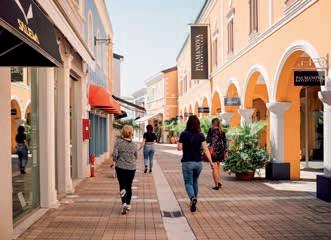
Il Village si trova in una posizione geografica unica nel cuore del Friuli Venezia Giulia, facilmente raggiungibile dalle vicine Austria e Slovenia, a pochi chilometri dal Collio, dalle spiagge, dalle città UNESCO Palmanova, Aquileia e Cividale del Friuli, dalle montagne delle Alpi e delle Dolomiti Friulane, dal Carso Triestino, dai luoghi della storia e della Grande Guerra. La Dolce Vita è il fil rouge che accomuna tutti i Village del gruppo Land of Fashion in questo delicato momento di ripartenza dopo l’emergenza Covid-19: il periodo d’oro degli anni ‘60 è protagonista dell’esperienza di shopping attraverso le vie e le piazzette del Village per celebrare quel glamour italiano che tutto il mondo ci invidia. Anche la sicurezza è garantita con speciali procedure igieniche di sanificazione nei negozi e negli spazi esterni, con dispositivi per il controllo dei flussi di accesso nel rispetto della distanza minima di sicurezza e con il controllo della temperatura corporea. Il Village, infatti, è luogo di relax e svago per tutti, bambini compresi: l’area giochi, progettata da architetti e designer specializzati, è realizzata con materiali eco friendly e
presenta molteplici riferimenti alla città stellata di Palmanova. Tutto è pensato per rendere l’esperienza piacevole, comoda e rilassante: ci sono spazi per la ricarica dei cellulari, noleggio passeggini, noleggio ombrelli e wi-fi gratuito in tutto il Centro. Nel parcheggio sono state installate le colonnine Enel e Tesla per la ricarica veloce “fast charge” delle auto elettriche. Numerose sono le partnership culturali e turistiche che il Palmanova Village ha attivato negli anni con gli attori socio-economici del territorio: il Centro, infatti, fornisce alla propria clientela puntuali informazioni turistiche e suggestioni di viaggio e nel proprio sito internet ha una sezione dedicata al territorio per presentare l’offerta turistica limitrofa all’outlet.
Info
Palmanova Village SP 126 Km 1.6 – 33041
Joannis di Aiello del Friuli (UD)
Tel: +39 0432 837810
Facebook: @palmanovavillage
Instagram: @palmanovavillage
www.palmanovavillage.it
In questa vallata dove la tradizione alpinistica ha radici ben profonde, è più probabile imparare prima a sciare piuttosto che a leggere e a scrivere.
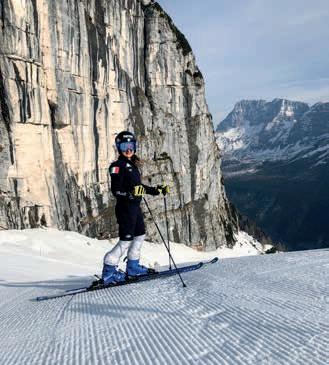
C’è perfino un liceo sportivo, il Bachmann, che consente agli studenti-atleti di allenarsi e non trascurare gli studi.
Lara Della Mea, una giovane atleta tarvisiana, sciatrice del circuito rosa della Coppa del Mondo di sci alpino, ha frequentato, però, il liceo scientifico allenandosi con suo padre.
È a Tarvisio, sulle “sue” piste che ha cominciato ad amare questo sport. Ed è sempre qui che si allena. “Sulla Di Prampero, sulla pista B, sul Florianca rivivo i ricordi di bambina. Sono degli ottimi tracciati che sanno sempre offrire grandi soddisfazioni ai praticanti di sci alpino, amatori o agonisti. Tra le piste a cui sono più affezionata c’è il Lussari, la mia pista del cuore dove mi sento sempre la stessa di sempre anche se capita, di tanto in tanto, che qualcuno mi riconosca e mi chieda una foto o un autografo. Confesso che mi fa piacere e sono felice di essere d’esempio per i più giovani continuando a trasmettere loro principi, valori e l’amore per questo sport e per la montagna.
Per Lara, Tarvisio è casa, il paese dove è cresciuta e dove ama ritornare sempre per stare in famiglia e in compagnia con gli amici di sempre. “Nonostante in questi anni abbia avuto modo di viaggiare e visitare molti altri posti e ammirare altre montagne, penso che al Tarvisiano non manchi nulla e che sia in estate che inverno non debba invidiare nulla rispetto a località più rinomate. Qui le vallate sono ampie, i panorami sono splendidi e le strutture ricettive sono accoglienti. Inoltre si possono praticare tanti sport: bike, trekking, equitazione, oltre, ovviamente, lo sci.”
Tra i luoghi da consigliare, Lara non ha dubbi. “Si deve salire sul monte Lussari e scoprire il piccolo borgo fatato. Non a caso una leggenda racconta
che un tempo un pastore scoprì in cima una statua della Madonna e, una volta portata a valle, la stessa trovava sempre un modo per ritornare in quota sul luogo dove era stata scoperta… È qui che torno sempre, d’inverno e d’estate. Nei negozietti del borgo ci lavorano molti amici e così, oltre a godermi la vista sulle vallate, colgo l’occasione di salutarli. Si può salire a piedi, lungo il sentiero del Pellegrino o tramite la cabinovia che parte da Camporosso.”
Un altro luogo da non perdere? I laghi superiore e inferiore di Fusine, “una vera oasi incontaminata!”
E poi ci sono i luoghi del cuore... “Quando sono a casa amo tornare a passeggiare con il mio cane su facili sentieri che percorrevo da bambina, come il “Sentiero degli gnomi”: un semplice tracciato di fondovalle dove, secondo un’altra leggenda, gli gnomi che abitano il monte Priesnig si rivelano ai bambini. Con le amiche, invece, vado a fare qualche escursione un po’ più impegnativa sui tanti rifugi di zona, come il Corsi alla base del Jof Fuart o il Pellarini ma amiamo anche sconfinare nella vicina Austria e Slovenia alla scoperta di un territorio senza confini.”
Tarvisio, una montagna chiamata casa.
Tarvisio, a mountain called home.
In this valley where the mountaineering tradition has deep roots, it is more likely to learn to ski first rather than to read and write. There is even a sports high school, the Bachmann, which enables student-athletes to train and not neglect their studies.



Lara Della Mea, a young athlete from Tarvisio, a skier on the pink circuit of the Alpine Ski World Cup, attended the scientific high school and trained with her father.

It was in Tarvisio, on “her” slopes, that she began to love this sport. And she is always here to train. “On the Di Prampero, on slope B, on the Florianca I relive the memories of my childhood. They are excellent tracks that always offer great satisfaction to downhill skiers,
amateurs or competitive skiers. Among the slopes I love the most there is the Lussari, my favourite slope where I always feel the same, even if sometimes it may happen that someone recognizes me and asks for a photo or an autograph. I confess that I am pleased and happy to set an example for the youngsters by continuing to pass on to them the principles, values and love for this sport and for the mountains.
For Lara, Tarvisio is home, the village where she grew up and where she always loves to come back to be with her family and friends. “Although in these years I have had the opportunity to travel and visit many other places and admire other mountains, I think that the Tarvisio area has everything to offer and that in both summer and winter it has nothing to envy from more renowned resorts. Here the valleys are wide, the views are splendid and the accommodation facilities are welcoming. Moreover you can practice many sports: biking, trekking, horse riding, as well as, of course, skiing”.
Among the places worth a visit, Lara has no doubts. “You have to climb Mount Lussari and discover the small fairytale hamlet. It is not by chance that a legend tells that once upon a time a shepherd discovered a statue of the Madonna on the top and, once brought down to the valley, she always found a way to return to the place where she had been discovered... This is where I always return, in winter and summer. Many friends work in the little shops of the village and so, besides enjoying the view of the valleys, I take the opportunity to say hello to them. You can go up on foot, along the Pilgrim’s Path or by the cableway that leaves from Camporosso”.

Another place not to be missed? The upper and lower lakes of Fusine, “a real unspoilt oasis!”
And then there are the places of the heart... “When I’m at home I love to take my dog for a walk along easy paths that I used to go on when I was a child, like the “Gnomes path”: a simple path at the bottom of the valley where, according to another legend, the gnomes that inhabit Mount Priesnig reveal themselves to children. With friends, on the other hand, I go for some more demanding excursions to the many mountain huts in the area, such as the Corsi at the base of Jof Fuart or the Pellarini, but we also love to cross over into nearby Austria and Slovenia to discover a territory without borders”.
Credo che al Tarvisiano non manchi nulla, sia in estate che in inverno.
I think that Tarvisiano area has everything to offer, in both summer and winter.












Una piccola fetta di paradiso a due passi dal confine tra Italia ed Austria. Alle porte di Villaco, Warmbad è un centro termale già decantato dagli antichi romani e nel corso dei secoli meta prediletta di famiglie reali. Al giorno d’oggi è ancora capace di regalare tutto quanto chiedi ad una vacanza all’insegna del relax, del benessere, della cura del corpo e della mente.
Per i clienti del Hotel Warmbaderhof tutto questo sarà un sogno a 5 stelle che si trasforma in realtà: bagni e bellezza, cura del corpo e piaceri culinari, nel contesto naturale di questo angolo di Carinzia, tra i più belli del land austriaco. Ed accanto a quanto regala la natura, ovvero l’acqua termale della zona, il team terapeutico dell’hotel ha pronto per il turista tutta una serie di trattamenti con cinque diversi moduli creati ad hoc per un programma capace di rigenerarti nel giro di pochi giorni.
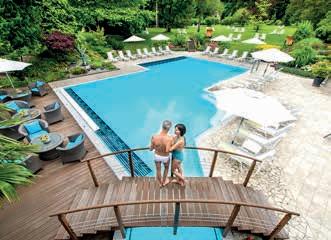
Qualche anticipazione? Nuotare sopra la sorgente termale con l’acqua che entra direttamente nella piscina dalle viscere della terra; un’acqua ricca di minerali, 29 gradi di temperatura, che cura e rivitalizza e che si rinnova completamente ogni tre ore. Per non parlare
dei trattamenti wellness e beauty, assicurati da una squadra di esperti fisioterapisti e massaggiatori.
A completare il quadro dell’hotel, le camere e le suite finemente arredate, i piaceri di una ristorazione pluripremiata con una pasticceria che non tradisce le tradizioni austriache, il tutto in una cornice naturale con meravigliosi sentieri da percorrere a piedi o in bicicletta, totalmente immersi in uno scenario a dir poco fiabesco.
Una vacanza all’insegna del relax, del benessere, della cura del corpo e della mente.
A holiday of relaxation and wellbeing, where you can treat your body and mind to the ultimate health experience
Alittle spot of heaven right on the border between Italy and Austria. The small town of Warmbad, just outside Villach, has been a popular thermal centre for over 2,000 years, since the ancient Romans discovered its natural thermal spring. Over the centuries, numerous royal families travelled to Warmbad to enjoy the healing powers of its waters. Today, Warmbad is still a favourite destination of visitors looking for a holiday of relaxation and wellbeing, where they can treat their body and their mind to the ultimate health experience.
The guests of Warmbaderhof Hotel will see their dreams turn into a 5-star reality: baths and beauty, body care and gourmet delights, surrounded by the natural wonders of one of the most splendid corners of Carinthia. Nature’s




Would you like a sneak peek? Just imagine swimming right above the thermal spring, the warm healing water bubbling directly into the pool’s gravel bed from the source of the spring a steady 29-degree temperature and a gentle flow of regenerating mineral water automatically renewed every three hours. Not to mention the vast array of wellness and beauty treatments provided by an expert team of professional physiotherapists and masseurs. Warmbaderhof hotel’s rooms and suites are tastefully decorated, while meals consist of authentic culinary works of art served in the hotel’s award-winning restaurants and traditional Austrian pastry shop. The hotel complex is completely surrounded by the splendid landscape of the local countryside and its network of fairytale-like hiking and biking trails.
gifts, first and foremost the local thermal water, are perfectly complemented by the hotel’s skilful therapeutic team, who have devised five sets of treatments, addressing the most diverse needs and able to regenerate each guest in just a few days.
L’hotel è immerso in una cornice naturale con meravigliosi sentieri immersi in uno scenario a dir poco fiabesco. —
The hotel complex is completely surrounded by the splendid landscape with its network of fairytale-like trials.
Inizia quasi sette anni fa l’attività del Comune di Trieste per fornire un’informazione diretta e aggiornata ai propri cittadini attraverso l’utilizzo dei social media con la convinzione che essere presenti, dove lo sono le persone, favorisca un riavvicinamento del cittadino con le Istituzioni, lo agevoli nel ricercare informazioni e nel poter effettuare domande e segnalazioni in maniera più smart, a qualsiasi ora e senza l’obbligo di recarsi a uno sportello.
I primi canali ad essere utilizzati dal Comune sono stati Facebook e Twitter ma poi si è sentita la necessità di aprirne di nuovi, con finalità specifiche e target di pubblico differente.
L’apertura del canale Instagram ha permesso di interfacciarsi con un pubblico più giovane. Con l’arrivo delle stories, si è riusciti a veicolare, oltre alle foto della città, anche informazioni su eventi, mostre, musei, biblioteche e informazioni di pubblica utilità.
Nel 2016 l’apertura del canale Telegram, piattaforma di instant messaging sulla quale si è deciso di far transitare solo informazioni di servizio che possano aiutare gli iscritti ad avere informazioni utili in tempo reale come, ad esempio, la chiusura di una via causa incidente, le allerte meteo, il blocco di una o più strade causato da un cantiere. Il valore aggiunto di questo canale è il coinvolgimento dell’ufficio Comunicazione di Trieste Trasporti che, a sua volta, pubblica in tempo reale le deviazioni delle linee degli autobus, piuttosto che la sospensione dei traghetti che partono da Trieste.
Almost seven years ago Comune di Trieste [i.e. the Municipality of Trieste] initiated a series of activities aimed at providing citizens with a direct and updated stream of information through social media. This effort was guided by the firm belief that Institutions need to be where their citizens are in order to really be there for them – providing adequate information platforms, effective and smart communication channels, and reducing the number of procedures that necessarily depend on office hours and physical help desks.
The Comune started by creating Facebook and Twitter profiles, but it soon realised that a more diversified range of channels was needed, in order
to address specific needs and targets. The Comune Instagram’s channel favoured the interaction between institutions and young people. The Story feature, in particular, offered the opportunity to enhance the flow of city pictures with captions and informative content concerning events, exhibits, museum, libraries, and public utility notices.
In 2016 the Comune entered Telegram: the instant messaging platform is used eclusively for municipal information services that provide users with real-time useful content concerning, for instance, city traffic news, road works, weather alerts, etc. The Comune’s Telegram channel is managed in cooperation with the communication office of local public transport service Trieste Trasporti, which, in turn, posts real-time updates on bus traffic diversions and/or suspended ferry departures from Trieste.
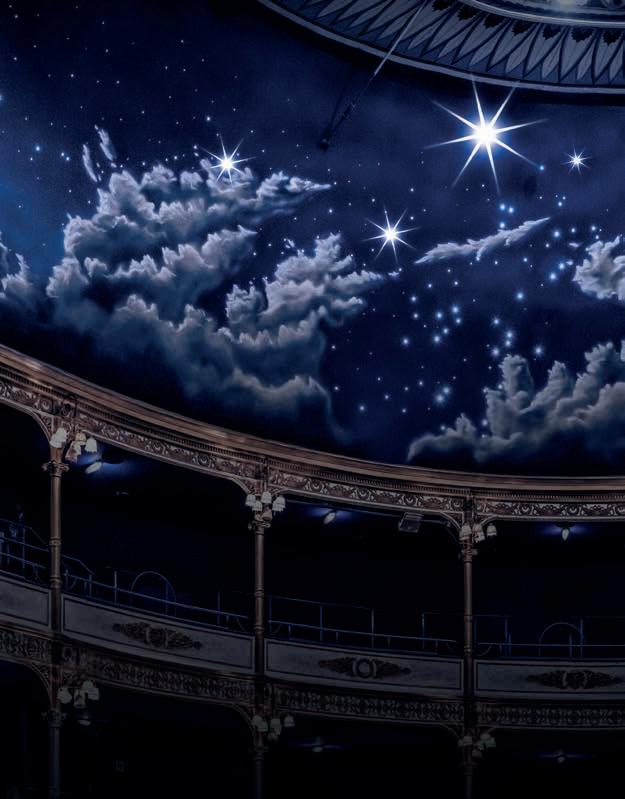
stagione 2020-2021
atto primo
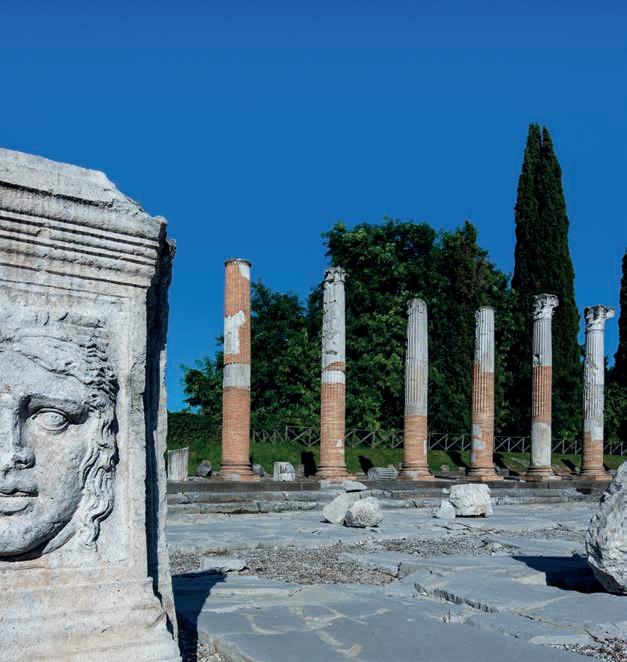
Friuli Venezia Giulia, a braccia aperte!
